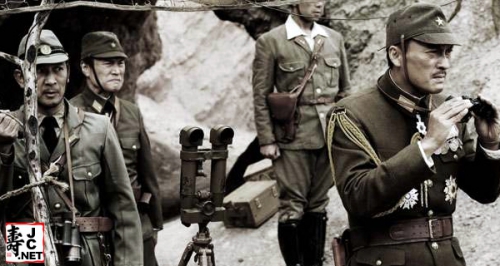dimanche, 08 mars 2015
“Djihadisation” de la crise ukrainienne

Il y a un pattern de la folie des psychologies occidentaliste-américaniste opérationnalisée par la médiocrité des esprits en une politique d’une bêtise proche de la perfection par son mécanisme répétitif et convulsif. Dans la crise ukrainienne, nous sommes au terme de ce pattern avec l’intrusion assez significative pour être appréciée comme structurelle des djihadistes islamistes, évidemment du côté de Kiev qui siphonne tous les déchets et ordures du désordre de la déstructuration-dissolution du bloc BAO.
• Commençons par le côté le plus léger de la bêtise arrogante et sûre d’elle des médias télévisés d’information US, – référence en la matière, – et CNN pour le cas, – référence des références, ajoutant la maladresse technique à l’inculture et à l’ignorance. L’incident indique symboliquement et selon une fatalité de l’inversion cette intrusion de l’islamisme dans la crise ukrainienne, au travers du penchant à la caricature extrême et fascinée pour le président Poutine. Cette historiette, rapporté par Sputnik.News le 27 février 2015 aurait pu figurer dans le bestiaire de la “haine-fascination” du bloc BAO pour Poutine, la maladresse de CNN largement inspirée par l’inculture pouvant être alors considérée comme un de ces “actes manqués” qu’affectionne la psychanalyse, transposé dans le domaine de la technique d’intendance de communication... Il s’agit de la substitution de l’illustration d’une nouvelle sur Jihadi Jonh (l’exécuteur de l’État islamique du journaliste James Foley, identifié comme Mohamed Emwazi, ayant vécu au Royaume-Uni et largement poussé vers l’extrémisme par le harassement sécuritaire des services idoines britanniques)...
«La CNN a affiché une image de Vladimir Poutine lors d'une information consacrée à l'identification du membre de l'EI ayant décapité le journaliste US James Foley. La chaîne de TV américaine CNN s'est excusée après avoir accompagné d'une image de Vladimir Poutine une information consacrée à l'identification du bourreau de l'Etat islamique. “En raison d'une défaillance du serveur vidéo, une photo de Vladimir Poutine préparée pour une autre info est apparue lors d'un bulletin d'informations. Nous présentons nos excuses pour cette erreur”, a indiqué la chaîne dans un communiqué. [...] En novembre 2014, la chaîne a[vait] “confondu” Barack Obama et Oussama ben Laden dans un sous-titre qui accompagnait une information sur les attaques ayant visé le soldat Robert O'Neill après qu'il eut affirmé avoir abattu le chef d'Al-Qaïda.»
• Tout cela pour nous conduire à la situation en Ukraine où il apparaît désormais assuré que les djihadistes islamistes, plus ou moins et plutôt beaucoup plus que moins connectés à l’État Islamiste (IE, ou ISIS/Daesh), se trouvent à l’œuvre en nombre respectable, parmi les diverses unités constituées mais absolument autonomes qui se battent du côté de Kiev contre les séparatistes de novorussia. On trouve donc un front néonazi-islamiste particulièrement significatif de l’esprit du temps, côté civilisation. C’est The Intercept, le site de Glenn Greenwald, qui donne une série de deux textes, extrêmement documentés, produits d’un reportage de Marcin Mamon sur place, en Ukraine (tous deux le 26 février 2015, sur le phénomène en général, et le 26 février 2015 sur l’aspect particulier de la mort du chef tchétchène Isa Munayev).
Il s’agit essentiellement de groupes de terroristes islamistes tchétchènes qui sont déjà sur place depuis un certain temps, venus sous l’impulsion du chef terroriste tchétchène Isa Munayev, abattu dans les combats ukrainiens Le 1er février. (1) Ces combattants sont directement liés à l’EI/ISIS/Daesh, témoignant de l’extension du nouveau phénomène terroriste né de la politique de déstructuration organisée selon une ligne aboutissant au nihilisme du désordre, principalement de la part des USA avec leurs alliés divers et exotiques (Israël, Qatar, Arabie), pour accoucher de ce que les dirigeants-Système désignent aujourd’hui comme la première menace contre la stabilité du bloc BAO selon un processus d’inversion complète désormais bien rôdé dans son automatisme échappant à tout contrôle organisé. Les lignes d’introduction du premier texte de Mamon ne laissent aucun doute sur cette parenté qui fait comprendre que l’Ukraine est effectivement entrée dans la zone d’action intensive du terrorisme islamiste, – bien entendu, du côté de Kiev.
«“Our brothers are there,” Khalid said when he heard I was going to Ukraine. “Buy a local SIM card when you get there, send me the number and then wait for someone to call you.” Khalid, who uses a pseudonym, leads the Islamic State’s underground branch in Istanbul. He came from Syria to help control the flood of volunteers arriving in Turkey from all over the world, wanting to join the global jihad. Now, he wanted to put me in touch with Rizvan, a “brother” fighting with Muslims in Ukraine.
»The “brothers” are members of ISIS and other underground Islamic organizations, men who have abandoned their own countries and cities. Often using pseudonyms and fake identities, they are working and fighting in the Middle East, Africa and the Caucasus, slipping across borders without visas. Some are fighting to create a new Caliphate — heaven on earth. Others — like Chechens, Kurds and Dagestanis — say they are fighting for freedom, independence and self-determination. They are on every continent, and in almost every country, and now they are in Ukraine, too.»

• Le 27 février 2015, toujours sur The Intercept, Glenn Greenwald donne la mesure de l’importance que le groupe de journalistes du site accorde à ce témoignage sur le déploiement des terroristes de l’IE en Ukraine. Greenwald commence par rendre compte du témoignage au Congrès d’un de ses vieux “ennemis intimes”, le directeur du renseignement national James Clapper affirmant la nécessité de l’envoi d’armes aux forces de Kiev ; cela, en posant la question désormais sempiternelle, notamment à la lumière de l’expérience syrienne et catastrophique : “Qui, exactement, allons-nous armer ?” Greenwald rappelle effectivement l’expérience syrienne, avec les flots d’armes destinées aux rebelles syriens anti-Assad, dits-modérés et convenables, et terminant dans les mains des extrémistes et des forces de l’EI. Il développe ensuite la description de la profusion de combattants néonazis et d’extrême-droite en Ukraine, à qui nombre de ces armes parviendront, et étend évidemment cette logique à la composante structurelle fondamentale nouvelle des terroristes islamistes, largement documentée par les textes de Mamon.
«A similar dynamic [as the one in Syria] is at play in Russia and Ukraine. Yesterday, Obama’s top national security official, Director of National Intelligence James Clapper, told a Senate Committee “that he supports arming Ukrainian forces against Russian-backed separatists,” as the Washington Post put it. The U.S. has already provided “non-lethal” aid to Ukrainian forces, and Obama has said he is now considering arming them. Who, exactly, would that empower?
«Russian President Vladimir Putin has long said that the Ukrainian coup of last year, and the subsequent regime in Kiev, is driven by ultra-nationalists, fascists, and even neo-Nazi factions. The Russian TV outlet RT also frequently refers to “the active role far-right groups have played on the pro-government side in Ukraine since the violent coup of the last year.” For that reason, anyone pointing out that arming the regime in Kiev would strengthen fascists and neo-Nazis is instantly accused of being a Putin propagandist: exactly like those arguing that the best anti-Assad fighters were al-Qaeda-affiliated were accused of being Assad propagandists (until that became the official position of the US Government). U.S. media accounts invariably depict the conflict in Ukraine as a noble struggle waged by the freedom-loving, pro-west democrats in Kiev against the oppressive, aggressive “Russian-backed” separatists in the east. But just as was true in Syria: while some involved in the Ukrainian coup were ordinary Ukrainians fighting against a corrupt and oppressive regime, these claims about the fascist thugs leading the fight for the Kiev government are actually true...»
Suit un long exposé rassemblant nombre de témoignages, de preuves évidentes, d’évidences aveuglantes, etc., sur l’importance et le rôle majeur que jouent ces forces néonazies quasiment incontrôlées, sinon par des oligarques eux-mêmes incontrôlés et dont l’autorité sur ces groupes ressemble d’ailleurs, plutôt, à une complicité où le financier (l’oligarque) n’a de poids que dans la mesure où il reste le financier, et se révèle finalement, dans le rapport de forces, aussi bien prisonnier de ces groupes que pseudo-inspirateur. Ayant terminé cet exposé largement documenté, Greenwald introduit le constat sur la présence des djihadistes, renvoyant aux articles de Mamon («The Intercept yesterday published reporting from Marcin Mamon on the role jihadists are playing in the conflict on behalf of the government»), pour finalement poser la question mille fois recommencée désormais dans toutes les aventures pathologiques du bloc BAO/des USA : «Now that Obama’s leading national security official is expressly calling for the arming of those forces, it is vital that the true nature of America’s allies in this conflict be understood.»
Il y a deux facteurs à considérer dans ces diverses interventions. D’abord, l’irruption de The Intercept, avec la caution appuyée de Glenn Greenwald et de son immense notoriété, dans la crise ukrainienne. Après un effacement de quelques mois, nous saluions le 16 janvier 2015 le “retour” de Greenwald dans un sujet de grande audience, – la crise-“Charlie” en France. A côté de cela, Greenwald/The Intercept s’étaient montrés assez modestes par rapport à la crise ukrainienne. Cela tenait notamment, à notre sens, à une position générale qui affecte plus ou moins les antiSystème de gauche sensibles à l’humanitarisme et aux “valeurs” qui vont avec, donc malgré tout sensible aux argumentaires du Système qui relève de l’affectivisme (ex-“affectivité”), redoutablement efficace. Cela tient à cette simple équivalence : s’engager comme il est naturel pour un antiSystème contre le cirque de Kiev, c’est objectivement se placer du côté de Poutine, et beaucoup dans la gauche antiSystème sont sensibles à l’image de diabolisation qui a été construite autour du président russe.
On a avait déjà ressenti cela, d’une façon évidemment beaucoup plus atténuée, lors de l’affaire Snowden où le groupe Greenwald avait joué un rôle majeur. Snowden ayant obtenu le droit d’asile en Russie, son soutien intensif impliquait là aussi qu’on se rangeât peu ou prou du côté de Poutine. De ce point de vue il y eut donc une certaine gêne, celle qu’on a décrite, mais qui n’interféra guère pour ce cas à cause du soutien massif apporté à Snowden qui primait sur tout le reste. Dans la crise ukrainienne, l’implication (du groupe Greenwald) était moins évidente et il y eut jusqu’à l’évolution actuelle une retenue beaucoup plus marquée que dans le cas précédent. Mais avec la documentation de l’intrusion du facteur islamiste/EI où le groupe Greenwald joue un rôle important, cette retenue s’atténue et il y a de fortes chances qu’elle continuera à s’atténuer considérablement, à la mesure de l’importance de l’engagement des islamistes qui ira en grandissant.
C’est un point important dans la mesure où le groupe Greenwald dispose toujours d’un très grand crédit et d’une influence à mesure, notamment dans l’intelligentsia occidentale. On avait déjà proposé cette interprétation lors du “retour” du groupe après les avatars de son incorporation dans le système FirstLook.org de Pierre Omidyar. C’était également pour la crise-“Charlie”, le 16 janvier 2015, et nous proposions ceci pour ce qui concerne la probable influence de cette évolution : «Plus encore, l’intervention de Greenwald donne également une caution internationale au constat encore plus important que la crise-Charlie déchire directement une classe occupant une place fondamentale dans la bataille, – la classe réunissant le monde intellectuel, le complexe médiatique avec presse-Système et réseaux antiSystème, le showbiz et ses diverses ramifications.» Cette fois, l’intervention dans la crise ukrainienne du groupe Greenwald interfère directement dans les positions de la classe intellectuelle américaniste-occidentaliste, dans ces positions qui sont absolument exacerbées jusqu’au paroxysme à cause du déterminisme narrativiste. C’est nécessairement, par le jeu des engagements et des oppositions, la dénonciation absolument hystérique à la position russe qui est indirectement attaquée, et Greenwald lui-même se trouvant dans ce cas nettement plus impliqué que dans les circonstances précédentes qui ont été rappelées du côté de Poutine.
Il faut dire que l’enjeu est de taille, – et c’est évidemment en venir au second point de ce commentaire. Certes, ce n’est pas la première fois qu’on signale, d’une façon plus ou moins documentée un certain engagement islamiste (tchétchène), ou des rumeurs d’engagement islamiste du côté de Kiev, dans la crise ukrainienne. Mais cette fois, l’engagement est minutieusement documenté ; il est clairement et directement connecté à l’État Islamiste/ISIS/Daesh et il est largement et minutieusement placé dans la logique opérationnelle de la catastrophe syrienne où l’action initiale a accouché du monstre EI que toutes les directions politiques du bloc BAO désignent et dénoncent désormais comme la principale menace.
Si cette nouvelle situation se confirme et si l’intrusion islamique est de plus en plus documentée comme c’est probable maintenant qu’elle est débusquée et mise en évidence du côté de la communication, c’est un facteur nouveau de très grande importance dans la problématique de la crise ukrainienne qui implique une quasi-intégration en devenir avec la crise du Moyen-Orient, renforçant encore l’aspect du cœur brûlant de la Grande Crise qu’est l’Ukraine. L’on comprend que ce facteur nouveau va contribuer à brouiller les cartes, à entraver d’une façon peut-être décisive l’effort constant du Système pour continuer à définir cette crise en termes manichéens (noir-blanc, méchants-gentils, etc.). Pour les pays européens, déjà confrontés dans un état d’esprit d’hyper-réaction sécuritaire et d’extrême activisme de communication à ce qui est perçu comme la conséquence (terrorisme) du développement de l’EI au Moyen-Orient, l’intrusion de ce facteur dans la crise ukrainienne représente un nouveau motif d’alarme d’une puissance considérable. Bien entendu, cette situation porte une contradiction encore plus insupportable que celle qui est apparue en Syrie, – à cause de la proximité géographique et des conditions déjà suspectes de nombre d’éléments du régime de Kiev : le soutien apporté à l’UE à un régime qui emploie des forces qui menacent directement, dans l’esprit des dirigeants européens, la sécurité et l’équilibre des pays dont ils ont la charge. La même contradiction, avec en plus l’aspect de la grogne transatlantique actuelle, marque la possible initiative de livraison d’armes US à l’Ukraine, dont une certaine partie parviendrait aux djihadistes d’Ukraine.
Note
(1) Mise à jour le 3 mars 2015. Dans le texte original, nous avions erronément mentionné la mort au combat de Munayev à “l'automne dernier”. En fait, l'affaire est beaucoup plus récente et participe directement de cette question de la présence djiadiste dans les combats en Ukraine : Munayev a été tué le 1er février, lors de la bataille de Debaltsevo.
00:10 Publié dans Actualité, Affaires européennes, Géopolitique | Lien permanent | Commentaires (0) | Tags : politique internationale, géopolitique, caucase, ukraine, tchétchène, europe, affaires européennes |  |
|  del.icio.us |
del.icio.us |  |
|  Digg |
Digg | ![]() Facebook
Facebook
L'AFRIQUE EN PERDITION... de l'Afrique du Nord au Sahel

Bernard Lugan*
Ex: http://metamag.fr
00:05 Publié dans Actualité, Géopolitique | Lien permanent | Commentaires (0) | Tags : actualité, politique internationale, bernard lugan, géopolitique, afrique, affaires africaines |  |
|  del.icio.us |
del.icio.us |  |
|  Digg |
Digg | ![]() Facebook
Facebook
The Neoconservative Threat to International Order

The Neoconservative Threat to International Order
Last week I was invited to address an important conference of the Russian Academy of Sciences in Moscow. Scholars from Russia and from around the world, Russian government officials, and the Russian people seek an answer as to why Washington destroyed during the past year the friendly relations between America and Russia that President Reagan and President Gorbachev succeeded in establishing. All of Russia is distressed that Washington alone has destroyed the trust between the two major nuclear powers that had been created during the Reagan-Gorbachev era, trust that had removed the threat of nuclear armageddon. Russians at every level are astonished at the virulent propaganda and lies constantly issuing from Washington and the Western media. Washington’s gratuitous demonization of the Russian president, Vladimir Putin, has rallied the Russian people behind him. Putin has the highest approval rating ever achieved by any leader in my lifetime.
Washington’s reckless and irresponsible destruction of the trust achieved by Reagan and Gorbachev has resurrected the possibility of nuclear war from the grave in which Reagan and Gorbachev buried it. Again, as during the Cold War the specter of nuclear armageddon stalks the earth.
Why did Washington revive the threat of world annihilation? Why is this threat to all of humanity supported by the majority of the US Congress, by the entirety of the presstitute media, and by academics and think-tank inhabitants in the US, such as Motyl and Weiss, about whom I wrote recently?
It was my task to answer this question for the conference. You can read my February 25 and February 26 addresses below. But first you should understand what nuclear war means. You can gain that understanding here.
The Threat Posed to International Relations By The Neoconservative Ideology of American Hegemony,
Address to the 70th Anniversary of the Yalta Conference, Hosted by Institutes of the Russian Academy of Sciences and Moscow State Institute of International Relations, Moscow, February 25, 2015, Hon. Paul Craig Roberts
Colleagues,
What I propose to you is that the current difficulties in the international order are unrelated to Yalta and its consequences, but have their origin in the rise of the neoconservative ideology in the post-Soviet era and its influence on Washington’s foreign policy.
The collapse of the Soviet Union removed the only constraint on Washington’s power to act unilaterally abroad. At that time China’s rise was estimated to require a half century. Suddenly the United States found itself to be the Uni-power, the “world’s only superpower.” Neoconservatives proclaimed “the end of history.”
By the “end of history” neoconservatives mean that the competition between socio-economic-political systems is at an end. History has chosen “American Democratic-Capitalism.” It is Washington’s responsibility to exercise the hegemony over the world given to Washington by History and to bring the world in line with History’s choice of American democratic-capitalism.
In other words, Marx has been proven wrong. The future does not belong to the proletariat but to Washington.
The neoconservative ideology raises the United States to the unique status of being “the exceptional country,” and the American people acquire exalted status as “the indispensable people.”
If a country is “the exceptional country,” it means that all other countries are unexceptional. If a people are “indispensable,” it means other peoples are dispensable. We have seen this attitude at work in Washington’s 14 years of wars of aggression in the Middle East. These wars have left countries destroyed and millions of people dead, maimed, and displaced. Yet Washington continues to speak of its commitment to protect smaller countries from the aggression of larger countries. The explanation for this hypocrisy is that Washington does not regard Washington’s aggression as aggression, but as History’s purpose.
We have also seen this attitude at work in Washington’s disdain for Russia’s national interests and in Washington’s propagandistic response to Russian diplomacy.
The neoconservative ideology requires that Washington maintain its Uni-power status, because this status is necessary for Washington’s hegemony and History’s purpose.
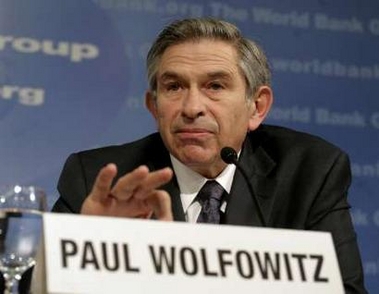 The neoconservative doctrine of US world supremacy is most clearly and concisely stated by Paul Wolfowitz, a leading neoconservative who has held many high positions: Deputy Assistant Secretary of Defense, Director of Policy Planning US Department of State, Assistant Secretary of State, Ambassador to Indonesia, Undersecretary of Defense for Policy, Deputy Secretary of Defense, President of the World Bank.
The neoconservative doctrine of US world supremacy is most clearly and concisely stated by Paul Wolfowitz, a leading neoconservative who has held many high positions: Deputy Assistant Secretary of Defense, Director of Policy Planning US Department of State, Assistant Secretary of State, Ambassador to Indonesia, Undersecretary of Defense for Policy, Deputy Secretary of Defense, President of the World Bank.
In 1992 Paul Wolfowitz stated the neoconservative doctrine of American world supremacy:
“Our first objective is to prevent the re-emergence of a new rival, either on the territory of the former Soviet Union or elsewhere, that poses a threat on the order of that posed formerly by the Soviet Union. This is a dominant consideration underlying the new regional defense strategy and requires that we endeavor to prevent any hostile power from dominating a region whose resources would, under consolidated control, be sufficient to generate global power.”
For clarification, a “hostile power” is a country with an independent policy (Russia, China, Iran, and formerly Saddam Hussein, Gaddafi, Assad).
This bold statement struck the traditional American foreign policy establishment as a declaration of American Imperialism. The document was rewritten in order to soften and disguise the blatant assertion of supremacy without changing the intent. These documents are available online, and you can examine them at your convenience.
Softening the language allowed the neoconservatives to rise to foreign policy dominance. The neoconservatives are responsible for the Clinton regime’s attacks on Yugoslavia and Serbia. Neoconservatives, especially Paul Wolfowitz, are responsible for the George W. Bush regime’s invasion of Iraq. The neoconservatives are responsible for the overthrow and murder of Gaddafi in Libya, the assault on Syria, the propaganda against Iran, the drone attacks on Pakistan and Yemen, the color revolutions in former Soviet Republics, the attempted “Green Revolution” in Iran, the coup in Ukraine, and the demonization of Vladimir Putin.
A number of thoughtful Americans suspect that the neoconservatives are responsible for 9/11, as that event gave the neoconservatives the “New Pearl Harbor” that their position papers said was necessary in order to launch their wars for hegemony in the Middle East. 9/11 led directly and instantly to the invasion of Afghanistan, where Washington has been fighting since 2001. Neoconservatives controlled all the important government positions necessary for a “false flag” attack.
Neoconservative Assistant Secretary of State Victoria Nuland, who is married to another neoconservative, Robert Kagan, implemented and oversaw Washington’s coup in Ukraine and chose the new government.
The neoconservatives are highly organized and networked, well-financed, supported by the print and TV media, and backed by the US military/security complex and the Israel Lobby. There is no countervailing power to their influence on US foreign power.
The neoconservative doctrine goes beyond the Brzezinski doctrine, which dissented from Detente and provocatively supported dissidents inside the Soviet empire. Despite its provocative character, the Brzezinski doctrine remained a doctrine of Great Power politics and containment. It is not a doctrine of US world hegemony.
While the neoconservatives were preoccupied for a decade with their wars in the Middle East, creating a US Africa Command, organizing color revolutions, exiting disarmament treaties, surrounding Russia with military bases, and “pivoting to Asia” to surround China with new air and naval bases, Vladimir Putin led Russia back to economic and military competence and successfully asserted an independent Russian foreign policy.
When Russian diplomacy blocked Washington’s planned invasion of Syria and Washington’s planned bombing of Iran, the neoconservatives realized that they had failed the “first objective” of the Wolfowitz Doctrine and had allowed “the re-emergence of a new rival . . . on the territory of the former Soviet Union” with the power to block unilateral action by Washington.
The attack on Russia began. Washington had spent $5 billion over a decade creating non-governmental organizations (NGOs) in Ukraine and cultivating Ukrainian politicians. The NGOs were called into the streets. The extreme nationalists or nazi elements were used to introduce violence, and the elected democratic government was overthrown. The intercepted conversation between Victoria Nuland and the US ambassador in Kiev, in which the two Washington operatives choose the members of the new Ukrainian government, is well known.
If the information that has recently come to me from Armenia and Kyrgyzstan is correct, Washington has financed NGOs and is cultivating politicians in Armenia and the former Soviet Central Asian Republics. If the information is correct, Russia can expect more “color revolutions” or coups in other former territories of the Soviet Union. Perhaps China faces a similar threat in Uyghurstan.
The conflict in Ukraine is often called a “civil war.” This is incorrect. A civil war is when two sides fight for the control of the government. The break-away republics in eastern and southern Ukraine are fighting a war of secession.
Washington would have been happy to use its coup in Ukraine to evict Russia from its Black Sea naval base as this would have been a strategic military achievement. However, Washington is pleased that the “Ukraine crisis” that Washington orchestrated has resulted in the demonization of Vladimir Putin, thus permitting economic sanctions that have disrupted Russia’s economic and political relations with Europe. The sanctions have kept Europe in Washington’s orbit.
Washington has no interest in resolving the Ukrainian situation. The situation can be resolved diplomatically only if Europe can achieve sufficient sovereignty over its foreign policy to act in Europe’s interest instead of Washington’s interest.
The neoconservative doctrine of US world hegemony is a threat to the sovereignty of every country. The doctrine requires subservience to Washington’s leadership and to Washington’s purposes. Independent governments are targeted for destabilization. The Obama regime overthrew the reformist government in Honduras and currently is at work destabilizing Venezuela, Bolivia, Ecuador, and Argentina, and most likely also Armenia and the former Central Asian Soviet Republics.
Yalta and its consequences have to do with Great Power rivalries. But in the neoconservative doctrine, there is only one Great Power–the Uni-power. There are no others, and no others are to be permitted.
Therefore, unless a moderate foreign policy arises in Washington and displaces the neoconservatives, the future is one of conflict.
It would be a strategic error to dismiss the neoconservative ideology as unrealistic. The doctrine is unrealistic, but it is also the guiding force of US foreign policy and is capable of producing a world war.
In their conflict with Washington’s hegemony, Russia and China are disadvantaged. The success of American propaganda during the Cold War, the large differences between living standards in the US and those in communist lands, overt communist political oppression, at times brutal, and the Soviet collapse created in the minds of many people nonexistent virtues for the United States. As English is the world language and the Western media is cooperative, Washington is able to control explanations regardless of the facts. The ability of Washington to be the aggressor and to blame the victim encourages Washington’s march to more aggression.
This concludes my remarks. Tomorrow I will address whether there are domestic political restraints or economic restraints on the neoconservative ideology.

Paul Craig Roberts, Address to the 70th Anniversary of the Yalta Conference, Moscow, February 26, 2015
Colleagues,
At the plenary session yesterday I addressed the threat that the neoconservative ideology poses to international relations. In this closing session I address whether there are any internal restraints on this policy from the US population and whether there are economic restraints.
Just as 9/11 served to launch Washington’s wars for hegemony in the Middle East, 9/11 served to create the American police state. The Constitution and the civil liberties it protects quickly fell to the accumulation of power in the executive branch that a state of war permitted.
New laws, some clearly pre-prepared such as the PATRIOT Act, executive orders, presidential directives, and Department of Justice memos created an executive authority unaccountable to the US Constitution and to domestic and international law.
Suddenly Americans could be detained indefinitely without cause presented to a court. Habeas corpus, a constitutional protection which prohibits any such detention, has been set aside.
Suddenly people could be tortured into confessions in violation of the right against self-incrimination and in violation of domestic and international laws against torture.
Suddenly Americans and Washington’s closest allies could be spied on indiscriminately without the need of warrants demonstrating cause.
The Obama regime added to the Bush regime’s transgressions the assertion of the right of the executive branch to assassinate US citizens without due process of law.
The police state was organized under a massive new Department of Homeland Security. Almost immediately whistleblower protections, freedom of the press and speech, and protest rights were attacked and reduced.
It was not long before the director of Homeland Security declared that the department’s focus has shifted from Muslim terrorists to “domestic extremists,” an undefined category. Anyone can be swept into this category. Homes of war protesters were raided and grand juries were convened to investigate the protesters. Americans of Arab descent who donated to charities–even charities on the State Department’s approved list–that aided Palestinian children were arrested and sentenced to prison for “providing material support to terrorism.”
All of this and more, including police brutality, has had a chilling effect on protests against the wars and the loss of civil liberty. The rising protests from the American population and from soldiers themselves that eventually forced Washington to end the Vietnam War have been prevented in the 21st century by the erosion of rights, intimidation, loss of mobility (no-fly list), job dismissal, and other heavy-handed actions inconsistent with a government accountable to law and the people.
In an important sense, the US has emerged from the “war on terror” as an executive branch dictatorship unconstrained by the media and barely, if at all, constrained by Congress and the federal courts. The lawlessness of the executive branch has spread into governments of Washington’s vassal states and into the Federal Reserve, the International Monetary Fund, and the European Central Bank, all of which violate their charters and operate outside their legal powers.
Jobs offshoring destroyed the American industrial and manufacturing unions. Their demise and the current attack on the public employee unions has left the Democratic Party financially dependent on the same organized private interest groups as the Republicans. Both parties now report to the same interest groups. Wall Street, the military/security complex, the Israel Lobby, agribusiness, and the extractive industries (oil, mining, timber) control the government regardless of the party in power. These powerful interests all have a stake in American hegemony.
The message is that the constellation of forces preclude internal political change.
Hegemony’s Achilles heel is the US economy. The fairy tale of American economic recovery supports America’s image as the safe haven, an image that keeps the dollar’s value up, the stock market up, and interest rates down. However, there is no economic information that supports this fairy tale.
Real median household income has not grown for years and is below the levels of the early 1970s. There has been no growth in real retail sales for six years. The labor force is shrinking. The labor force participation rate has declined since 2007 as has the civilian employment to population ratio. The 5.7 percent reported unemployment rate is achieved by not counting discouraged workers as part of the work force. (A discouraged worker is a person who is unable to find a job and has given up looking.)
A second official unemployment rate, which counts short-term (less than one year) discouraged workers and is seldom reported, stands at 11.2 percent. The US government stopped including long-term discouraged workers (discouraged for more than one year) in 1994. If the long-term discouraged are counted, the current unemployment rate in the US stands at 23.2 percent.
The offshoring of American manufacturing and professional service jobs such as software engineering and Information Technology has decimated the middle class. The middle class has not found jobs with incomes comparable to those moved abroad. The labor cost savings from offshoring the jobs to Asia has boosted corporate profits, the performance bonuses of executives and capital gains of shareholders. Thus all income and wealth gains are concentrated in a few hands at the top of the income distribution. The number of billionaires grows as destitution reaches from the lower economic class into the middle class. American university graduates unable to find jobs return to their childhood rooms in their parents’ homes and work as waitresses and bartenders in part-time jobs that will not support an independent existence.
With a large percentage of the young economically unable to form households, residential construction, home furnishings, and home appliances suffer economic weakness. Cars can still be sold only because the purchaser can obtain 100 percent financing in a six-year loan. The lenders sell the loans, which are securitized and sold to gullible investors, just as were the mortgage-backed financial instruments that precipitated the 2007 US financial crash.
None of the problems that created the 2008 recession, and that were created by the 2008 recession, have been addressed. Instead, policymakers have used an expansion of debt and money to paper over the problems. Money and debt have grown much more than US GDP, which raises questions about the value of the US dollar and the credit worthiness of the US government. On July 8, 2014, my colleagues and I pointed out that when correctly measured, US national debt stands at 185 percent of GDP.
This raises the question: Why was the credit rating of Russia, a country with an extremely low ratio of debt to GDP, downgraded and not that of the US? The answer is that the downgrading of Russian credit worthiness was a political act directed against Russia in behalf of US hegemony.
How long can fairy tales and political acts keep the US house of cards standing? A rigged stock market. A rigged interest rate. A rigged dollar exchange value, a rigged and suppressed gold price. The current Western financial system rests on world support for the US dollar and on nothing more.
The problem with neoliberal economics, which pervades all countries, even Russia and China, is that neoliberal economics is a tool of American economic imperialism, as is Globalism. As long as countries targeted by Washington for destabilization support and cling to the American doctrines that enable the destabilization, the targets are defenseless.
If Russia, China, and the BRICS Bank were willing to finance Greece, Italy, and Spain, perhaps those countries could be separated from the EU and NATO. The unraveling of Washington’s empire would begin.
Paul Craig Roberts is a former Assistant Secretary of the US Treasury and Associate Editor of the Wall Street Journal. Roberts’ How the Economy Was Lost is now available from CounterPunch in electronic format. His latest book is How America Was Lost.
00:05 Publié dans Actualité, Géopolitique | Lien permanent | Commentaires (0) | Tags : actualité, politique internationale, paul craig roberts, états-unis, neocons, néoconservateurs, bellicisme, bellicisme américain, sme américain |  |
|  del.icio.us |
del.icio.us |  |
|  Digg |
Digg | ![]() Facebook
Facebook
Les portes de l'enfer...
Les portes de l'enfer...
Le seizième numéro de la revue trimestrielle Spécial Céline, publiée par les éditions Lafont Presse, est disponible en kiosque ou sur les sites de vente de presse. Consacrée à l'auteur de Mort à crédit, cette revue est dirigée par Joseph Vebret et réalisée avec le concours d'Eric Mazet et de David Alliot.

Au sommaire :
Actualité
Actualité célinienne, par David Alliot
Étude
Céline en son temps ou Céline avant Céline : 1931, par Éric MazetEtude
Les bistrots de Céline, par Serge KanonyDocument
Céline, secrétaire d'association, par David AlliotRelecture
Le métro émotif, par Pierre DucrozetLectures croisées
Céline le psychopompe funèbre, par Gwenn Garnier-DuguyDiscours
Bardamu à Médan - 1er octobre 1933, par David AlliotNouvelle
Guantanamo City - Distraction littéraire, par Jean-François Foulon
00:05 Publié dans Littérature, Revue | Lien permanent | Commentaires (0) | Tags : revue, céline, littérature, littérature française, lettres, lettres françaises |  |
|  del.icio.us |
del.icio.us |  |
|  Digg |
Digg | ![]() Facebook
Facebook
Presseschau - März 2015 KULTUR / ZEITGEIST
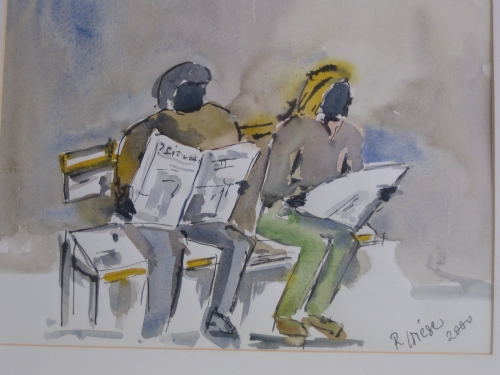
Presseschau - März 2015
00:05 Publié dans Actualité, Affaires européennes | Lien permanent | Commentaires (0) | Tags : presse, médias, journaux, allemagne, europe, affaires européennes |  |
|  del.icio.us |
del.icio.us |  |
|  Digg |
Digg | ![]() Facebook
Facebook
Interview with Fenek Solère

Out Now: The Partisan by Fenek Solère
The Partisan
by Fenek Solere
(London: Iron Sky Publishing, 2014)
246 pages
ISBN 978-1-909606-06-7 (paperback only)
The Fifth Republic
Son of a mudered activist during the Algerian War, the ambitious French Minister of Justice, Said Ben Hassi, dreams of a Pan-Eurabian Caliphate.
But his is not the post-colonial revanchism of a haunted man; it is the logical end product of decades of corrupt politics and misguided utopianism.
The old European establishment, weak and morally bankrupt, is impotent. The ancient French, victims of their own selfishness and nihilism, are fading, demoralised, and increasingly disenfranchised.
The Resistance
Yet, the spirit of Charlemagne and Charles Martel is not quite dead: a young resistance movement has emerged, determined to overthrow the Eurabian conquerors.
It's come to this . . .
It's kill or be killed.
La Pétroleuse
Their most terrifying weapon is Sabine D'Orlac, La Pétroleuse, who leads a violent paramilitary cell. Utterly ruthless, she will stop at nothing.
But neither will the enemy.
At stake is the future of Europe.
You can order The Partisan from Amazon US and Amazon UK.
Alex Kurtagic
Ex: http://www.wermodandwermod.com
Almost every time I receive a communication from you, it has originated in an exotic location, and it seems you are more often in some far-flung place on the planet than Britain. Are you an adventurer, or do you have a very interesting job?
I am both an adventurer and an entrepreneur. Like an ever-increasing number of people attracted to our movement I have thrived in the modern world, in direct contradiction to the media portrayal of dissidents like ourselves as lonely bitter bachelors, sitting in their basements with no friends and no sexual outlet.
Over the course of my adult life I have lived and worked in London, France, St Petersburg, Kiev, San Francisco, Central Asia, and the Middle-East. I am not someone who can be castigated and mocked for being unsophisticated or parochial. My home is filled with art, books, and the numerous artifacts I have collected from all over the world.
Both in private and professional terms I have lived cheek by jowl with many other cultures and ethnicities and observed them up close and personal. Life experience informs my writing. My fiction is grounded in an in-depth study of history, culture and political theory.
The Partisan could be read as the act of a natural contrarian. Were you a willful and troublesome child who did Z when told to do A?
I was born into an aspirant working class family in a small provincial town. My father was an electrician and my mother was a cook. A typical boy, I recall playing in the woods, running in the shadow of the craggy castles that littered the landscape, living more like one of those characters from an Arthur Ransom story than a game-boy addict. Pretending to be a cowboy, never an Indian, building tree houses in the style of Robinson Crusoe, crafting bows and arrows like Robin Hood to defend our fortified encampments.
My bookshelves were crammed with Tolkien, C.S. Lewis and the Norse mythologies. There was no family pressure to ‘achieve’. Rather, an atmosphere of calm reassurance. The warm glow of security reflected in the open fire as I sat marching Napoleonic armies across the hearth-rug. I was relatively good at sport, representing my school and region at football, rugby, basketball, and cross- country. By the time I met my first girlfriend I was already well-past reading Ayn Rand’s Anthem. I remember catching sight of her at a school disco. She was a spike haired punk in clinging pink trousers, cutting a resplendent profile in the backwash of strobe lighting, as she threw a right arm salute. Her small fist punching the air when the opening chords of the Sex Pistols’ God Save the Queen, broke out across the hall.
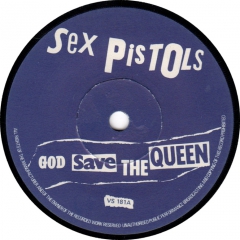 Within weeks I became an activist. I recall my initiation started one balmy summer evening when a group of us torched a Trotskyite Militant newspaper stand in the centre of town. Not long after I was involved in an amateur style re-enactment of the climactic scene from The Dead Poets Society. A clear-skinned, fair-haired boy was made to stand up in front of the history class to defend his essay justifying Apartheid. He was asserting the South African Government had been right to imprison Mandela for terrorism and maintain ‘separation’ of the races. The teacher, a bespectacled 68’er, was going ballistic, screaming from behind an accusatory finger, threatening to have my friend removed from her class. ‘You can’t say that!’ she insisted, ‘What sort of person are you?
Within weeks I became an activist. I recall my initiation started one balmy summer evening when a group of us torched a Trotskyite Militant newspaper stand in the centre of town. Not long after I was involved in an amateur style re-enactment of the climactic scene from The Dead Poets Society. A clear-skinned, fair-haired boy was made to stand up in front of the history class to defend his essay justifying Apartheid. He was asserting the South African Government had been right to imprison Mandela for terrorism and maintain ‘separation’ of the races. The teacher, a bespectacled 68’er, was going ballistic, screaming from behind an accusatory finger, threatening to have my friend removed from her class. ‘You can’t say that!’ she insisted, ‘What sort of person are you?
Then, when he had finished, he looked in my direction and I knew it was my turn to stand and repeat the process. When I came to a close I had the honour to defer to the next boy, who had also been called to answer for transgressing the politically correct curricula. This open act of defiance was rapidly followed by a nationalist poster campaign on school noticeboards, which coming so quickly on the heels of the pro- Afrikaaner debacle and my own and my girlfriend’s names appearing in bold graffiti under a very large symbol closely associated with a controversial German political party of the middle nineteenth century, resulted in my expulsion.
The Partisan is set in France. Why France?
I chose France for its symbolism. When I began writing The Partisan in 2009 I saw a magnificent country threatened by the machinations of a malignant cosmopolitan interloper who had hijacked the race riots breaking out in 2005 in almost every French conurbation for personal political advantage. Then, that same devious individual, insisting on the benefits of miscegenation between the French and the alien hordes swamping the very boulevards where they had set fire to cars and attacked the native people. It seemed to encapsulate the whole political and demographic catastrophe I wanted to warn against in my debut novel. It was a country on the front-line. But also one with a very rich history of patriotic movements like the Front National and Right-wing intellectuals like Maurice Bardèche and the Nouvelle Droite’s Alain de Benoist and Guillaume Faye. In more recent times the emergence of fledgling organizations like Generation Identitaire , who my fictional protagonists predicted two or three years prior to their brilliant ‘Declaration of War’ video and the Poitiers Mosque protest, gives me a real sense that the battle lines are being drawn and that the next twelve months will prove me right; that yes indeed, the land of Rousseau and Rabelais will be the first battle ground of the European resurgence.
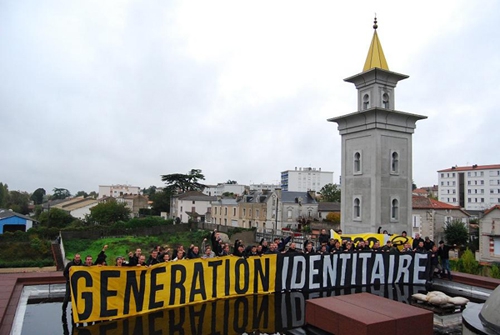
How does The Partisan differ from the various American novels treating the same topic?
The characters in The Partisan are much more three dimensional than those I have met and admired in other so-called Rightist fiction. It is not purely ‘vengeful’ entertainment. The text is more literary and is replete with reference points to other writers and political thinkers. This is quite deliberate. I want my fiction to excite, inspire, and motivate its audience to investigate the very deep intellectual roots of what is referred to as the New Right. I want The Partisan to be an access point for our youth into that culture and to become familiar with the ideas of its main proponents.
Almost everyone would agree that there is little to admire in many earlier incarnations of Rightist literature: it is too often badly written and its message is utterly superficial, in that it wallows in an angry revenge fantasy. Would you not agree that the biological worldview, such as the one that informs many of these novels, is necessarily an amoral worldview (which often becomes immoral), since nature is concerned only with what works in a practical sense, and doesn’t assign value to abstract principles the way humans do? Since Westerners assign such importance to such principles—indeed, Western political philosophy has always been underpinned by some system of ethics—how can anyone expect readers to feel comfortable defending the heroes in such fiction, even if they find the revolutionary fantasy privately satisfying?
It is true that such literature can sometimes lapse into simplistic comic book fantasy. Such deficiencies are to some extent why I wrote The Partisan. One of my key objectives was to fuse the action-orientated type novel with a more poetic but pessimistic futurology like that envisaged by Jean Raspail in The Camp of the Saints. The point being that certain types of material appeal to certain dispensations at different given points. Some of our movement’s earlier fiction may rightfully be described as amoral, but much that passes today for great classic literature was considered so in the past. Look at the homosexuality of Gide and the modernist works of Joyce. That is not to place all those writers sympathetic to our cause in this category of artists, clearly, only a very few like Ernst Jünger, Knut Hamsun, and Ezra Pound would qualify, but to indicate that the amoral/immoral argument shifts according to the fashion of the day. The biological imperative underpinning some of these texts does remain relevant, though we have many other facets to our ever-maturing world-view. Without Western people there will be no Western sense of principles or ethics, so in that regard I have a degree of sympathy for those ground-breaking writers, in that their heroes and heroines had at least a modicum of understanding that unless those values were defended they would cease to exist and all our fine ideals would disappear—mea culpa.
Where does your interest in the European New Right originate?
I read Michael O’Meara’s New Culture, New Right and discovered the French Nouvelle École (New School). From that point it was a natural progression to study Oswald Spengler, Julius Evola, Pino Rauti, founder of the Ordine Nuovo, Guido Giannettini and the ideology of the Armed Revolutionary Nuclei in Italy; the writings of Carl Schmitt and the Conservative Revolutionaries of the Weimar period; Imperium by the American renegade Francis Parker Yockey; works by the Belgian Jean Thiriart; alongside contemporary thinkers and commentators like Robert Steuckers, Gilbert Sincyr, Tomislav Sunic, Franco Freda of Disintegration of the System fame, Alexander Dugin, Kevin McDonald, Greg Johnson, Jonathan Bowden, Troy Southgate, and Michael Walker, editor of The Scorpion.
What is wrong with letting people from anywhere settle in Europe, if they are hard-working, law-abiding, tax-paying and contribute to the economy?
 Nothing, if that is indeed the case. I have met many Poles, Latvians, Lithuanians, and Central Europeans who fulfill such criteria. Of course a small percentage do not but most integrate perfectly well and live successfully among us. Compare that to the facts and figures behind migration from Roma communities, African or predominantly Muslim countries. Welfare dependency, anti-social behavior, criminality, isolationism and the colonization of whole communities seems to characterize the experience. Religious insularity, high prison rates, mosques filled with semi-literate imans and would-be boy-Jihadis educated free in our schools, sexism, genital mutilation, witch-craft, TB, Typhus, Ebola, drug and people trafficking, child-sex grooming, and riots complete the picture. Ask the people of Malmö, the women of Oslo, those poor souls living in close proximity to the urban sensitive zones around Paris or certain parts of the north of England like Bradford and Rotherham what part of the ‘enrichment’ process they have enjoyed. Talk to the thousands of violated white girls who have benefited from the fast food, cheap narcotics, and Rap music industry these people generate in their slums and taxi about our green and pleasant land.
Nothing, if that is indeed the case. I have met many Poles, Latvians, Lithuanians, and Central Europeans who fulfill such criteria. Of course a small percentage do not but most integrate perfectly well and live successfully among us. Compare that to the facts and figures behind migration from Roma communities, African or predominantly Muslim countries. Welfare dependency, anti-social behavior, criminality, isolationism and the colonization of whole communities seems to characterize the experience. Religious insularity, high prison rates, mosques filled with semi-literate imans and would-be boy-Jihadis educated free in our schools, sexism, genital mutilation, witch-craft, TB, Typhus, Ebola, drug and people trafficking, child-sex grooming, and riots complete the picture. Ask the people of Malmö, the women of Oslo, those poor souls living in close proximity to the urban sensitive zones around Paris or certain parts of the north of England like Bradford and Rotherham what part of the ‘enrichment’ process they have enjoyed. Talk to the thousands of violated white girls who have benefited from the fast food, cheap narcotics, and Rap music industry these people generate in their slums and taxi about our green and pleasant land.
What I witness every day are economic migrants, in transit under the false flag of asylum, seeking a better life at our expense. It is like a plague of locusts landing on a field. Leeching all the goodness from our soil. Infesting our villages, cities and towns. This is not some kind of small minded ‘fear of the other’ it is an objective analysis based on rational judgment. People like myself do not fear ‘the other’ we invest time and find out about the ‘other’ with a natural and friendly curiosity. I have lived for three years in Muslim countries and found good and bad much the same as I would in Europe or America. But what I find amongst the ‘invasion force’ pressing in upon Europe appalls me. I have nothing but the utmost respect for the nationalist activists who have stood tall despite state sponsored persecution and shouted until they were hoarse that the ‘emperor’ of multiculturalism has no clothes.
So is it just a question of the practical effects of multiculturalism? Is there no principle behind it except a root-and-branch or technocratic approach to problem-solving? Does this not make the liberal approach superior, then, since it is driven by an ethical system, however imperfectly executed? Not superior in a technical sense, but certainly in a moral sense.
There is indeed a very deep sense of principle embedded within my earlier response. People and communities who have over generations worked and sacrificed for their own well-being in later life and indeed their kith & kin in the present should expect that having made those long-term commitments under moral and indeed contractual commitments to and with their governments that those obligations are honoured. People originating from societies who have failed or are unable to take that long-term view have no prior right upon such investments. And I challenge any authority or political party arguing otherwise to stand openly upon a platform declaring such an intent to pillage that hard earned inheritance and let the people who have genuinely and fulsomely entered into such an arrangement decide the matter.
Surely, diversity increases creativity, since you have more perspectives and approaches to any problem, and immigration from everywhere boosts economic growth. Are you against creativity and for a stagnant economy?
Despite the diversity you see in Hollywood films and on television, the world’s laboratories, board rooms and libraries are not filled with West Indians designing new software systems for intergalactic flight, Somalians building robots to work in arid conditions or ecologically aware Uzbeks setting up green companies to reduce carbon emissions. This is a myth, perpetuated by the few whose individual and cosmopolitan group interests it suits, flooding productive economies with low IQ ‘hands’ to drive down wages and increase short-term share-holder profits at the expense of the long term interests of their host community. The media is used to manipulate and shape our moral and social expectations. Identity is eroded by the notion of ‘global citizenship’. Water-cooler philosophy is dispensed by Kid-President you-tube videos. Economic and moral stagnation leading to inter-ethnic tension distracts us from the enemy’s goals, so openly declared by Barbara Lerner-Spectre Founding Director of the Paideia Institute in Sweden: ‘I think there is a resurgence of anti-Semitism because at this point in time Europe has not yet learned how to be multicultural and I think we are going to be part of the throes of that transformation which must take place. Europe is not going to be a monolithic society that they once were in the last century. Jews are going to be to be at the centre of that. It’s a huge transformation to make. They are now going into a multicultural mode and Jews will be resented for our leading role but without that leading role and without that transformation Europe will not survive’.
This sounds like a conspiracy theory. Is not your answer a bit of an overstatement? Certainly, Jews in the diaspora on the whole have favoured social, political, and intellectual movements tending to make the societies in which they live safer for them. No surprise here, given their history. Yet, to the degree that they have supported or even led such movements, these have merely demanded a more thorough and complete application of principles already enshrined and, indeed, central to liberal political philosophy. And liberal political philosophy is wholly North-Western European and ‘Aryan’ in origin: John Locke, Jean-Jacques Rousseau, Thomas Paine, Adam Smith, Jeremy Bentham, John Stuart Mill, David Hume, Immanuel Kant—all these are gentiles, mostly from Britain to boot.
 Your point is well made and I take it in the spirit it is intended, however, please indulge me for one moment. The term ‘Conspiracy Theorist’ is often used to belittle and decry non-standard theoreticians. I accept there are a lot of cranks out there and people who have the potential to cause arm to others. Clearly, that is not my intent. Indeed, the very opposite is true. I am a historian and a political theorist. My opinions are not based on phantasms, a need to gain attention or dye my hair green and stand in a turquoise track suit next to David Icke. I have quoted above (and indeed elsewhere in relation to Nicholas Sarkozy, former President of France) one of hundreds of examples where some people of that particular diaspora have acted, in my opinion, against the interests of the European majority among whom they live. At this very moment I am simultaneously reading Ilan Pappe’s The Ethnic Cleansing of Palestine and Simon Schama’s The Story of the Jews: Finding the Words 1000BC - 1492 AD [Sic. It loos as if HarperCollins doesn't know that AD goes in front of the year. —Ed.]The former, a chilling account of the systematic way the founders of the early Jewish state went about their ethnic cleansing and murder of thousands upon thousands of Arabs in the late 1940’s, (activities some may argue analogous with recent events); the latter a shameless and sycophantic account of Jewish history that exonerates the Chosen from any sense of personal or group responsibility for the numerous expulsions they have suffered throughout the centuries. The media-savvy Schama, reveals himself to be less historian and more a propagandist as he explains why it is that everyone else is always to blame and his own tribe are always right, or indeed innocent, and the victims of mindless persecution. I would recommend everybody to read both texts. I found it advantageous to have also read the Talmud, Torah, and indeed the Koran, so I have a socio-economic, historical, and religious context for my opinions. I came to the work of Kevin McDonald late but recognize the behavior patterns he ascribes to his study group and I personally would prefer that the more over-zealous Zionists desisted from their activities so that your average Mr and Mrs Finkelstein could live in peace within the wider community. Unfortunately, that wider community now includes people with anti-semitic attitudes. This is regrettable but is a direct consequence of the strategy so eloquently explained by Spectre-Lerner above.
Your point is well made and I take it in the spirit it is intended, however, please indulge me for one moment. The term ‘Conspiracy Theorist’ is often used to belittle and decry non-standard theoreticians. I accept there are a lot of cranks out there and people who have the potential to cause arm to others. Clearly, that is not my intent. Indeed, the very opposite is true. I am a historian and a political theorist. My opinions are not based on phantasms, a need to gain attention or dye my hair green and stand in a turquoise track suit next to David Icke. I have quoted above (and indeed elsewhere in relation to Nicholas Sarkozy, former President of France) one of hundreds of examples where some people of that particular diaspora have acted, in my opinion, against the interests of the European majority among whom they live. At this very moment I am simultaneously reading Ilan Pappe’s The Ethnic Cleansing of Palestine and Simon Schama’s The Story of the Jews: Finding the Words 1000BC - 1492 AD [Sic. It loos as if HarperCollins doesn't know that AD goes in front of the year. —Ed.]The former, a chilling account of the systematic way the founders of the early Jewish state went about their ethnic cleansing and murder of thousands upon thousands of Arabs in the late 1940’s, (activities some may argue analogous with recent events); the latter a shameless and sycophantic account of Jewish history that exonerates the Chosen from any sense of personal or group responsibility for the numerous expulsions they have suffered throughout the centuries. The media-savvy Schama, reveals himself to be less historian and more a propagandist as he explains why it is that everyone else is always to blame and his own tribe are always right, or indeed innocent, and the victims of mindless persecution. I would recommend everybody to read both texts. I found it advantageous to have also read the Talmud, Torah, and indeed the Koran, so I have a socio-economic, historical, and religious context for my opinions. I came to the work of Kevin McDonald late but recognize the behavior patterns he ascribes to his study group and I personally would prefer that the more over-zealous Zionists desisted from their activities so that your average Mr and Mrs Finkelstein could live in peace within the wider community. Unfortunately, that wider community now includes people with anti-semitic attitudes. This is regrettable but is a direct consequence of the strategy so eloquently explained by Spectre-Lerner above.
The fact that you can list the names of such great Anglo-Saxon, French, and German thinkers is a testimony to the progressive and open-hearted culture from which they originate. That the good intentions of such well-meaning people could be so perverted is in fact a measure of what Yockey describes as the culture distortion so prevalent today both in Europe and America. I have studied the American Constitution, The Framers who devised it, their backgrounds, ethnicity and intentions. Likewise, the real motivations of President Lincoln before, during, and after the American Civil War and I can assure you the abbreviated versions of history our schools and universities teach us and the voters are fed through the distorting lens of Orwellian ‘Truth Speak’ is a subject fit for serious review. I myself studied the whole historiography surrounding ‘Reconstruction’ after the American Civil War and it is most instructive on how aspects of history can and are used during different epochs to influence public opinion. From the books we read to the films we watch. Trust me, there is a pattern and it is no coincidence. From Spencer Tracy’s The Northwest Passage encouraging American entryism into the Second World War, to John Wayne’s Green Berets, trying to sustain moral during the Vietnam War, and 300, instilling anti-Islamic sentiment during the Iraq and Afghan wars. A whole book could be written on the movies bolstering anti-German sentiments and the falsehoods therein contained, but I will leave it there, my counter-point, I believe, equally well made.
Immigration is needed because white folk no longer want to do certain jobs, whereas the newcomers are keen to contribute and willing to work hard. If we were to send them all back—which is impossible, of course—the economy and the NHS would collapse.
These shibboleths need to be exposed for the nonsense they are. In the course of my career I have collaborated with thousands of sole-traders, SME’s, and multinational corporations. In my opinion there would be no collapse, rather, a rejuvenation of the economy, greatly boosted I suspect by the end of massive social security payments, that could be re-directed from these imported voting blocs and unproductive elements to invest in new start-ups and training programmes for people who need to update their skill-set in line with current economic trends. I would recommend the re-nationalization of utility companies in the UK, likewise the rail and postal service, at the price set by the ‘fixers’ when they were sold off. I would also withdraw all benefits from those who had entered the country illegally and their families and dependents. Similarly, non-ethnic British who had committed serious crimes prior to their immediate deportation back to their country of origin, accompanied of course by their dependents, but not the assets that had been accumulated by fraudulent means or due to the generosity of the British taxpayer. It may sound draconian to some but it makes good business sense. I would also argue to levy taxes on the money migrant workers send back to their families, thereby reducing the outflow of capital from its source of origin and open negotiations with countries in receipt of Foreign Aid or benefits to assist us in the task of humane repatriation of their nationals or peoples of compatible ethnic origin or similar religious persuasion. New targets need to be set for emigration, based on a wide range of criteria, but certainly with a view to returning the ethnic balance of countries like Britain to pre-1997 levels. And that would be the start not the end-point of the discussion.
 With regard to the NHS, I have managed contracts with a wide range of people connected to this vast and worthy enterprise. Indeed, I have been involved with medical training for nurses, GPs, and surgeons. An immediate family member is a practicing junior doctor. The simple fact is that we are diverting resources to train people of non-British origin to these highly paid jobs, reinforcing cultural stereo-types among some of the high achieving Asians who think the profession is ‘theirs’ (the names Khan and Patel are currently the most common names for a medical doctor in the UK) whilst failing to act when they underperform or commit acts of negligence or perversion because we fear being branded ‘racist’. Additionally, we are providing health tourists with a first class service and denuding developing countries of their most highly skilled health professionals, which seems morally indefensible to me, especially if we are to be judged by the liberal and ethical standards we are supposed to be upholding. So, in short, I think we can materially benefit from a mass outflow of the post-’97 immigrants, up-skill the workforce with a view to advancing our technological infrastructure and preserve and improve fundamental services like the British NHS with a planned programme of awareness raising and aspiration building so that increasing numbers of whites want to move into these fields, as was the case in previous generations.
With regard to the NHS, I have managed contracts with a wide range of people connected to this vast and worthy enterprise. Indeed, I have been involved with medical training for nurses, GPs, and surgeons. An immediate family member is a practicing junior doctor. The simple fact is that we are diverting resources to train people of non-British origin to these highly paid jobs, reinforcing cultural stereo-types among some of the high achieving Asians who think the profession is ‘theirs’ (the names Khan and Patel are currently the most common names for a medical doctor in the UK) whilst failing to act when they underperform or commit acts of negligence or perversion because we fear being branded ‘racist’. Additionally, we are providing health tourists with a first class service and denuding developing countries of their most highly skilled health professionals, which seems morally indefensible to me, especially if we are to be judged by the liberal and ethical standards we are supposed to be upholding. So, in short, I think we can materially benefit from a mass outflow of the post-’97 immigrants, up-skill the workforce with a view to advancing our technological infrastructure and preserve and improve fundamental services like the British NHS with a planned programme of awareness raising and aspiration building so that increasing numbers of whites want to move into these fields, as was the case in previous generations.
Polls recording the attitudes of indigenous Europeans towards non-European immigrants consistently show that this view is popular. But how do you justify it morally? That’s the first thing. The second is, What about the many families of non-European origin that, nevertheless, have been here for several generations and are all citizens, born and bred in Europe? Are we to start rounding them up and shipping them out? And, if so, what would determine an ‘ethnically compatible’ country? Many are of mixed origin too, which would further complicate the issue, not just practically, but morally as well.
Yes, indeed, it is a popular view and one that should have had a major impact on the results of several electoral cycles. In the UK alone, there have been orators like Enoch Powell predicting the current circumstance for decades. Many other far sighted people have followed him, in their own ways, in their own countries across the ‘developed world’. Why it has failed to mature into a vote winning electoral vehicle in the majority of those countries is a question worth asking? Where was the plebiscite agreeing to immigration in the first place? Why isn’t one held now across the EU or in its constituent states? These very facts undermine the claim we live in representative democracies. The current wave of concern in this area may bring Marine Le Pen to power in France but I have no doubt every judicial or technical reason will be found to make that difficult. We have an unresponsive state apparatus that is ‘owned’ and with every year the new imported peoples who they pander to in order to maintain their short-term positions grow in number. These newcomers have originated from somewhere outside Europe and that is where they should return. Where is a choice for them to make but they should not remain. On the subject of people of mixed race, we have a conundrum. I believe everyone should be free to choose their life-partner without the interference of law and statute. Love is a valuable commodity and should be appreciated in all the various forms it assumes. But look carefully at the spousal abuse rates, the single parent families, the divorce rates between people of different ethnicities. The evidence is overwhelming, if uncomfortable reading for the self-loathers like FEMEN who daub their bare breasts with statements like: ‘Immigrants fuck better’. Perhaps a picture of O.J. Simpson would be more appropriate?
What do you think drives FEMEN to engage in this type of activism?
My initial response to FEMEN was positive. I thought they were protesting against the sexual exploitation of Eastern European women. My sympathies were obvious. The long and well documented white-slaving indulged in by predominantly Turkish, Albanian, and Jewish gangsters, gathers pace year on year. It is simply incredible that such appalling human trafficking exists and that no direct intervention like sanctions on the countries that operate brothel gulag systems are enforced. I note a real double standard here when you think of the recent high profile campaign by Michelle Obama to ‘Bring back our girls’. However, I soon became disconcerted when FEMEN Founders like Sasha Shevchenko began pontificating on their Sextremist ideology. I found it to be a poisonous cocktail of anti-white male bigotry, a clichéd Leftist love of ‘the other’, and a vulgar circus for self-indulgent, self-loathing women invading churches, urinating in the street, and protesting against so-called fascists who would deport the perpetrators of organized crimes victimizing their gender, limit the freedom of communities practicing female genital mutilation, and stamp out the grooming and abuse of young girls. I might be wrong, but I don’t recall seeing FEMEN actively challenging Muslim paedophiles in the UK or across Europe. Have they made a statement about Rotherham?
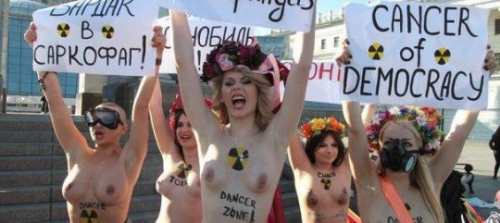
The antics of Pussy Riot demean the very important work of genuine female activists such as those of the first wave of feminism like Hannah More, Mary Wollstonecraft, and Frances Willard. Women whose genuine motivations were highjacked by radical feminists like the Red Stockings Brigade of the 1960’s, themselves a mere projection of the Black Civil Rights Movement stirring up trouble across the gender divide. Look at the work of Germaine Greer, Shulamith Firestone, Carol Hanisch, Ellen Levine, and Anne Koedt. The very titles of their books—The Female Eunuch, Forbidden Discourse: The Silencing of Feminist Criticism of Gender, and The Myth of the Vaginal Orgasm—betray their narcissistic belligerence, over-bearing sense of entitlement, political lesbianism, and economic and syncretic Marxist agenda. And it did not end there. Bell Hooks in her book Killing Rage went so far as to justify her feelings about longing to murder an anonymous white male, no doubt because he represented the ‘oppressive patriarchy’ all these types despise. Dworkin, Wolf, Paglia, and Steinhem all follow in the same path as de Beauvoir whose Second Sex features on all ‘politically correct’ liberal arts college reading lists. I would highly recommend an antidote to such corrosive prejudice. Try the work and thoughts of Erin Pizzey, an early campaigner against domestic violence, who incidentally has subsequently been forced to spend long periods in hiding after bomb threats from radical feminist extremists; Karen Straughan of Girl Writes What and Dr Tara Palmatier who are working hard to re-balance the debate. There is also an extensive literature refuting the theories of the celebrated women’s champions listed above: Christina Hoff Sommers, Who Stole Feminism ? and The War against Boys; Suzanne Venker’s The Flipside of Feminism: what Conservative Women think—and men can’t say; and Ronnee Schreiber’s Righting Feminism: Conservative women and American Politics.
According to certain controversial literature on human biodiversity, South East Asians are the most intelligent population on Earth and blacks the most athletic. If we accept this as true, then, surely, it makes sense to accept immigration from anywhere, since we’ll benefit from Asian brains and West African muscle. We’d then be unbeatable both in the astrophysics laboratory and the Olympic stadium.
Let us for a minute accept such stereotyping. Should we not also insist that those self-same people accept their proven statistical predilection for corruption, rape, and violence? Would South East Asians not be able to construct free and stable societies, dominate academia, and the patent lists of inventions? Why are our West African brothers not able to master the rudiments of more complex sports like gymnastics that require the synchronization of mind and body? I have studied alongside South East Asians and their tendency is to regurgitate what they learn uncritically. I have myself beaten black athlete’s on the school running track. Take a look at the Olympic medal tables and you will see white people outperform all other races proportionally, when you consider that we represent less than 16% of the world’s population.
Surely, with better immigration criteria and controls we can keep out the criminals and attract the best talent from all over the world. And, surely, there is a role even for rote memorisation and brute force in our societies. These things are needed, and it’s down to employers to find the right individuals for the right jobs. Let’s assume for a moment that this is just a technical issue that can be cracked with excessive costs and within a reasonable timeframe. Would you still oppose immigration? And, if so, why?
I would oppose immigration instinctively not just on the scale currently being undertaken, but because I think Europe, America, and the Slavic countries neither require it or substantially benefit from it. The criminal aspect is merely a ‘touchstone’ issue. Out of control diversity is a millstone not an asset. Especially when the benefits of diversity are all pretty much one-way. We in the West are uniquely blessed, unlike other peoples with most of the requisite capabilities to meet the majority of our societal needs. There is no obligation to feed the world until our own needy and poor are brought up to a proper level of subsistence. There is an old adage that charity begins at home. Let us start there. I do not however believe in isolationism, which is counter-productive and prevents a genuine and worthwhile exchange between cultures on an equal and beneficial footing. That is not what we have now.
The Western world can point to a history of brute force and rote memorisation. I do not hold such skills in high regard unless the former is absolutely necessary and the latter is applicable and beneficial to those who have no other course of betterment. I have liaised with large numbers of Chambers of Commerce in the UK and France and employers have plenty of opportunities to create viable and profitable businesses. What is becoming increasingly apparent is the drive towards excessive profit and greed. Such materialism above and beyond physical and spiritual satiation is I believe a serious sign of moral decay. The numbers of culturally bereft nouveau-riche people swilling second-rate champagne in kidney-shaped jacuzzis sickens me. And believe me, I have met many of that sort from Dublin to Tomsk.
Isn’t nationalism just hate and fear? Most decent people think it is very narrow-minded and backward world-view. We are no longer in the 19th century, after all; this is the 21st century and we live in a globalized world. You, in fact benefit from this every day.
I see the New Right as an alternative modernist movement, building on the homogenous organic roots of traditionalism, rejecting the liberal and socialist platitudes of a utopian future populated by a coffee-coloured people. I participate, contribute and benefit from the technical effects of modernity. Indeed, it is people like myself that drive those technical knowledge based economies. But I utterly reject the racial and cultural side-effects as an unnecessary impediment. I long for a political framework which abolishes multiculturalism and privileging the ‘ethnic’ over the ‘indigenous’ not because the European needs ‘protection’ and cannot compete but because current governmental statutes deliberately discriminates in favour of ‘ethnics’ over the whites and the fact that these global parasites are a drain on our core business, the advancement of our nations and the European continent. A national community functions best when, as Italian, Sergio Salvi, in his book Patria e Matria (Fatherland and Motherland) wrote : ‘It can be tentatively defined as a human group living in a definitive territory, which differs from other groups in a number of characteristics. These can be linguistic, cultural, historical and socio-economic. It is such shared characteristics that makes the members of a group aware of their particular identity. Even when the differences are not so tangible, they still give rise to the group’s desire to organize autonomously in the fields of administration (i.e., the State), politics and culture’. For me positive not ‘petty’ nationalism is the instinctive outcome of love for family, community and place. It is a healthy and over-riding human emotion. It is limitless and according to the Nietzschean theory of eternal return, its time will inevitably come again.
But nationalism is an idea associated with the nation-state, a fairly recent creation, which is becoming increasingly irrelevant, is it not? And its adoption necessitated the suppression of regional identities to begin with. At the time of the French Revolution, for example, only 1 in 8 people living in France spoke fairly good French; only half spoke any; and even in Oïl language zones, it was usually only used in cities. The ‘national identity’, the ‘national religion’, the ‘national curriculum’—all of these are concepts associated with the nation-state. The tendency in world history has been to go from lower levels of organisation to higher. Surely, you do not envision a return to the polis, or to the city-state (à la Geneva, as in Rousseau’s time), do you? What about the argument that hugely expensive undertakings, such as a space programme, would be far more difficult with a 1000 small regions with small economies, with 1000 currencies and 1000 languages, as opposed to with a large block like the EU, using one currency and adopting a lingua franca?
It is true that the nationalism of the last two hundred years is generally associated with the nation-state and if you are force-fed Ernest Gellner and Eric Hobsbawn like I was at university you are getting that diaspora interpretation once again. Even a more conservative view like that of Elie Kedourie comes from the same gene pool. Historians of this type are pre-determined to view such communitarian societies as essentially reactionary in character. Thinkers from the Anglo-conservative sphere like Edmund Burke, Thomas Carlyle, Maurice Cowling, Michael Oakeshott, T.S. Eliot, Roger Scruton, and Phillip Blond are given scant attention. Likewise, John Calhoun, the Southern Agrarian School, Russell Kirk, Paul Gottfried, and even Gregory Wolfe in America. De Benoist and Faye, whom I referenced earlier were largely ignored and remained only partially translated into English until Arktos Media redressed this unforgivable oversight in recent years. Consideration of the German Conservative Revolutionaries is basically forbidden unless it is to criticize them. People like Fichte, Herder, Schopenhauer, Stefan George, Ludwig Klages, Gottfried Benn, Ernst Niekisch, Arthur Moeller van den Bruck, Othmar Spann, Edgar Julius Jung, and the great Martin Heidegger, despite the latitude of their thought must be viewed through the politically correct lens. Even Carl Jung suffers in this regard, but then again, he did split from Freud and so according to their narrative can never be forgiven.

The significance and relevance of regionalism is in fact an issue I hint at in the text of The Partisan, where I try to balance the importance I attach to Breton, Provencal and other regional cultures to the unified fight-back against a common-enemy. I do envisage a Europe of a thousand flags under a federal entity. But you will appreciate my vision of such a European confederation would be unrecognizable from today’s EU. It would not be without dissension and dispute but it would be a debate between similar peoples of a generally shared milieu, informed and framed by some of the disprivileged thinkers I listed above. A discussion of this type is far more likely to advance in a positive direction than disputes between peoples of completely different cultures, races or susceptibilities.
In The Partisan, you seem to see the problems afflicting our societies cannot be solved through the mainstream political process. Yet, people—not only in France and in Britain, but in all the Western democracies—are given a chance to vote every four or five years , so the political establishment and the policies pursued by democratic governments simply reflect the will of the people. From this it seems obvious that your view is that of a disgruntled minority.
My first Masters degree is in Government & Politics. I fully understand the various forms of local, regional, national, and international governance structures that bind our hands. I have studied all aspects of representation, party funding and the ideologies and platforms of the supposedly competing mainstream parties. The charade of the democratic process and the pantomime of elections do not fool me or I think increasing numbers of other people. Our governments are bought and paid for by people running multi-national corporations and ‘banksters’ who do not have our best interests at heart. We may still be a disgruntled minority but a committed vanguard can lead a revolution. Did you see the street scenes on Maidan? I was there. All over Europe the Right is on the rise: in France, Austria, the Baltic States, Italy, Poland, and Hungary. Look at Casa Pound fighting the Reds on the streets of Rome, Blocco Studentesco and of course Golden Dawn in Greece. I was touched by the dignified way The Immortals conducted themselves during a torch lit parade through a small German town. Our creed is a vital and living force, not a passive celebration of former glories, or for that matter a family that lives in a lifeless, sterile museum. I have a certain respect for the sentiments expressed in the dedication to the preface of Derek Holland’s The Political Soldier II, Thoughts on Sacrifice & Struggle: ‘To the prayers of the Saints and the Blood of the Martyrs who redeemed the European Motherland in the Past. May we, the last loyal Sons of Tradition and Order, be worthy of their Example as the Final Conflict approaches’.
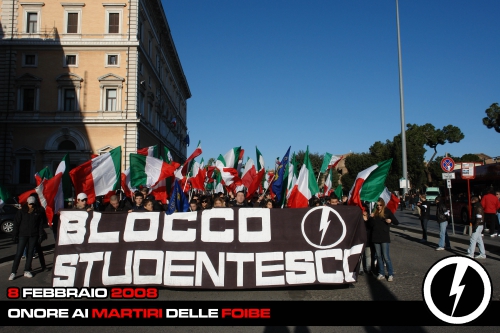
This narrative, about a race-based revolution, would strike many as wishful thinking by a fringe minority. Most would find it impossible to justify morally, because it is ultimately selfish. The Randian view of selfishness as a virtue has had the most fertile soil grow on in a context of Classical liberalism favouring individual liberty and therefore laissez-faire capitalism, and yet, it remains a marginal view; it cannot stand the moral attacks from the egalitarians, who can present themselves as virtuous because egalitarianism is selfless, at least as they understand it, which is what counts in this realm. Moreover, the events in Ukraine are of an entirely different order, since fits the liberal narrative, which can temporarily justify Ukrainian nationalism as a struggle for freedom—freedom from another, larger, richer, more powerful nation; a well-defined opponent. There is no well-defined opponent in Europe, even within the narrative you reproduce—no one likes the bankers and politicians, but responsibility for even the worst trends is diffuse. Even Tony Blair, a proven liar and war criminal, is making a killing economically. GQ even named him philanthropist of the year, eliciting only the most supine and feeblest of complaints!
This is the exact opposite of wishful thinking. Who would want to deal with a civil war on their own soil ? Yugoslavia was a test-case. I am not advocating violence but warning against it. The Partisan is not wish fulfillment, rather a shrill cry of concern about what will occur unless positive steps are taken now. Merkel and Cameron bemoaning the failure of multiculturalism will not stave off internecine violence. Randian idealism remains a cult because it does not link the supposed virtue of selfishness with the natural philanthropism that people have felt and acted upon historically because they are inclined to support people of like character and type. It is true the banksters are an easy target but you are looking through a post 2007 perspective. Distributists like Chesterton and Belloc were saying this over 70 years ago. And they were right!
In relation to Ukraine. I first starting wearing Stepan Bandera t-shirts and drinking vodka with Ukrainian nationalist veterans in the cellars of Lviv 7 years ago. I am fully aware of how that genuine uprising was manipulated. I was holding a birthday party 200 meters from the spot where the secret police were shooting protestors in Kiev last March. I have two further manuscripts dealing directly with Russia and Ukraine completed and ready for publication.
I personally refused to meet Tony Blair despite being part of a British trade delegation set to greet the former Prime Minister to a certain Muslim country two years ago. GQ embarrasses itself and insults our intelligence with their phony polls and propaganda. Everyone knows what Blair and his type represent and advocate. Will he produce GQ’s analysis as part of his defense when he is finally brought before a court? I don’t know about you, but I would anticipate a cacophony of contemptuous laughter.
You seem to reject egalitarianism. But isn’t equality a good thing? And if you don’t, are you not saying that certain people are inferior and should be deprived of rights that everyone—and certainly the United Nations—regard as universal? How can you possibly defend that? Is it your view that women are inferior to men, that blacks are inferior to whites, and that you’d rather institutionalise privilege for some, and oppression for others, based on the qualities they are born with and therefore cannot do anything about?
Egalitarianism is a façade used by the liberals and socialists to push their proposition nation agenda. In pursuit of the Holy Grail of Equality they are more than willing to sacrifice any sense of human differentation, erasing the realities of race, gender intelligence and cultural competencies. It is not a matter of supremacy and inferiority, it is a matter of reality. I do not believe in a universal ‘lowest common denominator’. People and cultures are different and we should celebrate that very real diversity not hold it to a single standard. Cultures are at different points of development and are on different trajectories. I agree with Spengler when he said, ‘Each culture has its own new possibilities of self-expression which arise, ripen decay and never return. There is not one sculpture, one painting, one mathematics, one physics, but many, each in its deepest essence different from the others . . . ’ Does that sound like someone who wishes to impose his will on others or a person hell-bent on depriving other cultures of their right to sovereignty or self- determination? I think not. Look around the world, the caste system you allude to in your question and the slave/worker relationships it implies are far more prevalent and embedded in non-white cultures. I am reminded of an axiom quoted in the short lived Rising journal: ‘A Nationalism that seeks to subdue or extirpate another culture is, in fact, not a Nationalism but an Imperialism, which threatens not only its intended victim but also its own well-being, for its distorted view of itself, and of its relations with others, can only invite disaster’.
I would not have selected a woman to be the central character in my novel if I was even remotely sexist or believed the female gender was in any way inferior. Sabine, the heroine of the book, is the very personification of a modern, intelligent, powerful woman who makes her own decisions and lives with the consequences. It is my view that we need to be far more strategic in appealing to women in order to grow our movement. They offer us the chance of a real multi-skilling asset which would greatly enhance our operations and further refine our perspective, ideals and objectives.
The issue is also not about colour but character and capability. History informs us that large numbers of diverse people find it difficult to live in close proximity without conflict. In general, the under-achievement of many non-whites living in a white community leads to demoralization, dependency and frustration. These result in violent outpourings like: in the USA—Watts 65, Newark 67, Rodney King/LA 92, Cincinnati 2001, Ferguson 2014; in the UK—Bristol 1980, Toxteth 1981, Brixton 1981, Bradford, Burnley and Oldham 2001, London 2011; in France—Clichy-Sous-Bois, Seine-Saint-Denis, Dijon, Belfort 2005; in Italy—Rosarno in Calabria 2010; in Spain - Roquetas in Almeria 2008; in Sweden—Stockholm 2013.

I see no benefit in perpetuating such catastrophes when it is clear that peaceful co-existence and co-location is simply not possible. A race realist like myself would recommend a natural separation based on mutually agreed terms.
This argument has been made for decades, with a great deal of hard science to support it. And yet, that hasn’t made any difference. It is still rejected wholesale. We go back to the ethics of this idea: egalitarians may argue that even if equality does not exist, it is nevertheless a noble ideal, and that alone makes it worth pursuing, even if the ideal could never be achieved entirely. In short, the facts don’t really matter, because this is an ethical question, not an empirical one.
If the Convergence of Catastrophes Faye anticipates in his book is correct, and the money, food and power begins to run out, I predict it will not be noble ideals and ethics that characterize our behavior. When the tipping point is reached the fracturing of society will move rapidly on ethnic, religious and tribal lines. Like you yourself argued in one of your celebrated speaking engagements, The Collapse may not be instant, it may have already began and its ramifications may go unnoticed at first. I think it was Ezra Pound who claimed it is the artist’s antenna that first picks up the vibrations of such events. The Partisan is in some ways a literal confirmation of what my more sensitive predecessors already knew awaited us. It is the realization of the dark nightmare to come.
In that speech you refer to I also said that a collapse could well take so long that by the time it is recognised as such the consequences would have long ceased to be relevant, because those affected or warning about them would have already disappeared or were no longer powerful. I also mentioned that there is no guarantee that any collapse would have the desired outcome. The scenario you describe assumes that in a social breakdown scenario, everybody falls into line along ethnic or tribal lines. That seems likely with the non-European demographic in our part of the world, but simple everyday observation suggests Europeans, and particularly North-Western Europeans, will remain as divided as they are now, fractured along moral or morally justified ideological lines. Even the Far Right is notoriously fractuous, not only due to conflicting personalities, but also due to disagreements over ideology. The same has always been the case with the Far Left. Kevin MacDonald has pointed out that Western Europeans are low in ethnocentricity and tend to form moral communities. If that is true, then ancestry is an insufficient condition. So the question must be asked—if egalitarianism is the irritant and the stumbling block, should identitarians not be focusing on a moral critique of egalitarianism?
I would contend the collapse started around 1913 and is now well advanced. The collapse takes many forms and proceeds at a different pace along many separate fault lines. It can be identified and estimated by different social, economic, demograhic, and political indices. We recognize it at the point it affects us as individuals, or as citizens of a particular nation. Those who govern the western world are managing the decline rather than arresting it. Some I suspect are complicit in it, or are directly benefiting from the decline in some way, transferring assets and investments at favourable rates to BRIC countries, much like maggots feeding off dying flesh. There is simply no way of guaranteeing that the moral poison of egalitarianism will not have so retarded the European population that they are inhibited from protecting their own or acting in a way to promote their group’s interest. I suspect however, that when non-Europeans band together, set up exclusive organizational structures, possibly based on religious lines, commit outrageous crimes and begin ethnic-cleansing, the mantra of ‘One World, One People’ will ring very hollow. There is nothing like watching your mother, sister and daughter being raped, or your father, brother and son being eviscerated by machete wielding savages to focus the mind. A moral critique of egalitarianism is long overdue. But we should pull the mask off this expression egalitarianism and call it what it is today, the Frankfurt School strategy to undermine all aspects of the Western Superstructure.
So what if people with non-European ancestry eventually become majorities in Europe? Aren’t they just people, no better or worse than anyone else? Are we to judge them by the colour of their skin, rather than the contents of their character?
The character and nature of the future population of Europe most certainly does matter. Demographics is destiny and the central question of our age, is whether or not the civilized and educated nations of the world will continue to allow themselves to be overwhelmed by those incapable of self-improvement, other than by squatting in close proximity to the techno-industrial or welfare systems of more developed cultures with their begging bowls in hand, or will they close their borders. The behavior, values, and capabilities of a large percentage of the people of non-European ancestry who are coming to Europe at this time, like many of the Latinos fording the Rio Grande, do not stack up meritoriously under any serious degree of scrutiny. They stand condemned by any scientific or moral measurement by which you would chose to evaluate them. They threaten a new dark age, taking us back centuries. Forget customs and folkways for one moment, just look at the graphs on intelligence. IQ averages in the countries benefiting from immigration are plummeting. In what way can this be described as evolution? It represents the dilution of excellence and the low level ground war already underway throughout North America and Europe is a sure sign that things will get worse rather than better. Is Leicester or Birmingham to be the next Detroit?
Like Spengler I believe that the human species is divided into a variety of widely differing and contradictory cultures. My interpretation of nationalism carries with it the insistence of reciprocal respect. It is in essence Identitarian. What we strive for is national self- determination; sufficient living space for the preservation and development of our race, heritage and culture; a socio-economic and legal system that reflects the values of its creators; the nurturing of our art; and the continuance of our life-force into future millennia. I will not stoop to plea for this on the grounds of the Charter of Human Rights or because it can be argued that what is being done to the white indigenous populations of European nations is a form of genocide by stealth. Though you can make plausible arguments for both those scenarios. I do not ask permission to live or to survive in my own homeland. A territory that people of my lineage have inhabited for 10,000 years. I demand it and will join others in reaching for the rope to hang the traitors who opened the floodgates to the sewers of the third world and lock and load the guns when words prove insufficient to defend our homes.
What was your aim with The Partisan?
 Continuing my earlier point about fiction providing a gateway to theory, I want to contribute to a vibrant cadre of New Right novelists. My desire is to re-enchant the present generation with the ideals that made Europe great in the past. We are all descendants of a great cultural and intellectual inheritance and we have to make that case time and time again. Standing on the shoulders of giants like Ernst Jünger, Ezra Pound, and Louis Ferdinand Céline, I believe there now exists the potential to develop a genre that both entertains and informs. Several recent works like your own Mister, Tito’s Perdue’s oeuvre, and Derek Turner’s Sea Changes provides the basis for a new school of storytellers, poets and singer-song-writers.
Continuing my earlier point about fiction providing a gateway to theory, I want to contribute to a vibrant cadre of New Right novelists. My desire is to re-enchant the present generation with the ideals that made Europe great in the past. We are all descendants of a great cultural and intellectual inheritance and we have to make that case time and time again. Standing on the shoulders of giants like Ernst Jünger, Ezra Pound, and Louis Ferdinand Céline, I believe there now exists the potential to develop a genre that both entertains and informs. Several recent works like your own Mister, Tito’s Perdue’s oeuvre, and Derek Turner’s Sea Changes provides the basis for a new school of storytellers, poets and singer-song-writers.
They say that those who forget the past are bound to repeat it. You have an advanced degree in history from an American university—in fact, with a major component in Black Studies. Could it be not be argued, therefore, that you of all people, should know better than to write novels like The Partisan?
On the contrary. My original Masters in Politics included a dissertation which was a critique of the Soviet system. The Black Studies component of my MA in History featured such luminaries as: Nat Turner, Frederick Douglas, W.E. Dubois, Marcus Garvey, Elijah Muhammad, Martin Luther King, Malcolm X, Angela Davis, Kathleen Cleaver, Bobby Seale, George Jackson, Jesse Jackson, Al Sharpton, Louis Farrakhan and Black Panthers like Stokely Carmichael and Huey P. Newton and their ilk.
I probably know more about Communism and so-called Black Civil Rights activists than those on the left. It is an advantage to know your opponents better than they know themselves. My studies helped me identify the linkages like that between the Zionist Kivie Kaplan, who was Martin Luther King’s ‘handler’ and the communist Party of America. It was a formula that was repeated in the former Weather Underground leaders Bernadine Dohrn and Bill Ayers involvement with the Obama Presidential candidacy. Similarly, the association between Joe Slovo and his slow-witted tool Mandela in the dismemberment of South Africa.
These simple key quotes define the reasons why I wrote The Partisan:
‘During the last Open Convention the debate was, was it or was it not the duty of any good revolutionary to kill all new born white babies. At the time it seemed like a relevant framing of an issue. The logic being that through no fault of their own these white kids are going to grow up to be a part of an oppressive racial establishment internationally, so really your duty is to kill new born white babies. And I remember one guy tentatively and apologetically suggesting that this was in contradiction to the humanitarian aims of the movement and he was booed down’ - Doug McAdam (Weather Underground)
‘Kill all white men, white women and their babies’ - New Black Panther Party activist Malik Zulu Shabbaz (picture hereunder), infamous for accusations of attempting to intimidate voters at a Philadelphia polling booth in 2008.

Do you plan on getting another degree?
To quote Solzhehnitsyn : ‘without any censorship, in the West fashionable trends of thought and ideas are carefully separated from those which are not fashionable; nothing is forbidden, but what is not fashionable will hardly find its way into periodicals or books or be heard in colleges. Legally your researchers are free, but they are conditioned by the fashions of the day . . .’
One single anecdote illustrates this perfectly. Having graduated on a bright summer day under a warm Californian sun, I returned to a slate grey London, intending to commence a PhD on the historiography of the so-called European New Right. I was interviewed by an American Professor with a Jewish surname. He was wearing a tweed jacket and smiling suspiciously over an oversize bowtie. As I tried to explain my hypothesis, the would-be don twirled his pen, looking distractedly out the window.
‘Why are you interested in these people?’ he asked contemptuously, ‘they have no intellectual capital. Have you thought of an evaluation of the impact of his theological upbringing on Martin Luther King’s later Civil Rights activities?’ The door closed. So I pushed on another. Sitting down in front of my laptop, sometimes overlooking a village green in Kent, where my every key stroke echoed to the rhythm of leather on wood; and at other times walking around the Zenkov Cathedral in Almaty, staring up through the cloud formations gathering around the rim of the Zailiysky Alatau mountains, I began typing the opening lines of The Partisan. That is my PhD thesis and it is written from the heart, free of the shackles of political correctness.
I notice that, though The Partisan draws from the anti-liberal ideas of the European New Right, it also has references to the French Revolution, which represented a triumph of liberal political theory. You even have the revolutionaries sing certain verses from La Marseillaise. Is this not a somewhat idiosyncratic interpretation of history?
It is the paradox we live with. French identity and pride is inextricably linked with a familiar anthem like La Marseillaise. If fiction is to be grounded and credible it must reflect reality. I would argue that we should accept that the vast numbers required to make a movement will fix on certain icons, flags and songs as they come together. It is to be expected and it is expedient. It is the passion and emotive qualities of unifying symbolism that is important. The deconstruction of deeper ideological underpinnings can be dealt with once we have won back the streets.
The Partisan makes a clear case against the Islamisation of France, and, presumably by extension, of Europe. What is wrong is Islam having a presence in Europe? There are Muslims in Bosnia who are fully European and don’t behave at all like Abu Hamza and fellow Jihadists from Asia and North Africa or the Pakistani paedophile rings in the United Kingdom. Indeed, even the SS had a division of Bosnian Muslims.
A presence is one thing. An overwhelming presence is quite another. Whilst minarets overshadow rooftops from Barcelona to Geneva and Frankfurt to Bolton, Christian churches are being firebombed across the Muslim world and the followers of Jesus are given an option, convert or die. How long before the phony war of protest by Muslims in Paris, Amsterdam and Brussels turns into a full scale insurgency by ISIS trained zealots? There is much to admire in all faiths, cultures and identities. But we must acknowledge, they flourish best when they are rooted in their home soil and watered by the winds from their own mountain tops. Over the last half century the seeds of destruction have been scattered across our fields. It is time to take the scythe to the weeds strangling our crop.

What about David Cameron’s proposal of ‘muscular Britishness’?
There is so much one could say on this matter but I will try to keep my reply concise and free from vitriol. My recollection is that this expression was first used in a Daily Mail article on the Trojan Horse scandal, where Tory party policies relating to the freeing up of school governing bodies and head-teachers from so-called local authority bureaucracy and allowing more school independence had resulted in a myriad of predominantly Muslim schools imposing a sharia curricula, removing white governors and treating indigenous students, already a numerical minority as second class pupils. Well, I cannot say I am surprised, it reinforces what I alluded to earlier in relation to the mindset of certain burgeoning non-British communities. I contend such autonomy will be abused by these people time and time again. They simply cannot be constrained by the normal European or British notions of fair play, decency and appropriate behavior. These apologists for paedophilia and honour killings are animated by the dream of a jihadist take-over not assimilation. The fact that Cameron, along with his collaborators in the Liberal-democrats have actually overseen a growth in immigration, despite all their public statements and manifesto pledges to the contrary, calls into question both the British Prime Minister’s integrity and capability.
His fetid description of Britishness as being all about democracy, equality, and tolerance reveals a complete disengagement with the martial qualities that built an Empire from Scotland to the Falklands and Novia Scotia to Singapore. Listening to a rendition of Elgar’s Pomp and Circumstance, would suffice in correcting such confusion. These modernist ideals also fly in the face of historic reality like the Chartist March on Monmouth, where men were shot and killed for demanding political representation; the fact that for centuries only male property owners had the right to vote and a suffragette had to throw herself under the King’s horse to raise awareness that women wanted the same opportunity; and that the everyday experience of anyone expressing concern over the behavior of non-whites is immediately shouted down with the cat-call of that much over-used word ‘racist!’ The latter apparently being a case of blatant ‘intolerance’ regardless of the merit of their argument. Double standards abound. No tolerance for the intolerant. No platform for fascists ! Government ministers signing up as members of Unite Against Fascism. So it seems, equality and tolerance are in reality in short supply in David’s Little Britain.
As for democracy, equality and tolerance are as British as the Union Flag, football and fish and chips ? Well let us deconstruct David’s assertions in true Marxist dialectical terms, shall we? It strikes me that the very existence of the Union flag is called into question by the Scottish referendum. Something Mr Cameron agreed to but did not feel he could extend to the discussion on immigration? With regards to football, it was clear from the lethargic display by the English team at the last World Cup, that the game ‘the British’ invented has now developed well beyond their current competency levels. Football is most certainly not coming home to paraphrase the line from the Three Lions Song. And the clichéd reference to fish and chips, so typical of Oxbridge champagne swilling Tories trying to appear ‘down with the boys’, can be dismissed by the simple observation that the most popular meal in the UK is now curry.
Like John Major before him speaking of the English matron pedaling through the morning mist or Mrs Thatcher hinting about the people’s concern about being ‘swamped’ by immigrants in the 79 election, Cameron has no intention of enacting muscular Britishness, whatever that means? Look who funds the party he leads. Peel back the names to reveal his own family origins and those of his advisors. Indeed, those of his predecessors. Leon Brittan, Nigel Lawson, Keith Joseph, Malcolm Rifkind, Alex Carlisle, Michael Howard, Edwina Currie, John Bercow and Keith Joseph. Check the following list of Conservative, Liberal Democrat, and Labour MP’s, Ministers and Peers of the realm (the following is only indicative, not comprehensive) : Sam Gyimah, Kwasi Kwarteng, Reham Chisti, Baroness Warsi, Priti Patel, Alok Sharma, Nadhim Zahami, Kishwer Falkner, Sandip Verma, Mohamed Sheikh, Nat Wei, Maurice Saatchi, Satyendra Prasanno Sinha, Lord Taylor of Warwick, Patricia Scotland, Navnit Dhozlakia, Herman Ouseley, Floella Benjamin, Meral Hussein-Ece, Zahida Manzour, Rumji Vergee, Doreen Lawrence, Paul Boateng, Lord Darzi, Bill Morris, Baron Bhattacharrya, Baron Chan, Amir Bhatia, Baron Adebowale, Baron Parekh, Baron Patel, Baroness Pashar, Nazir Ahmed, Baroness Uddin, Baron Ali, Keith Vaz, Valerie Vaz, Chuka Umunna, Yasmin Qureshi, Ed Milliband, and George Galloway. Now ask yourself are such people likely to enact muscular Britishness?
And before we settle back and think this is an isolated situation, please take a look at the political ‘movers and shakers’ in the United States and closer to home, in Europe itself. It is not hard to find the same egregious behaviour perpetrated in the same quarters by the same self-interested parties.
Why did you choose a female protagonist?
I wanted to create a positive role model for those young women sympathetic to our shared traditions and thinking about becoming active in the movement. The Left have to some extent mythologized in book and film form the likes of Ulrike Meinhof and Gudrun Ensslin. To my mind these were two emotionally bereft, politically shallow and nihilistic women. Sabine was created in direct opposition to these latter day martyrs of the German Autumn. I can foresee a time when some of our best exponents will be women. I long to stand beside them in the shadow of fluttering Spartan pennants on the field of Poitiers.
Is there hope for Europe beyond liberalism?
There most certainly is. First, we must acknowledge the significance of integral traditionalism to the life and continuity of the homogenous community. Then we need the energy and vital radicalism of revolutionary conservatism to simultaneously conserve and transform those parts of our culture that are (a) worthy of preservation and (b) in vital need of evolution or eradication.
Isn’t liberalism simply for individual liberty, freedom of expression, freedom of opportunity, and equality before the law? Are we do away with all those, and go back five hundred years—or, worse still, end up with an authoritarian police state?
The police state is already here and the prison walls are the laws imposed upon us by the equality gurus to uphold the liberal establishment. There is no real individual liberty. It is being systematically replaced by stifling conformism in both the private and public arenas. Freedom of opportunity and equality before the law increasingly only applies to non-whites. A two-tier justice system is enforced by the adoption of politically correct moral codes. Social ostracization and exclusion from the work force is practiced against dissenters. Orwell’s vision of a ruthless regime insisting on political orthodoxy is with us. We are all locked in room 101 with Winston Smith and the rats are coming.
00:05 Publié dans Entretiens, Livre, Livre | Lien permanent | Commentaires (0) | Tags : entretien, fenek solère, livre, roman |  |
|  del.icio.us |
del.icio.us |  |
|  Digg |
Digg | ![]() Facebook
Facebook
samedi, 07 mars 2015
Michel Raimbaud : « Les États-Unis n'ont qu'une logique : celle du chaos »
Michel Raimbaud : « Les États-Unis n'ont qu'une logique : celle du chaos »
 Ancien ambassadeur français en Mauritanie, au Soudan et au Zimbabwe, l'écrivain Michel Raimbaud* vient de publier « Tempête sur le Grand Moyen-Orient », un ouvrage qui s'annonce déjà comme un classique de la géopolitique moyen-orientale et eurasienne. Il revient sur ce projet élaboré par les néoconservateurs américains qui a non seulement déstabilisé le monde arabo-musulman, reconfiguré les relations internationales, mais fait désormais des vagues jusqu'en Europe, avec la violence qu'on connaît.
Ancien ambassadeur français en Mauritanie, au Soudan et au Zimbabwe, l'écrivain Michel Raimbaud* vient de publier « Tempête sur le Grand Moyen-Orient », un ouvrage qui s'annonce déjà comme un classique de la géopolitique moyen-orientale et eurasienne. Il revient sur ce projet élaboré par les néoconservateurs américains qui a non seulement déstabilisé le monde arabo-musulman, reconfiguré les relations internationales, mais fait désormais des vagues jusqu'en Europe, avec la violence qu'on connaît.
Vous avez placé en épigraphe de votre livre cette citation de Voltaire : « Pour savoir qui vous dirige vraiment, il suffit de regarder ceux que vous ne pouvez pas critiquer. » De qui parlez-vous?
Il suffit de voir autour de soi. La maxime s'applique à ce qu'on appelle le « pouvoir profond »… On ne peut pas critiquer certaines catégories de personnes et les sujets qui vont avec, dont ceux que je traite dans ce livre. Ce sont ces sujets sensibles.
Vous dites que l'expression « printemps arabe » n'est pas un concept arabe, mais occidental. Le nouveau président tunisien l'a confirmé. Est-ce cela qui explique ce qui s'est passé dans le monde arabe ?
Tout à fait. La naissance de ce concept est le fait d'intellectuels et de journalistes français. Il se réfère aux printemps démocratiques, celui de 1848 qui a tenté de bousculer les vieilles monarchies européennes vermoulues, le printemps de Prague en 1968, Mai-68 en France… Cette assimilation historique est un peu hâtive. Sans compter qu'en Tunisie, le printemps du jasmin, c'était en hiver !
Vous n'avez pas de mots assez durs pour évoquer le printemps arabe : « Une appellation plutôt usurpée pour une saison sinistre n'ayant guère d'arabe, à part le nom, qu'une vague façade en carton-pâte derrière laquelle se tapissent un fanatisme islamiste de la pire espèce, des pompes à finances wahhabites inépuisables », etc. Et j'en passe…
Je le pense depuis le début. Tous les pays arabes ont été touchés sauf les monarchies. Le Bahreïn est une exception à cause de sa « minorité » chiite qui constitue plus de 70 % de la population. Au Yémen, on a découvert à l'occasion de la guerre civile qu'il existe une minorité chiite, les zaydites, représentant 40 % de la population. Il y a des chiites cachés en Turquie, il en existe aussi au Pakistan, entre 20 % et 25 % de la population.
Qu'entendez-vous par un Grand Moyen-Orient situé entre l'empire atlantique et l'Eurasie ? Peut-on encore parler, à propos de l'Otan, d'un empire ? Quant à l'Eurasie, elle est encore embryonnaire. N'est-ce pas une anticipation ?
Oui c'est une anticipation. L'expression du Grand Moyen-Orient elle-même est de George Bush. Ce n'est plus un Moyen-Orient dans la mesure où il va de la Méditerranée à la Chine centrale. L'Eurasie est en gestation, certes, mais le changement se produit sous nos yeux. Les Brics sont en formation, surtout son noyau euro-asiatique. Cet ensemble a de l'avenir.
Mais le Grand Moyen-Orient n'est-il pas une vue de l'esprit ? On a l'impression, plutôt, d'un monde éclaté…
C'est le monde arabo-musulman d'aujourd'hui qui est éclaté. L'expression Grand Moyen-Orient est concise et couvre une vaste région. L'empire Atlantique se place face au bloc euro-asiatique. Ces blocs existent déjà et le deuxième est en voie d'organisation.
Comment expliquer que le mal nommé « printemps » ait pu réveiller la guerre froide ? Et que la Russie et la Chine se soient liguées pour contrer ce projet ?
Cette opposition russo-chinoise est une grande première. Jusqu'en 1991, le monde est bipolaire avec, entre les deux blocs, une Chine qui trouble un peu le jeu. Au milieu se trouvent les pays non-alignés, terre de mission pour les deux camps. En 1991, à la chute de l'URSS, on a cru en l'avènement du monde multipolaire. Ce n'était pas vrai : ce que l'on a vu, c'est l'avènement du monde unipolaire, le monde américain. L'Occident va alors pouvoir gouverner au nom de la « communauté internationale », sans opposition, pendant vingt ans, jusqu'en 2011. Puis il va s'évanouir avec les crises de la Libye et de la Syrie.
Tout capote avec ces pays, et nulle part ailleurs.
La Chine va se joindre à la Russie lors de la guerre de Libye, le vrai point de rupture. Auparavant, les deux pays avaient été mis en condition pour accepter la résolution 1973, avec l'idée qu'il fallait protéger la population civile. C'est la mise en œuvre de cette résolution qui a fait déborder le vase. Ils se sont rendu compte qu'ils avaient été bernés, et qu'ils avaient fait une erreur en s'abstenant.
Les bombardements commencent le lendemain de l'adoption de la résolution des Nations unies. L'Otan, qui n'y était mentionnée nulle part, entre en guerre, bombarde tout, démolit tout. En toute illégalité. Si on regarde le chapitre 7 de la charte des Nations unies, on constate que toutes les dispositions qui encadrent les interventions ont été violées. Y compris celles au prétexte humanitaire. Pour la Chine et la Russie, il n'y aura plus jamais de résolutions à la libyenne. Elles s'opposent six mois plus tard à la résolution sur la Syrie, apposant quatre fois leur veto. Je ne comprends pas que les Occidentaux n'aient pas compris que la Russie et la Chine ne rejoindraient plus jamais la fameuse communauté internationale pour ce genre d'aventures.
La Syrie est donc fondatrice de la nouvelle donne internationale…
C'est l'épicentre d'un conflit global qui dure depuis quatre ans. Si le gouvernement légal de la Syrie était tombé comme les autres auparavant, ou si le régime avait été renversé comme celui de Kadhafi, il y aurait eu d'autres printemps arabes. Mais la Syrie en a été le coup d'arrêt. Les Russes ne voulaient pas tant soutenir la Syrie, mais ils y ont trouvé un partenaire, un point d'ancrage solide. Avant l'Ukraine… Ils ont cultivé l'alliance et rameuté les Bric autour d'eux, à commencer par la Chine. Quatre vetos sur la Syrie : la Chine garde un profil discret, mais ferme. Impressionnant. Au summum de la crise sur les armes chimiques en Syrie, en 2013, il y avait certes les gesticulations russes et américaines, mais il y avait aussi des navires de guerre chinois au large des côtes syriennes. C'est une première et cela devrait faire réfléchir les Occidentaux.
Pourquoi l'Occident séculier soutient-il des mouvements islamistes qu'il combat chez lui ?
Par absence de logique. À ce propos, il faut distinguer les États-Unis et ses alliés au Conseil de sécurité, qui ont des traditions de grandes puissances, et les alliés privilégiés des États-Unis, mais qui n'ont pas les mêmes motivations. Globalement, les Américains sont ceux qui commandent et ont mis en œuvre une stratégie du chaos. Ils ont continué à soutenir les gens d'Al-Qaïda, dont ils sont les créateurs avec l'Arabie Saoudite et le Pakistan. Puis, quand ils n'en ont plus eu besoin, ils les ont laissé tomber en leur disant « débrouillez-vous ». Mais toute cette affaire s'est retournée contre eux avec les attentats du 11-Septembre.
Les mouvements terroristes internationaux, comme ceux qui sévissent en Syrie et ailleurs dans le Moyen-Orient ou le monde musulman, sont des héritiers d'Al-Qaïda. Les États-Unis n'ont pas de raison de ne pas s'en servir, tout en sachant que ce n'est pas leur modèle social. Ils les utilisent puis, quand ils ne s'en servent plus, ils les bombardent.
Je ne crois pas que les États-Unis aient une sympathie particulière pour les mouvements islamistes, ni pour les Arabes d'ailleurs – cela se saurait. Mais ils peuvent s'accommoder de tout. Leurs meilleurs alliés sont des gouvernements islamistes. Ils ont du mal à trouver des alliés progressistes : ils n'en ont jamais eu dans l'Histoire.
Vous étiez ambassadeur à Riyad, où l'on vient d'assister à une scène de succession moyenâgeuse. Tous les chefs d'État occidentaux s'y sont rués pour prêter allégeance au nouveau roi d'Arabie. Qu'est-ce qui les fait vraiment courir, à part le brut ?
Le pétrole et les intérêts d'Israël. Dans tout le monde arabe, il existe un terreau favorable à la contestation, mais on n'a pas le droit d'y intervenir et de bombarder sous prétexte que les peuples sont menacés par des tyrans. D'autant qu'on se rend compte que ce type d'opération est menée pour changer le régime ou détruire le pays. Il est plus facile d'exploiter le pétrole avec des pays fragilisés.
Le pétrole détourné d'Irak et de Syrie va notamment vers Israël, sans besoin d'oléoducs. Vendu en contrebande à 15 dollars le baril lorsque celui-ci était à 120 dollars, ce pétrole a rapporté des revenus conséquents : 5 milliards de dollars. Des sommes qu'on ne transporte pas dans des matelas ! Il faut des banques, des complices pour les mettre sur le marché. Les circuits parallèles fonctionnent.
Des documents secrets du Pentagone à propos de la Libye viennent de donner une autre explication à cette guerre. Hillary Clinton, conseillée par les Frères musulmans, aurait caché à Obama que Kadhafi était en négociation avec le Pentagone pour passer la main, et que l'histoire du génocide menaçant les habitants de Benghazi était inventée de toutes pièces. L'Occident joue-t-il contre son propre camp ?
Il existe tellement de machinations qu'on finit par se prendre les pieds dans le tapis. Il y a toujours des histoires des services spéciaux, etc. Les renseignements sont pipés. Les services jouent un grand rôle là-dedans. Cela dit, Hillary Clinton n'est pas la finesse même sur la Libye, la façon dont elle rit à l'annonce de la mort de Kadhafi le prouve. Un ambassadeur américain a été tué de la même façon que lui pourtant.
Pourquoi la Syrie a-t-elle été jusqu'ici l'exception, et comment analyser l'émergence de l'État islamique ?
J'espère que la Syrie restera l'exception, du moins dans ce contexte-là. L'affaire est loin d'être terminée, mais il y a plusieurs raisons. Bachar al-Assad, quoi qu'on en dise, a une légitimité, il est populaire chez la majorité de ceux qui vivent en Syrie. Quels que soient les défauts de son régime, il est perçu dans le contexte actuel comme un rempart contre le démantèlement du pays. Il a des alliés chiites comme le Hezbollah, l'Iran, certainement une vieille alliance qui date du temps du shah. Il a un véritable partenariat avec la Russie : la Russie défend la Syrie, mais la Syrie défend aussi la Russie. Si la Syrie devait subir le sort des autres pays, la Russie le sentirait passer. Et son prestige international s'en ressentirait.
Quel est le jeu d'Israël ? Vous étiez ambassadeur au Soudan. Quel regard jetez-vous sur ce pays éclaté ?
Israël est derrière toutes les crises du monde arabe, toujours à l'affût. La sécession du Sud-Soudan est un triomphe de la diplomatie américaine et de la diplomatie israélienne. Il fallait transformer le Sud-Soudan en base israélienne, pour le complot contre ce qui reste du Soudan. Ils veulent affaiblissement de ce pays non pas parce qu'ils sont islamistes, mais parce qu'ils ont soutenu Saddam. Ils ne veulent pas la peau de Tourabi ou Al-Bachir, ils veulent couper le Soudan en morceaux. Ils ont réussi, et cela continue avec le Darfour.
Mais le nouvel État, le Soudan du Sud, n'est pas brillant…
Mais lequel des régimes nés des « printemps arabe » est-il brillant ? L'industrie de production de la démocratie américaine au nouveau Grand Moyen-Orient est un trompe-l'œil qui vient des années 1980-1990. Cela n'a rien à voir avec la démocratie et les droits de l'homme : cette stratégie sert à casser le monde arabo-musulman, comme cela est attesté dans de nombreux documents. Car les Américains font ce qu'ils disent, et disent ce qu'ils font.
Il y a un plan, ce n'est pas de la conspiration. Quels que soient les avatars pour soutenir tel ou tel camp, les options restent ouvertes. Au Bahreïn par exemple, ils soutiennent à la fois la rébellion, ce qui leur permet de dire qu'ils défendent les droits de l'homme et la démocratie, et la monarchie pro-saoudite sunnite. Et ils sont gagnants de toute façon. Ils ont fait la même chose au Yémen, et en Égypte, même chose : d'abord Moubarak, puis les islamistes, puis Morsi et maintenant Sissi. Ce n'est pas logique, c'est la logique du chaos. Et elle est bel et bien là.
Comment expliquer que le savoir-faire français sur le Moyen-Orient s'avère inopérant ? Il y avait une certaine politique arabe de la France qui est aujourd'hui introuvable. La diplomatie française est-elle victime de myopie ou d'une certaine posture idéologique ?
De Gaulle était un grand homme je pense. Il avait bien une politique arabe exemplaire, il a renversé le cours des relations franco-arabes après l'indépendance de l'Algérie et réussi à changer d'alliance après la guerre des Six-Jours. Après les néfastes conséquences de l'expédition de Suez, c'était un exploit. Une politique arabe a persisté dans une espèce de consensus politique en France. Puis, après le coup d'honneur sur l'Irak, en 2003, la France a commencé à rentrer dans le bercail occidental. Fini la récréation. Le bilan est désastreux.
Elle a pourtant un savoir-faire et avait une grande tradition diplomatique. C'est un grand pays, pas dans le sens d'un pays braillard qui manigance à tout prix… Un grand pays au sens positif du terme. Son retrait peut peut-être changer, mais je ne vois pas venir le changement maintenant.
Hollande continue de dire que l'État islamique et le régime de Bachar, c'est blanc bonnet et bonnet blanc, deux ennemis à combattre…
Depuis quatre ans, on continue de dire le pire sur Bachar, qu'il va tomber d'une minute à l'autre… En réalité, ce sont les Américains qui peuvent changer d'avis et sont en train de le faire. Les alliés privilégiés de la France sont le Qatar, la Turquie et l'Arabie Saoudite. On a vu défiler les six monarques du Golfe à Paris, nos alliés. On soutient à la fois les terroristes modérés et les djihadistes démocratiques. C'est une position difficilement tenable, de la haute acrobatie. Les Américains, eux ne l'ont pas fait en même temps : d'abord alliés d'Al-Qaïda, puis leurs ennemis. Ils changent d'avis sans se gêner.
Fabius a dit qu'Al-Nosra, classée par les Américains comme organisation terroriste, fait du bon boulot en Syrie…
Tous les éléments spécialisés de la diplomatie française ont été dispersés ; les spécialistes de l'Orient, les arabisants ont été envoyés en Afrique du Sud ou ailleurs, avec la volonté de les remplacer par des technocrates. Résultat, les nouveaux diplomates n'ont pas la même carrure, produisent des rapports nuls, n'ont pas d'analyse sérieuse…
Les ambassadeurs français en Syrie et en Libye avaient pourtant alerté le gouvernement en le mettant en garde contre tout aventurisme.
Oui, mais celui de Syrie s'est ensuite fait taper sur les doigts et a fini par accepter de s'aligner sur la politique officielle.
Pensez-vous qu'on peut revenir à la diplomatie de l'après-Suez ? L'Occident est-il en train de comprendre ses erreurs et de changer ?
Le retour de De Gaulle au pouvoir a brisé un consensus, quand le gouvernement tripartite français, qui a duré douze ans, faisait que la France ne bougeait pas le petit doigt sans en référer à Washington. Cela inclut la période de Suez. Le plan Marshall avait un coût pour l'indépendance nationale française. Et l'Union européenne – conçue par les Américains plus que par les Européens eux-mêmes – a contribué à peser en ce sens. Toute l'histoire de l'atlantisme, l'idée de faire de l'Otan l'armée de l'Europe, n'est pas la conception française de l'Europe.
L'État islamique est-il une création indirecte de l'Occident ?
Il est le résultat de l'invasion américaine de l'Irak. On peut dire cela à tous les coups. Les Américains ont cassé toutes les institutions irakiennes (armée, police, gouvernement, parti baath, etc.) et facilité la prise de pouvoir par les chiites et des Kurdes au détriment des sunnites. Quand les officiers baathistes ont été mis en prison où séjournaient déjà les islamistes, les deux groupes ont fait connaissance. La prison a été le centre d'étude et de fusion entre des gens qui ne se seraient pas rencontrés autrement – comme cela arrive ailleurs.
L'État islamique aurait profité de la zone d'exclusion aérienne imposée depuis 1991. C'est là que Zarkawi et ses hommes se seraient développés.
En effet, c'est là qu'ils se sont développés. Il n'y avait plus d'État irakien et la porte était ouverte à toutes les aventures. Ce qui a favorisé les événements de juin 2013 ? Une conjonction d'islamistes et d'officiers du Baath irakien, désireux de revanche, pourchassés tous deux par les Américains. Ils ont décidé d'unir leur destin pour des objectifs différents. Peut-être pas pour le long terme.
L'Occident semble préférer le chaos aux États souverainistes…
C'est ce qui apparaît. Le chaos, c'est le but des néoconservateurs qui ont une vieille théorie : il fallait maîtriser toute la zone qui ceinturait le monde communiste soviétique et chinois, et d'autre part sécuriser les intérêts occidentaux. Les Américains se sont aperçus que cette zone était entièrement constituée de pays musulmans. C'est la ceinture verte musulmane, ce qui est devenu le Grand Moyen-Orient de Bush, gonflé au fil des pulsions américaines. Il y avait deux catégories de pays dans cette zone : les États forts, comme l'Iran du shah, ou la Turquie entrée dans l'Otan, peut être aussi l'Irak, des régimes amis de l'Occident. Et les autres qu'il fallait affaiblir, où il fallait provoquer des changements de régime, renverser les pouvoirs en place.
Puis des États ont viré de bord, comme l'Iran avec la révolution islamique. Quand la configuration est défavorable, on essaie de changer le régime, et si on n'y arrive pas, on casse l'État – en particulier les armées du monde arabe –, on ruine le pays. Cette stratégie figure dans beaucoup de documents américains ou israéliens. Ça s'est produit avec les armées égyptienne, irakienne, syrienne et sans doute algérienne.
Mais le chaos est contagieux et peut toucher les monarchies du Golfe. Celles-ci seraient-elles les grandes perdantes face à l'axe chiite ?
Dans l'esprit de certains dirigeants américains, c'est ce qui va arriver. Un ancien directeur de la CIA a dit qu'il fallait s'occuper des pays comme la Syrie et l'Égypte, déstabiliser huit pays… L'idée, c'est de leur « préparer » un islam qui leur convienne et d'aider les musulmans à accéder au pouvoir. Quand ces pays auront bien été déstabilisés, alors on pourra s'occuper de l'Arabie Saoudite. Le pacte de Quincy signé en 1945 a été renouvelé en 2005 pour soixante ans, mais il ne durera pas.
Les États-Unis n'ont pas aidé le shah à se maintenir au pouvoir. Il n'était plus fréquentable, il a été renversé. Résultat, l'ayatollah Khomeiny a aussitôt pris le pouvoir, et l'Iran est devenu un des ennemis publics numéro un de l'Amérique. Jusqu'en 1979, ce pays était pourtant l'allié stratégique, y compris l'allié nucléaire. Il existait une vraie coopération entre l'Iran et les États-Unis dans ce domaine, avec un traité, des laboratoires, etc.
La question nucléaire a été mise à l'ordre du jour en 2002. Après que l'Iran eut le temps de s'occuper de l'Irak… Avant on n'en parlait pas. Puis les Européens, avec des Américains qui en arrière-plan soutenaient la démarche, se sont benoîtement rappelés du traité de non-prolifération…
On est au cœur d'une nouvelle guerre froide avec l'Ukraine. Jusqu'où ce conflit va-t-il reconfigurer le nouvel ordre mondial en gestation ? Quels sont les effets sur le Grand Moyen-Orient ?
En France, on fait rarement un lien entre les différents problèmes, on a tendance à les saucissonner. Cela empêche une compréhension de la situation. J'ai peu entendu les gens établir un rapport entre la crise syrienne et la crise ukrainienne. Pourtant, il est évident. Il n'y aurait pas eu de relance de la crise ukrainienne s'il n'y avait pas eu la crise syrienne. Autrement dit, si la Russie avait laissé tomber Bachar, il n'y aurait pas eu une crise ukrainienne à ce niveau de gravité. On s'en serait accommodés. On a fait la surenchère surtout pour enquiquiner la Russie.
Sans la crise ukrainienne, les Brics auraient-ils pris la même importance sur la scène internationale ?
Sans la crise syrienne il faut dire. Car la crise ukrainienne est un développement de la guerre en Syrie. La guerre d'Ukraine s'inscrit dans le grand mouvement qui a déclenché les printemps arabes. En même temps qu'on essaie de contrôler des pays arabes musulmans et d'étendre petit à petit la zone de crise, on tente de casser ce qu'était l'URSS, réduite à la Russie. On veut contrôler la zone d'influence russe et la réduire au strict minimum. La Yougoslavie, en tant que pays communiste indépendant, était la partie la plus exposée ; elle sera dépecée.
Pour permettre l'intégration de toute l'Allemagne réunifiée dans l'Otan, le chancelier Kohl et Bush avaient promis à Gorbatchev que l'élargissement de l'Otan s'arrêtait là. Gorbatchev a reconnu avoir été berné. Cela a sonné la fin de la stabilité internationale. Le pacte de Varsovie a vécu, d'anciens États adhèrent à l'Union européenne et passent à l'Otan. Avec l'entrée des pays baltes dans cette organisation, la Russie est encerclée. Mais c'est la Géorgie qui a été la ligne rouge, puis l'Ukraine. La Géorgie a été le symbole du tournant de Poutine, qui avait au début décidé de collaborer avec les Occidentaux.
Les États-Unis admettent avoir contribué au renversement du régime de Kiev…
Les Européens ne sont pas très exigeants sur la légalité internationale. Peu avant que Ianoukovitch ne parte, la France, l'Allemagne, la Pologne… accouraient à Kiev pour signer un accord sur des élections anticipées entre le gouvernement, l'opposition et la Russie. Puis il y a le coup d'État et personne n'a protesté.
Il y a eu une révolution Orange en 2004-2005 en Ukraine, avant la Géorgie, puis les printemps arabes sont arrivés. C'est le rêve américain qui s'est réalisé. Mais après la crise syrienne, Obama a été vexé : on lui avait évité une guerre inutile et dangereuse, chef-d'œuvre diplomatique des Russes, et il était mis en embarras. Le président américain avait une revanche à prendre. En 2013, quand il a vu que la Russie avançait trop, notamment en Syrie, il s'en est pris à l'Ukraine. À partir de ce moment, fini la concertation entre les États-Unis et la Russie sur la Syrie.
Washington n'a plus laissé Moscou tenter de régler le problème.
Sauf dernièrement…
La Russie est revenue au premier plan. Même si je doute que les 100 000 assistants ou coopérants russes présents au début de la guerre en Syrie y soient tous encore. En fait Obama, n'est pas si va-t-en-guerre que cela. Il voudrait une solution d'un autre type, car ce qui se passe en parallèle de la guerre d'Ukraine est dangereux. Du temps des menaces de frappes américaines sur la Syrie, des armes chimiques, Obama a été menacé par une procédure d'impeachment. Sans compter les incertitudes sur les frappes américaines : lors d'un tir américain de deux missiles sur les côtes syriennes, par exemple, l'antiaérienne syrienne a réagi, l'un des missiles a été détruit et l'autre détourné. Et puis la guerre est impopulaire aux États-Unis. Cela dit, l'Ukraine est un chef-d'œuvre d'intox. On vole et on crie au voleur.
L'avenir du projet du Grand Moyen-Orient ?
Le projet démocratique certainement, même si, à mon avis, il n'y aura pas de démocratie ni printemps arabes. Le projet de domination reste, même s'il ne va pas forcément se réaliser. L'enjeu est toujours là pour les Américains. La ceinture verte est toujours utile pour encercler le postcommunisme. Même si la Chine est un régime aménagé, il est prudent de le « contenir » en quelque sorte. Les Occidentaux parlent toujours d'une opposition modérée en Syrie, je ne sais pas où ils la voient, mais c'est leur discours. Ils arment une opposition qui est en fait celle des djihadistes… L'alliance qui s'est forgée progressivement entre la Turquie, l'Arabie Saoudite et les Occidentaux, notamment États-Unis, France, Angleterre, alliance de circonstance s'il en est, résiste encore.
La Syrie peut-elle reprendre son autorité sur l'ensemble du territoire ?
Si on la laisse faire, je pense que oui. Le discours sur la démocratie est de moins en moins crédible. On n'a pas à intervenir dans les pays, même pas en Arabie Saoudite qui doit évoluer toute seule.
Le problème est que l'Arabie Saoudite exporte son idéologie, qu'elle en a une vision universaliste…
Elle exporte son idéologie pour éviter d'être attaquée à son tour. Mais celui qui a une vision universaliste, c'est Erdogan. Les projets qu'il concoctait avant le printemps arabe étaient différents. Il était proche de laSyrie et de la Libye. Maintenant, il est le soutien des Frères musulmans. Ilreçoit les visiteurs étrangers dans lepalais du Sultan avec une garde d'honneur de vingt-huit soldats représentantl es vingt-huit provinces ottomanes. Ce gouvernement islamiste est nostalgique.
00:05 Publié dans Actualité, Entretiens, Géopolitique | Lien permanent | Commentaires (0) | Tags : états-unis, politique internationale, géopolitique |  |
|  del.icio.us |
del.icio.us |  |
|  Digg |
Digg | ![]() Facebook
Facebook
Muslim Brotherhood designs of America, Qatar and Turkey in Egypt and Syria: Kosovo to ISIS
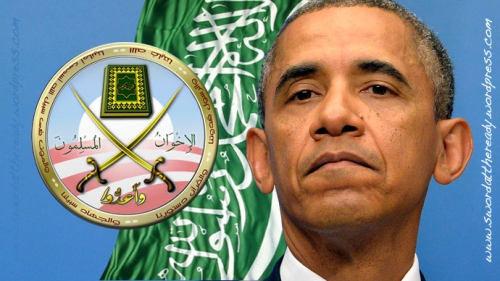
Muslim Brotherhood designs of America, Qatar and Turkey in Egypt and Syria: Kosovo to ISIS
Boutros Hussein, Noriko Watanabe and Lee Jay Walker
Ex: http://moderntokyotimes.com
President Obama laid the foundation stone of undermining Egypt based on shared Muslim Brotherhood designs to control the political landscape throughout a vast region. The political Islamic designs of Washington meant that a shared political Islamist view emerged between America, Qatar, Turkey and the Muslim Brotherhood.
Of course, in the scheme of events the Washington and Muslim Brotherhood allied view was based on controlling a vast area that would encompass Egypt, Libya, Syria and Tunisia. Turkey under Erdogan would enhance this dream and in turn this grand design would benefit greatly from Gulf petrodollars emanating from Qatar. However, the ruling powers in Syria under President Bashar al-Assad – and the emergence of President Abdel Fattah el-Sisi in Egypt – have both upset the planned Muslim Brotherhood venture.
The grand design emanated within the political elites of Ankara, Doha and Washington under Obama. Like usual, the United Kingdom would be utilized, for example the Tunisian Muslim Brotherhood connection, and this would be linked with various Muslim Brotherhood power bases throughout a vast region. Therefore, the Obama administration focused on its fixation with working closely with political Islam.
Indeed, it could be stated that the Obama administration is merely going one step further than past administrations in America. After all, the meddling of America – and other nations – in Afghanistan, Iraq and Libya all led to the growing rise of Sharia Islamic law and Islamization of society at all levels. The same America supported the rule of Islamic Sharia law in the early 1980s in Sudan whereby black African non-Muslims would become dhimmis.
The influences of the Muslim Brotherhood within the Obama administration was highlighted in early 2013 by the Investigative Project on Terrorism that reports: “The December 22 story was published in Egypt’s Rose El-Youssef magazine and was translated into English for the Investigative Project on Terrorism (IPT). The story suggests the six turned the White House “from a position hostile to Islamic groups and organizations in the world to the largest and most important supporter of the Muslim Brotherhood.”
The article continues by stating: “The six named people include: Arif Alikhan, assistant secretary of Homeland Security for policy development; Mohammed Elibiary, a member of the Homeland Security Advisory Council; Rashad Hussain, the U.S. special envoy to the Organization of the Islamic Conference; Salam al-Marayati, co-founder of the Muslim Public Affairs Council (MPAC); Imam Mohamed Magid, president of the Islamic Society of North America (ISNA); and Eboo Patel, a member of President Obama’s Advisory Council on Faith-Based Neighborhood Partnerships.”
Indeed, the current intrigues by America and the Muslim Brotherhood against Egypt is ongoing in 2015 based on a recent pro-Muslim Brotherhood delegation being invited into the corridors of power in Washington. Once more the Investigate Project on Terrorism reports “The delegation sought help in restoring former President Mohamed Morsi and the Muslim Brotherhood to power in Egypt. Morsi-era parliamentarians, government ministers and judges formed the Egyptian Revolutionary Council in Istanbul, Turkey last August with the aim of toppling Egypt’s military government. It is based in Geneva, Switzerland.”
The Investigative Project on Terrorism further reports that the delegation included “Abdul Mawgoud Dardery, an exiled Muslim Brotherhood member and Egyptian parliamentarian; and Mohammed Gamal Heshmat, an exiled member of the Muslim Brotherhood’s shura council and Egyptian parliamentarian.”
Therefore, even after Muslim Brotherhood supporters and other Islamists were involved in attacking Coptic Christians and burning churches this organization is still welcomed by the Obama administration. Also, political leaders in America are fully aware that the Muslim Brotherhood is working covertly with various Islamist organizations that are involved in terrorism in the Sinai and throughout Egypt. This applies to Muslim Brotherhood sympathizers and supporters in Egypt and the close relationship with Hamas, whereby militants are utilizing Gaza in order to destabilize the Sinai. Likewise, in Libya the Muslim Brotherhood, ISIS and various Islamist groups seek to usurp the political system and aim a dagger at the heart of Egypt. Similarly, just like supporters of the Muslim Brotherhood attacked Christian churches and Christians in Egypt, now ISIS is beheading and butchering Coptic Christians from Egypt in Libya.
Focusing on the Balkans, then despite all the propaganda, it is factual that in three wars in Europe involving Orthodox Christians and Muslims in Bosnia, Cyprus and Kosovo, the end products were that Ankara and Washington shared a similar interest. This reality meant that Muslim Turkey could swallow parts of Cyprus. Similarly, Kosovo would be taken from Serbia despite this part of Serbia being the Jerusalem of this nation. Therefore, with the Obama administration favoring the anti-Christian Muslim Brotherhood in Egypt, then clearly nothing changes because Islamization on both sides of the Mediterranean sums up the policies of Washington.
In other words, ISIS (IS – Islamic State) kills Christians, the Shia and Shabaks quickly. While the de-Christianization of Northern Cyprus and Kosovo took place on the watch of Ankara and Washington. Meanwhile, in modern day Syria indigenous Islam and Christianity are equally threatened by barbaric Takfiri forces being supported by Gulf and NATO powers.
However, unlike the Ankara and Washington agenda in the Balkans, the one notable aspect of the destabilization of Egypt, Libya, and Syria, is that Gulf and NATO powers are extremely confused. After all, the usual NATO and Gulf vultures have various geopolitical and religious plans. Given this reality, Libya is divided internally and external powers are now supporting two different power bases within this failed nation. Likewise, the outside plots against Syria highlight these geopolitical and religious divisions because various sectarian and Islamist terrorist groups are being supported based on different objectives. The only binding factor linking Gulf and NATO powers is that they have no qualms in creating failed states – irrespective if this applies to Afghanistan, Libya or Iraq. Not surprisingly, the Syrian government refuses to hand the nation over to outside nations that support chaos and destabilization. Likewise, the emergence of el-Sisi on the political scene in Egypt also meant that he refused to hand over the sovereignty of this nation to the usual players.
It appears that in the Balkans the United States and Turkey could easily carve up Orthodox Christian nations because Cyprus and Serbia had typical political systems. Likewise, American military power is designed to fight mechanized armies and to destroy the infrastructures of nations. This can be seen by the bombing of Serbia by NATO powers under the guidance of Washington and London. Similarly, the armed forces of Iraq and state institutions in this nation were soon taken over by America and various allies. However, America isn’t good at fighting insurgencies. Therefore, the Balkan Islamization policies of America and Turkey produced results in Kosovo and Cyprus based on the ghettoization of Orthodox Christianity and the ultimate demise of the indigenous culture.
 Yet, in Iraq, Libya, Egypt and Syria you have various regional nations and outside NATO powers (Turkey is a regional NATO power) that have different objectives. This reality is hindering the Muslim Brotherhood dream of America, Qatar and Turkey and this is clearly visible by the tenacity of Syria and the growing centralization of Egypt under el-Sisi. Therefore, while America, Qatar, Saudi Arabia and Turkey had no qualms in destabilizing Libya and Syria, the conflicting interests of so many nations is enabling a counter-revolution. This counter-revolution applies to Egypt and Syria fighting for independence because current political elites in both nations understand that failed states and subjugation awaits both nations if they fail.
Yet, in Iraq, Libya, Egypt and Syria you have various regional nations and outside NATO powers (Turkey is a regional NATO power) that have different objectives. This reality is hindering the Muslim Brotherhood dream of America, Qatar and Turkey and this is clearly visible by the tenacity of Syria and the growing centralization of Egypt under el-Sisi. Therefore, while America, Qatar, Saudi Arabia and Turkey had no qualms in destabilizing Libya and Syria, the conflicting interests of so many nations is enabling a counter-revolution. This counter-revolution applies to Egypt and Syria fighting for independence because current political elites in both nations understand that failed states and subjugation awaits both nations if they fail.
It is noticeable that ISIS emerged strongly in Iraq after Obama pulled the armed forces of America out of this nation. Likewise, the destabilization of Syria enabled ISIS, al-Nusra and various other sectarian and Takfiri forces to emerge. While this took place, the Syrian Muslim Brotherhood became a willing tool of the Obama’s administration outreach project that received a boost because of similar intrigues emanating in Qatar and Turkey. However, while Saudi Arabia and other Gulf players are on board in the destabilization of Syria; the same Gulf nations differ from America, Qatar and Turkey because they don’t want to see the Muslim Brotherhood gain in power in Egypt and Jordan.
The recent crisis in Libya highlights that Egypt wants to clampdown on terrorist and Takfiri forces that seek to turn this nation into a dagger at the heart of regional nations. This emanated with Egyptian military attacks targeting ISIS bases in Libya after the brutal murders of Egyptian Coptic Christians. However, while Egypt wants the international community to support non-Islamist factions in this nation and to attack various terrorist groups, it is noticeable that this was met with silence from America, Qatar and Turkey. Therefore, while Washington is continuing to talk with pro-Muslim Brotherhood elements – and with being aloof about the current crisis in Libya – it appears that intrigues against Egypt are ongoing.
At the same time, America, Qatar and Turkey are behind another new terrorist and sectarian force being trained and armed against Syria. This is despite the fact that all minorities will face systematic persecution if an Islamist movement overthrows the current government of Syria.
In other words, Ankara, Doha and Washington all seek to usurp the Middle East and North Africa – just like they did in the Balkans – in order to shape the region based on their geopolitical ambitions. Therefore, in order to achieve this, these three nations all favor the Muslim Brotherhood.
Indigenous Islam, just like Orthodox Christianity in Northern Cyprus and Kosovo, means little to America, Qatar and Turkey when it comes to geopolitical concerns. This reality means that these three nations seek to utilize political Islam based on the deeds and ambitions of the Muslim Brotherhood throughout parts of North Africa and the Levant.
Egypt and Syria therefore are on the frontline in preserving independence when it comes to the Middle East. Also, with ISIS and links with Qatar and Turkey being fully known, then the fear in Egypt is that outside nations may manipulate Takfiri forces just like the same nations – and others – have done against Syria.
http://www.investigativeproject.org/3884/report-egypt-muslim-brotherhood-infiltrated-obama
Modern Tokyo News is part of the Modern Tokyo Times group
http://moderntokyotimes.com Modern Tokyo Times – International News and Japan News
00:05 Publié dans Actualité | Lien permanent | Commentaires (0) | Tags : frères musulmans, obama, états-unis, modne arabe, monde arabo-musulman, turquie, qatar, moyen orient, proche orient, levant, politique internationale |  |
|  del.icio.us |
del.icio.us |  |
|  Digg |
Digg | ![]() Facebook
Facebook
IWO JIMA: Chanson pour la défense
|
|
IWO JIMA: Chanson pour la défense
00:05 Publié dans Histoire | Lien permanent | Commentaires (0) | Tags : histoire, japon, iwo jima, armée japonaise, deuxième guerre mondiale, seconde guerre mondiale |  |
|  del.icio.us |
del.icio.us |  |
|  Digg |
Digg | ![]() Facebook
Facebook
Les kamikazes japonais

Les kamikazes japonais
Ex: http://metapoinfos.hautetfort.com
« Je me suis levé à 6 heures ce matin pour respirer l’air pur de la montagne. Et tout ce que je ferai aujourd’hui le sera pour la dernière fois. » Tsuka Akio, avant de s’envoler pour une mission kamikaze au large d’Okinawa, le 28 avril 1945.
Les éditions Flammarion viennent de publier Kamikazes, une étude historique signée par Constance Sereni et Pierre Souyri. Les deux auteurs sont universitaires et spécialistes de la culture japonaise. On doit notamment à Pierre Souyri Une Histoire du Japon médiéval (Tempus, 2013).

Kamikazes, ou la chronique d’une mort ordonnée
Automne 1944. Le sort du Japon en guerre semble désormais scellé face à la déferlante militaire américaine. Le pays résiste encore mais il faudrait maintenant un vrai miracle pour vaincre l’Amérique. Dépourvu d’armes miracle, l’état-major nippon met alors sur pied des unités spéciales d’attaque.
Des pilotes choisis et entraînés pour aller se jeter contre des cibles militaires américaines. Des pilotes baptisés kamikazes (vent divin) transformés en bombes humaines. Dans la propagande japonaise, ces hommes, volontaires pour mourir pour la gloire du Japon, sont présentés «comme la réincarnation des samouraïs qui perdaient la vie par fidélité, tels des pétales de cerisier qui se dispersent au vent.»
Mais la réalité était-elle conforme à la légende, véhiculée par les écrits et le cinéma? Une question qui sert de fil rouge à ce document historique publié chez Flammarion et rédigé par Constance Sereni et Pierre-François Souyri, deux enseignants spécialistes de la culture japonaise. Deux auteurs qui retracent l’historique de cette arme désespérée, bien loin de l’image d’Epinal du pilote obéissant, fier de donner sa vie. Comme ils le rappellent, la mission des kamikazes est unique dans l’histoire militaire, car dépourvue de cet élément présent dans les missions les plus dangereuses : l’espoir, même ténu, de revenir vivant.
«Ce n’était pas une mission avec une chance sur dix d’en revenir. C’était une mission zéro sur dix.»Bien documenté, l’essai n’est pas un livre de guerre. Il constitue plutôt un ouvrage qui voyage entre histoire et sociologie. Il retrace en bref toute la campagne du Pacifique, certes, mais pour expliquer la folle motivation des créateurs de cette arme. On s’attarde davantage sur le gros chapitre lié à l’endoctrinement de ces pilotes qui ne furent pas tous, loin de là, des soldats fanatisés.
Des pilotes qui furent entraînés, endoctrinés en sept jours. Ni plus, ni moins. Peu formés, ils vont souvent manquer leurs cibles par erreur de pilotage ou par confusion des objectifs. Les navires de transport alliés seront souvent confondus avec des navires militaires. Déjà fortement diminuée par le «grand tir aux pigeons des Mariannes», une bataille disputée en août 1944 et dans laquelle le Japon a perdu le tiers de ses porte-avions, l’aviation japonaise va ponctionner plusieurs milliers de pilotes supplémentaires pour les utiliser comme kamikazes, lors de missions sans retour. Prévue comme une solution temporaire, cette arme du pauvre sera utilisée jusqu’en août 1945. Soit 10 mois de sacrifices.
Avec quel bilan ? Côté japonais, on estime les pertes à plus de 3.800 pilotes tués, pour 60 navires américains coulés et 6.830 soldats alliés tués. Des chiffres toujours imprécis aujourd’hui.
Mais force est de constater que cette tactique, absente de la philosophie occidentale, a provoqué une sacrée psychose à bord des navires américains.
Quand la DCA échouait à abattre le kamikaze, il ne restait plus que le miracle pour sauver sa peau. Si les marins américains considéraient les Japonais comme des tueurs et des imbéciles, les analystes de l’US Navy avaient un avis bien différent. «L’avion suicide était de loin l’arme la plus efficace inventée par les Japonais contre les vaisseaux de surface. Alors qu’ils n’ont été utilisés que sur une période de 10 mois, les avions suicide ont été responsables de 48,1% de tous les dégâts infligés à des navires de guerre américains, et de 21,3% des bâtiments coulés pendant la guerre» soulignent-ils.
Créée pour retarder la fin de la guerre, cette «détermination suicidaire des Japonais» a, au contraire, précipité la fin du conflit avec l’usage du feu nucléaire, les 6 et 9 août 1945. À noter, enfin, le cahier photographique qui permet de mettre un visage sur ces kamikazes, parfois très jeunes. Comme ce pilote, âgé d’à peine 17 ans et envoyé à la mort, sans regret. Comme bien d’autres, et dont on peut lire les dernières lettres en guise d’épilogue à ce document qui ouvre un large pan sur la culture japonaise. Dans laquelle domine notamment la culture de la mort et la notion de sacrifice. «Comment imaginer, explique le duo d’auteurs, que, lancés dans leur machine folle, certains d’entre eux devaient hurler en appelant leur mère, ou tout simplement fermer les yeux lors du dernier instant avant le choc. Ce furent des victimes du système autant que des héros, qui sont morts, le corps broyé dans leurs machines.»Kamikaze. Un terme toujours d’actualité mais galvaudé par les médias. Comme l’explique une petite parenthèse qui remet fort justement les pendules à l’heure. Dans les attentats au Moyen-Orient ou ailleurs, les journalistes baptisent, à tort, les terroristes de kamikazes car ils se suicident dans leur action. Un usage erroné du terme qui énerve les Japonais, qui parlent plutôt de jibaku (ceux qui se font exploser). Les kamikazes, à l’inverse des terroristes, n’ont quant à eux jamais attaqué de cibles civiles, sans défenses. Ils ont, par ailleurs, obéi à un ordre en temps de guerre. Une précision bien nécessaire pour saluer la mémoire de ces pilotes envoyés à la mort dans leurs cercueils volants. «Il est difficile d’imaginer pire gâchis d’une jeunesse sacrifiée.»
Philippe Degouy (L'Echo, 19 février 2015)
00:05 Publié dans Histoire | Lien permanent | Commentaires (0) | Tags : histoire, seconde guerre mondiale, deuxième guerre mondiale, kamikazes, aviation japonaise, japon |  |
|  del.icio.us |
del.icio.us |  |
|  Digg |
Digg | ![]() Facebook
Facebook
Ökonom Paul Collier plädiert für eine völlig neue Migrationspolitik

Ex: http://www.unzensuriert.at
Foto: UNU-WIDER/flickr (CC BY 2.0)
Der angesehene britische Ökonom Paul Collier warnt in einem Interview mit der deutschen Zeitung Die Zeit vor einer komplett verfehlten Migrationspolitik Europas. Der Oxford-Professor versteht das Misstrauen der Bevölkerung gegenüber Migranten und warnt vor falschen Tabus in der Gesellschaft.
Politik ignorierte Migrationsdebatte
Collier kritisiert in dem Interview vor allem die fehlende Migrationspolitik in vielen Staaten Europas. Es wurde jahrzehntelang verabsäumt, das Thema in der Mitte der Gesellschaft, abseits jeglicher Radikalisierung zu thematisieren. Diskussionen, ob Migration gut oder schlecht sei, hält der Professor für verkürzt und nicht zielführend. Die Lebenssituation veränderte sich für viele Einheimische durch die massenhafte Zuwanderung derart rasch, dass dieses Phänomen wiederum berechtigte Ängste schürte. Die Politik müsse eher der Frage nachgehen, wieviel Migration sowohl für Ziel- als auch Herkunftsländer am besten sei.
Soziale, nicht ökonomische Folgen bei Zuwanderung beachten
Dass immer mehr Forscher durch ökonomische Studien belegen wollen, ob sich Zuwanderung rechnet oder nicht, lehnt Collier ebenfalls ab. Wichtiger seien die sozialen Folgen für die Gesellschaften. Nimmt die Einwanderung überhand, führe dies automatisch zu Spannungen und negativen Begleiterscheinungen. Denn in einer zu pluralistischen Gesellschaft sei es erwiesenermaßen schwieriger, gegenseitiges Vertrauen und Kooperation aufzubauen, insbesondere mit dem Blick auf Sozialsysteme, welche auf diesen Faktoren beruhen. Aufgabe der Politik sei es, einen gesellschaftlichen Diskurs über das Maß an Einwanderung zu leiten.
Demographieprobleme nicht durch Einwanderung zu lösen
Eine weitere Aufgabe der Politik sei es, zuerst die Probleme der niedrigen Geburtenraten und deren Ursachen im Land anzugehen, anstatt diese durch Migration lösen zu wollen. Dadurch verhindere man auch die wirtschaftliche Entwicklung der Staaten, aus welchen die Migranten kommen, da sie dort irgendwann fehlen.
Eine konsequente Einwanderungspolitik sei somit wichtiger als je zuvor, denn gerade die Menschen in ärmeren Ländern wünschen sich heutzutage nichts sehnlicher, als in den „reichen Westen“ zu emigrieren. Anfangen müsste Europa laut Collier mit einer strengeren Selektion bei den Asylverfahren und einer Auslagerung dieser in die Orte der Abreise und nicht der Ankunft.
00:05 Publié dans Actualité, Affaires européennes | Lien permanent | Commentaires (0) | Tags : immigration, paul collier, europe, affaires européennes, politique internationale |  |
|  del.icio.us |
del.icio.us |  |
|  Digg |
Digg | ![]() Facebook
Facebook
Presseschau - März 2015 - LINKE / RECHTE

00:05 Publié dans Actualité, Affaires européennes | Lien permanent | Commentaires (0) | Tags : presse, journaux, médias, allemagne, politique internationale, europe, affaires européennes |  |
|  del.icio.us |
del.icio.us |  |
|  Digg |
Digg | ![]() Facebook
Facebook
Babel and the Capitalist Babelization
Babel and the Capitalist Babelization
Tom Sunic
Review of Babel Inc.: Multiculturalism, Globalisation, and the New World Order
by Dr. Kerry Bolton
Black House Publishing Ltd, 2013
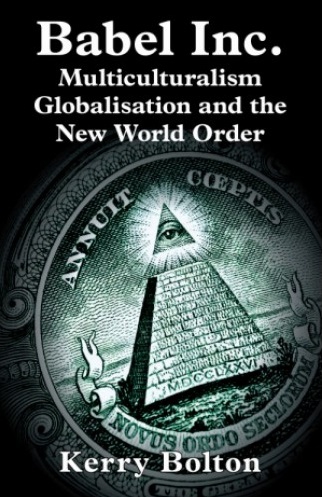 The tower of Babel is rightly used as a metaphor for contemporary rootless and mongrelized masses stashed together in the towering inferno of end times. As an allegory, however, the process of “babelization” signifies a distorted reality and an inhumane political process in which standard forms of cognition and speech are subject to entirely new denominations, requiring a completely different method of conceptualization. Attempting, therefore, to draw some parallels between George Orwell’s 1984 and Bolton’s Babel Inc., cannot be valid; Orwell’s vision of the static future has become outdated. Bolton’s Babel Inc. offers, instead, a dynamic description of the process of capitalist entropy in which Babel Inc. and its ruling class continue to grind human beings, including themselves, to dust.
The tower of Babel is rightly used as a metaphor for contemporary rootless and mongrelized masses stashed together in the towering inferno of end times. As an allegory, however, the process of “babelization” signifies a distorted reality and an inhumane political process in which standard forms of cognition and speech are subject to entirely new denominations, requiring a completely different method of conceptualization. Attempting, therefore, to draw some parallels between George Orwell’s 1984 and Bolton’s Babel Inc., cannot be valid; Orwell’s vision of the static future has become outdated. Bolton’s Babel Inc. offers, instead, a dynamic description of the process of capitalist entropy in which Babel Inc. and its ruling class continue to grind human beings, including themselves, to dust.
Which are these ruling classes in this Babel Inc.? This is where the author masterfully steps in and rejects the wide-spread right-wing babble about the Babel Inc. being allegedly run by a conspiratorial and homogenous group of wicked people, or some extra-terrestrial golems allegedly bent on ruling the White world. Rather, the Babel Inc., or simply put, the System, resembles a nameless, albeit grotesque polity that can in no way be reduced to just one single free-lance Orwellian big brother or some big postmenopausal feminist mama. The Babel Inc., as Bolton sees it, is a logical postmodern transposition of the myth of economism and egalitarianism, two doctrines whose genealogy can be traced from well before the period of Enlightenment in Europe.
Twin Brothers: Communism and Capitalism
This does not mean at all that Bolton avoids elucidating the mindset and the self-perception of the main movers and shakers in the Babel Inc. In fact, Bolton’s scholarly credibility can best be spotted through the wealth of bibliographic references which indicate the intellectual depth of this effort. Bolton uses a three- pronged approach: theoretical, historical and descriptive. Such a threefold approach to this heavy subject is a prime necessity if the book is to retain a lasting educational value. Thus we learn in the first half of his book that capitalism, being a prime factor in the construction of the modern Babel Inc. and in the deconstruction of the nation-state, has always been a “modern and revolutionary” force. Its inherent dynamics aims at destroying traditional communities, regardless of their spot on the planet Earth. In fact, the much decried and alleged foe of capitalism (or rather its mirror- image), communism, fell apart in the East, in the late 20th century, because its paleo-communistic goals of egalitarianism and economism had already been better achieved in the capitalist West. Both communism and capitalism share a common ideological thread, namely a common belief in progress and common hatred of all racial, ethnic and territorial identities. The Banker and the Merchant, just like their mirror-image the Commissar, detect in any historical rootedness, in any national or racial consciousness a major hindrance on the way to the glorious future under the banner of “free market, democracy and human rights”.
Photo: Kerry Bolton
 On the daily political front, however, or better yet within the historical context of the development of the Babel Inc., Bolton does not spare the names of organizations and individuals promoting the borderless and globalist Babel Inc. project; knowledge of these forces can help the uninitiated reader dispel the myth of a “freedom- loving West” and its main transmission belt the United States of America. In fact, as Werner Sombart, the German sociologist of the early 20th century noted, “Holy Economy” (“heilige Wirtschaftlichkeit”) is a far more powerful revolutionary process than any anarchistic get together or a communist rabble-rousing pamphlet.
On the daily political front, however, or better yet within the historical context of the development of the Babel Inc., Bolton does not spare the names of organizations and individuals promoting the borderless and globalist Babel Inc. project; knowledge of these forces can help the uninitiated reader dispel the myth of a “freedom- loving West” and its main transmission belt the United States of America. In fact, as Werner Sombart, the German sociologist of the early 20th century noted, “Holy Economy” (“heilige Wirtschaftlichkeit”) is a far more powerful revolutionary process than any anarchistic get together or a communist rabble-rousing pamphlet.
The author starts with his home turf with an examination of the early Australian working class, which under the banner of the Labor Party, as early as the 19th century, was bit by bit defrauded by the bankers and speculators who were all too eager to open Australia to Asian migrants and thus drive down the wages of white local workers. The loudest advocates, and later on the beneficiaries of the process of the so-called decolonisation in Asia and Africa, were not just Marxist professors in Western academe, or Soviet Cold War apparatchiks, but primarily international big businessmen, “as old empires had become too restive to capitalism.” The author well illustrates this point by looking at the tragic fate of South Africa and Rhodesia, once upon a time White-ruled countries which used to be the bread basket of Africa, only to turn into violence-torn African basket cases with no future in sight. The iconic figure of the ANC, the Black activist Nelson Mandela, still hailed by starry-eyed globalists as the canonized Black Saint, once upon a time was determined to kick capitalism out of South Africa, only to declare in 1996, that is to say, after South Africa had already turned into an ungovernable entity, that “privatisation is the fundamental policy of the African Nation Congress and will remain so.”
The American government, The Trilateral Commission, along with many self-proclaimed humanitarian NGOs, such as the famed George Soros’ Open Society Institute, behind their mask of lacrimal multiculturalism and behind their culinary diplomacy, have been the main motors in turning Asia and Africa into a giant pool of cheap labor and permanent political unrest. This is the true goal of Babel Incorporated. Hence the first conclusion one can draw after completing reading the first half of the book, and just before one starts railing and ranting against colored immigrants flooding now Europe and the USA: Massive non-White immigration, and now its reverse side, i.e. the colonisation of Europe and the USA, is just a logical outcome of political designs framed long time ago by rootless plutocrats and their leftist acolytes.
Bolton does not forget to look at the importance of “culture wars” and notes how global plutocrats use those wars in an attempt to subvert recalcitrant governments all over the word. Contrary to false presumptions, still strongly held by many right-wing intellectuals, the “uncultured” USA plutocrats have been very slick in fostering the multicultural “American dream” by resorting beforehand to the creation of a myriad of “independent” cultural outlets and think tanks in the target countries. One could enumerate a dozen post-communist countries in Eastern Europe which, in the mid- 90’s and early 2000’s, were all subjected to the Babel Inc.-inspired “velvet” and “rainbow” revolutions, as well as the so- called “Arab spring revolutions.” In an attempt to destroy a sense of national and racial pride and in an effort to impose a hybrid mishmash of new consumer species — i.e., homo consumens — the Babel Inc. decision makers do not need to send F14s to the Serbian skies or over the Iraqi desert, but instead resort first to Hollywood imagery and hip-hop political acrobatics in order to enchant the youth of the target country. The costs are negligible; the benefits are great.
The author rightly sees that before Whites start bewailing the destructive consequences of forced multiculturalism and its inevitable corollary of non-White immigration flooding their countries, they must critically re-examine the now redundant notion of their own nation-state. It is fundamentally wrong to blame all our ills on the SPLC, or the ADL, or the LICRA, or the Trilateral Commission, or some real or hypothetical Jew, or some hostile, plutocratic, culture-destroying Babel Inc. elites only. We White Europeans and Americans must accept our full share of the blame. We must first and foremost reject the religion of progress and its underlying principle of permanent economic growth, before considering setting up our own ethnic enclaves. Whether these ethnic enclaves are in the Northwest of the U.S., or in Orania in South Africa, or somewhere in Europe, they must keep capitalism on a short leash aimed at preserving the racial/ethnic integrity of these enclaves, as occurred under the White Australia policy and the 1924 immigration restriction law in the U.S. Given the still strong and age-old squabbles among and amidst European peoples, this nearly impossible task can only be bestowed upon dispassionate White individuals capable of transcending their own narrow tribal interests — and their own egos.
Dr. Tom Sunic (www.tomsunic.com) is a writer and a board member of the American Freedom Party.
00:05 Publié dans Livre, Livre, Nouvelle Droite | Lien permanent | Commentaires (0) | Tags : tomislav sunic, kerry bolton, babel, babelisation, livre, nouvelle droite |  |
|  del.icio.us |
del.icio.us |  |
|  Digg |
Digg | ![]() Facebook
Facebook
Dresden and Poznan: Two Different Ways to Wage War

Dresden and Poznan: Two Different Ways to Wage War
|
Ex: http://www.strategic-culture.org |
|
The Red Army and British-American forces had one enemy - the German Wehrmacht but quite often they waged different wars. The liberation of Polish city of Poznan by Red Army and the bombing of Dresden by allies – one event following another in a week - took place 70 years ago, February 1945. These examples provide a good illustration to support the point of view stated above.
During the Vistula-Oder Offensive the 1st Belarussian Front under the command of Marshal Georgi Zhukov Marshall, the «Hero of the Soviet Union», managed to secure two bridgeheads west of the Vistula River between 27 July and 4 August 1944 opening the way to Berlin. The concentrations of German forces were left blocked but not defeated at Schneidemüh and Poznan. With the main forces continuing advance in the western direction, it took time and effort to rout the German grouping at Poznan. General Vasily Chuikov, the commander of the 8th Army (to become later Marshall of the Soviet Union) was responsible for the operation planned to smash the enemy forces there. In his memoirs he said the Germans-built fortifications were classic Vauban-style fortresses (Sébastien Le Prestre de Vauban was a Marshal of France and the foremost military engineer of his age, famed for his skill in both designing fortifications and breaking through them). The design envisioned the construction of underground forts in the center and citadels at the junctures to accommodate a large garrison… In Poznan the city and fortifications were strongly defended and integrated into a single defence plan to coordinate fire. The Fort Winiary citadel stood on a hill to the north of the city centre. Around the perimeter of the city were 18 massively-built forts spaced at intervals of about 2 kilometres in a ring with a radius of about 5 kilometres. General Chuikov described the forts as «...underground structures each with several storeys, the whole projecting above the surrounding terrain. Only a mound was visible above ground -- the layer of earth covering the rest. Each fort was ringed by a ditch ten metres wide and eight metres deep, with walls revetted with brickwork. Across the ditch was a bridge, leading to one of the upper storeys. Among the forts, to the rear, there were one-storey brick bunkers. These were clad in concrete almost a full metre thick, and were used as stores. The upper works of the forts were sufficiently strong to provide reliable protection against heavy artillery fire... the enemy would be able to direct fire of all kinds against us both on the approaches to the forts and within them, on the rampart. The embrasures were such that flanking fire from rifles and machine-guns could be directed from them». Together with Volkssturm (a German national militia of the last months of World War II) Poznan was defended by a 60 thousand-strong garrison. The offensive started early in the morning on January 26. The first strike was delivered from the south. It was unexpected by the enemy. Two southern forts were seized on the Warta River’s western bank. As a result, the troops and tanks penetrated the ring of forts to attack the enemy from behind. The attack from the north produced little results. The Soviet troops did not attack from the west. Chuikov remembers that there was a way out left on purpose to let the enemy withdraw from the city-fortress. But Germans did not leave. A long and hard battle was ahead. On January 28, another attack was launched. Chuikov addressed the German troops surrounded in Poznan to put forward an ultimatum. It read «Officers and soldiers of the Poznan garrison. You are surrounded. There is no way you can leave the city. I, General Chuikov, offer you to immediately lay down your arms and surrender. I guarantee life and return home after the war is over. Otherwise you’ll be wiped out. The death of civilians in Poznan will be your responsibility. Do not hesitate. Raise white flags and come to our side. General Chuikov». But the garrison had no intention to surrender. Soviet aviation and artillery delivered strikes at fortifications trying to avoid damage to the buildings inside the city and avoid casualties among civilians. The Fort Winiary citadel was ruined. The soldiers hid underground.
By February 5 the assault teams fully had liberated the residential areas. After February 12 the Fort became the main target. As the Soviet troops approached, the resistance grew. The 5-8 metre high brick walls protected the enemy preventing tanks from advance. Heavy artillery pieces were moved near to fire at the Fort from the distance of 300 metres. But even 203mm projectiles did not inflict much damage to the thick walls. At the time the 1st Belarus Front forces moved to the west reaching the Oder. The general assault started on February 18 to last without stop for four days. Having built an assault bridge, Red Army tanks and assault guns of the 259th and 34th crossed into the main grounds of the citadel early at 3 o’clock on 22 February commencing the final struggle for the old fortress. The groups of 20-200 men started to surrender. Only 12 thousand troops remained out of 60 thousand strong garrison. The bloody fighting ended on February 23, 1945, the day of the 17 anniversary of the Red Army. 224 artillery pieces fired 20 salvos to salute the victory. Here is the example of war waged by allies. On February 13-15, they delivered air strikes against Dresden with the inflicted damage comparable with Hiroshima and Nagasaki attacks. Americans called the operation «Thunderstrike». Who was it targeted against? The city had no significant defence industry facilities and was flooded with refugees. A Royal Air Force (RAF) memo issued to airmen on the night of the attack said: «Dresden, the seventh largest city in Germany and not much smaller than Manchester is also the largest unbombed builtup area the enemy has got. In the midst of winter with refugees pouring westward and troops to be rested, roofs are at a premium, not only to give shelter to workers, refugees, and troops alike, but to house the administrative services displaced from other areas». Why raze to the ground a city that had no substantial importance for the war effort? The very same memo was rather cynical about it. It read «The intentions of the attack are to hit the enemy where he will feel it most, behind an already partially collapsed front... and incidentally to show the Russians when they arrive what Bomber Command can do». That’s what RAF really did by bombing from safe altitude the city flooded with demoralized people.
As the end of war was approaching the British-American aviation started to more frequently deliver politically motivated strikes destroying cities of no significance for German war effort to be soon liberated by Red Army, for instance Prague, Sofia etc. Dresden is the brightest example of how this vicious tactics was employed. The devastated area in Dresden exceeded 4 times the devastated area of Nagasaki. 1,500-degree heat hit the larger part of the city. People running to reach city’s outskirts fell into melting asphalt. Smoke was 45 metres high. At least 25 thousand died. Some experts say the death toll was as high as 135 thousand. Günter Wilhelm Grass, a German writer and recipient of the 1999 Nobel Prize in Literature, called the bombing a war crime. This point of view is supported by many. Dr. Gregory Stanton, president of Genocide Watch, expressed himself more bluntly saying the Allied firebombing of Dresden and the nuclear destruction of Hiroshima and Nagasaki were war crimes and also acts of genocide. |
00:01 Publié dans Histoire | Lien permanent | Commentaires (0) | Tags : histoire, posen, poznan, dresde, dresden, deuxième guerre mondiale, seconde guerre mondiale |  |
|  del.icio.us |
del.icio.us |  |
|  Digg |
Digg | ![]() Facebook
Facebook
vendredi, 06 mars 2015
Troisième Voie sur Radio Courtoisie
14:11 Publié dans Actualité | Lien permanent | Commentaires (0) | Tags : actualité, troisième voie, radio courtoisie, événement, france, paris, gabriele adinolfi |  |
|  del.icio.us |
del.icio.us |  |
|  Digg |
Digg | ![]() Facebook
Facebook
L'américanité ou l'Europe...

L'américanité ou l'Europe...
Ex: http://metapoinfos.hautetfort.com
Nous reproduisons ci-dessous un point de vue de Diego Fusaro, cueilli sur le site du Cercle Aristote et consacré à la domination qu'exerce les États-Unis sur l'Europe. Professeur d'histoire de la philosophie à l'université de Milan et déjà auteur d'une dizaine d'essais, Diego Fusaro est considéré comme le principal disciple de Costanzo Preve, mort en 2013.
L'américanité ou l'Europe
Après la disparition des systèmes socialistes sous les décombres du Mur de Berlin (9 novembre 1989), et l’élimination subséquente de toute alternative politique digne de ce nom, l’ancien dilemme de Novalis « L’Europe ou la chrétienté » (de l’ouvrage du même titre) s’est reconfiguré sous les traits d’une alternative perverse et macabre : celle de « l’américanité ou l’Europe ».
La puissance sortie victorieuse de la Guerre froide a depuis lors renforcé ce processus délétère d’américanisation intégrale du « Vieux Continent », déjà entamé à partir de 1945. Cela s’est manifesté notamment dans la culture, non seulement celle de masse, avec l’américanisation de la musique populaire, mais aussi la culture scolaire, qui a subi toute une restructuration capitalistique de son logiciel, et qui s’est dès lors vu de plus en plus façonner sur le modèle entrepreneurial, selon la logique « dettes/crédits », faisant ainsi des professeurs des managers, et des étudiants des apprentis-consommateurs. Cela s’est également manifesté dans les politiques sociales, au travers de la démolition du système européen d’assistanat.
De fait, dans l’histoire récente de l’Europe, de la chute du Mur jusqu’à l’implosion de l’Union soviétique (peut-être la plus grande tragicomédie géopolitique du XXe siècle), plusieurs événements successifs sont venus alimenter un plus vaste processus de substitution paradigmatique du modèle américain, fondé sur un capitalisme dépourvu de toute base éthique, au modèle européen, qui s’était lui constitué en haute lutte comme équilibre entre le capitalisme, le Welfare state et de solides fondations axiologiques. Aujourd’hui, on voit l’Europe devenir de plus en plus un protectorat américain, les États européens étant aux États-Unis ce qu’étaient les satellites du pacte de Varsovie vis-à-vis de l’URSS et de sa ligne de conduite marxiste.
Dernière manifestation en date de ce scénario scandaleux, la stupeur déclenchée il y a quelques temps lors des révélations sur les pratiques obscènes d’espionnage des États-Unis à l’égard de leurs prétendus « alliés » (dans les faits leurs subordonnés). Mais en réalité, pourquoi tant de stupeur ? Est-ce une nouveauté que cette absence de relation inter pares entre les États européens et les États-Unis ? Qu’y a-t-il d’exceptionnel à cela ? Fallait-il s’attendre à ce que l’Empire du Bien traitât l’Italie, l’Allemagne, et l’Espagne comme des États libres et égaux à lui ?
La « Quatrième Guerre mondiale » [1] (selon le concept de Costanzo Preve, sur la séquence historique qui s’étend de 1991 à nos jours) a vu la puissance américaine systématiquement entrer en lutte contre les forces qui résistaient à sa domination ; et, aussi bien avec l’Irak en 1991 qu’avec la Libye en 2011, l’on a vu à chaque fois ses soi-disant « alliés » se retrouver acculés à servir leur maître en prenant activement part à ses agressions impérialistes. L’on songe ici à ce que Carl Schmitt écrivait déjà en son temps dans La notion de politique (1927) : « Si, sous forme de sentence ou de quelque autre manière, un peuple se laisse prescrire par un étranger l’hostis (l’ennemi) qui doit être le sien, contre lequel il lui est permis ou interdit de combattre, c’est qu’alors il n’est plus un peuple politiquement libre, mais un peuple satellisé ou subordonné à un autre système politique ». Ces mots sont à l’image de l’Europe actuelle.
Il apparaît chaque jour plus évident que cet État sorti vainqueur de la Guerre froide, qui œuvre aujourd’hui à la stigmatisation de toute contre-puissance se refusant à subir sa domination et sa vision du monde (elle se voit alors immédiatement condamnée comme rogue State, « État voyou »), repose sur une culture impérialiste foncièrement incompatible avec la perspective d’un véritable rapport à l’Autre : qu’elle le présente sous les traits du « terrorisme » ou de la « dictature », ou qu’elle le range avec mépris dans le champ du « Rest of the world », dans tous les cas, elle se refuse a priori à lui accorder la moindre légitimité. Cette règle n’épargne pas les États Européens : dans l’horizon de l’idéologie impériale américaine, ces derniers ont le droit d’exister tout au plus comme protectorat de la Mère-Patrie.
A cette caractéristique, que l’on retrouve dans presque toutes les formes d’impérialisme de l’Histoire, doit être rajoutée une autre : le facteur explicatif majeur que constitue en soi la prégnance aux États-Unis du protestantisme puritain d’origine vétérotestamentaire. Telle est l’idéologie qui alimente la « monarchie universelle » [2] américaine : sous sa caution, les Américains tendent naturellement à se concevoir comme le « Peuple élu », si ce n’est même comme la seule nation digne de ce nom, entraînant par là des conséquences désastreuses sur la vie internationale.
« America stands as the world’s indispensable nation », pouvait-on entendre dans le discours de Bill Clinton du 20 janvier 1997. Si l’Amérique est la seule nation indispensable au monde, alors toutes les autres ne sont plus bonnes à exister que comme ses colonies, au mieux ses subordonnées.
Porte-drapeau d’une « Special mission » qui lui aurait été assignée par Dieu, « l’Empire du Bien » étiquette immédiatement comme « terroristes » toutes les formes de résistance que peuvent lui opposer les peuples opprimés ou les États (de l’Iran à Cuba, en passant par la Corée du Nord jusqu’au Venezuela), qui, malgré des contradictions internes parfois très lourdes, ne se plient pas au diktat de la mondialisation capitaliste. Par leur positionnement géostratégique courageux, ces derniers rappellent ainsi aux Européens que résister est encore possible (pour prendre à-rebours le titre du peu glorieux best-seller de Walter Sitti : Résister ne sert à rien).
Dans une opposition revendiquée aux chantres du Politiquement correct et à nos éternels « repentis », toujours prompts à discréditer comme pure nostalgie la récupération des catégories de pensée à même de déceler les contradictions de notre temps, la revivification de la critique de l’impérialisme est aujourd’hui d’une importance vitale. Face aux stratégies manipulatoires de la propagande officielle, capable de déclarer à son gré telle ou telle perspective critique comme complètement dépassée, l’impérialisme est aujourd’hui plus vivant que jamais – et que, par son pouvoir d’adaptation, il se soit métamorphosé sous un nouveau visage, compatible avec l’idéologie mondialiste, n’y change rien – ; face à lui, la tendance à le disqualifier comme une catégorie politique désuète révèle une volonté mal cachée d’anesthésier toute critique en faisant passer pour mort l’objet pourtant bien vivant sur lequel elle est censée s’exercer.
Comme Voltaire en son temps, nous n’aurons de cesse de le répéter : il ne pourra y avoir de démocratie en Europe tant que son territoire sera sous l’emprise de bases militaires états-uniennes. Il ne pourra y avoir d’Europe sans souveraineté géopolitique. Il ne pourra y avoir d’Europe démocratique d’États libres et égaux tant que le « Vieux Continent » continuera d’exister comme simple protectorat d’une monarchie universelle, ou simple pion de l’Eurocratie en place. S’étonner qu’une telle affaire d’espionnage ait pu avoir lieu est un privilège de vierges effarouchées. Il faut, au contraire, s’appliquer à éliminer à la racine les conditions qui rendent possibles des scandales comme celui-ci.
Diego Fusaro (Cercle Aristote, 26 février 2015)
Notes :
Texte original en italien : Diego Fusaro, « Americanità o Europa », Lo Spiffero, Pubblicato Lunedì 08 Luglio 2013.
[1] Constanzo Preve, La Quatrième Guerre mondiale, éd. Astrée, 2008, trad. 2013. Disponible sur : http://www.editions-astree.fr/BC/Bon_de_commande_Preve.pdf
[2] On se réfère ici à l’« Universal monarchie » mentionnée par Kant dans son Projet de paix perpétuelle (1795)
00:10 Publié dans Actualité, Affaires européennes | Lien permanent | Commentaires (0) | Tags : diego fusaro, américanisme, européisme, europe, affaires européennes, politique internationale |  |
|  del.icio.us |
del.icio.us |  |
|  Digg |
Digg | ![]() Facebook
Facebook
La désincarnation du monde, ou la théorie du genre

La désincarnation du monde, ou la théorie du genre
par Mathieu Bock-Côté
Ex: http://www.lesobservateurs.ch
Mathieu Bock-Côté revient sur plusieurs incidents dont nous avons déjà parlé et le récent livre de Bérénice Levet « La théorie du genre ou le monde rêvé des anges » :
 |
|
Journée de la jupe |
Début février, l’école Saint-Constant, sur la Rive-Sud de Montréal, invitait ses élèves, le temps d’une journée, à se travestir. Les garçons devaient s’habiller en filles, et les filles, en garçons et cela, pour promouvoir la tolérance – on connait le refrain. Sans surprise non plus, les parents se révoltèrent. L’école a battu en retraite en expliquant qu’il s’agissait en fait d’une activité ludique, festive, humoristique, même, et qu’il n’y avait là aucune matière à scandale. Ce n’est pas surprenant. Chaque fois qu’une telle initiative explose médiatiquement, c’est cette ligne de défense qui est adoptée, comme s’il fallait désamorcer les critiques en expliquant que rien de grave ne vient de se passer, et qu’on peut vite passer à autre chose. En juin 2014, en semblable situation, une autre école qui avait lancé une journée de la jupe (les garçons devaient s’habiller en jupe pour lutter contre le sexisme) avait répondu qu’il s’agissait en fait d’une initiative du conseil des élèves. Réponse semblable en France quand un lycée de Nantes avait proposé lui aussi sa journée de la jupe, en mai 2014. Mais où les élèves avaient-ils pigé ces idées ?
En réalité, il s’agit à chaque fois d’un épisode parmi d’autres — et ils sont appelés à se multiplier — d’une grande querelle qui s’amplifiera dans les années à venir : celle portée par les promoteurs de la théorie du genre qui se sont engagés dans une opération de réingénierie sociale et identitaire sans précédent dans les sociétés libérales. De nombreux journalistes de chez nous, par exemple, citent avec admiration les sociétés scandinaves qui en sont apparemment déjà familières, notamment l’initiative de cette garderie suédoise où on a mis de l’avant un pronom impersonnel, « hen » pour ne plus dire il ou elle, afin d’éviter de marquer sexuellement l’éducation des enfants – désormais, on ne vise plus l’égalité des sexes, mais une société sexuellement neutre.
On pourrait multiplier les exemples sans trop chercher : la réalité en abonde. Pensons simplement à la dénonciation de plus en plus hargneuse des « jouets genrés », comme s’il y avait quelque chose de fondamentalement malfaisant à offrir à Noël un camion à son garçon et une poupée à sa fille, ou à peindre la chambre du premier en bleu et celle de la seconde en rose – ce qui ne veut pas dire, naturellement, qu’on ne devrait pas offrir des Légos aux enfants des deux sexes ! Pensons à ces parents qui entendent offrir aussi à leurs enfants une éducation non genrée pour les protéger contre les stéréotypes sexués circulant dans la société. Nous rencontrerons d’autres exemples, probablement plus inquiétants, au fil du texte.
Au nom de la lutte contre les préjugés et les discriminations, les militants du genre entendent transformer radicalement nos représentations du masculin et du féminin – en fait, c’est une révolution qu’ils veulent accomplir, et on verra ici pourquoi et comment. Je me souviens de ma première rencontre avec cette théorie, et plus particulièrement avec Judith Butler, sa figure iconique : c’était il y a une douzaine d’années, au début d’une maîtrise en philosophie que j’ai vite abandonnée pour passer à la sociologie. Le séminaire portait sur les philosophies de l’identité, et je m’étais intéressé au néo-féminisme contemporain. Lisant Butler, et les théoriciens du genre, j’avais l’impression de faire une plongée dans les profondeurs du nihilisme académique, celui qui permet à des esprits souvent limités de se piquer d’originalité théorique en prenant à revers la société dans ses évidences les plus fondamentales.
Cette théorie, je n’ai jamais cessé d’en suivre le développement et j’ai constaté, comme tant d’autres, au fil des ans, qu’elle s’était imposée dans toutes les sociétés occidentales et prétendait accomplir une véritable révolution anthropologique. Chez nous, sans qu’on ne s’en rende compte, elle s’est imposée à la manière d’une nouvelle vérité révélée, à la fois dans l’université et les mouvements sociaux qui font officiellement la lutte au sexisme. On ne s’en rendait pas compte, en fait, tellement on la trouvait aberrante – et on ne pouvait imaginer qu’elle soit autre chose qu’une excentricité appelée à passer comme passent souvent les modes. Et pourtant, depuis l’élection de François Hollande, en 2012, elle s’est largement répandue en France, même si elle cheminait déjà à bon rythme avec la droite au pouvoir. Le socialisme de gouvernement s’en réclame : alors que la gauche française renonce encore une fois à ses ambitions économiques, elle trouve là une manière de renouveler son programme politique et idéologique autour des questions identitaires et culturelles, en espérant ainsi associer, encore une fois, le camp adverse à celui de la réaction.
Pour mieux comprendre ce mouvement, on se tournera avec grand profit vers le récent livre de Bérénice Levet, La théorie du genre ou le monde rêvé des anges, (Grasset, 2014) qui l’explore brillamment, et qui vient d’ailleurs d’arriver dans les librairies québécoises. Sa lecture contribuera à éclairer le débat public sur cette question trop souvent déformée par les exagérations des uns et des autres. Bérénice Levet est philosophe, et c’est à la lumière de la philosophie politique qu’elle mène son enquête. Elle retrace l’origine de la théorie du genre, en éclaire les enjeux, en dévoile les conséquences. En fait, elle entre au cœur du sujet, ne se laisse pas entraîner sur de fausses pistes et explicite le malaise de ceux qui devinent que quelque chose de grave se passe ici.
Une humanité indifférenciée
Au cœur de la théorie du genre, on trouve une thèse forte : la différence sexuelle, ou si on préfère, la division sexuée de l’humanité, serait une construction strictement historique, sans quelque fondement que ce soit dans la nature, qui ne serait qu’une mystification censée justifier l’asservissement des femmes. Le masculin comme le féminin seraient de pures constructions sociales, des dispositifs idéologiques coercitifs assignant aux individus un sexe pour mieux les contrôler et les discipliner. L’humanité, dans sa vérité originelle, serait indifférenciée, et c’est à cette situation primitive qu’il faudrait revenir, avant l’apparition des catégories sociales et identitaires qui assignent à chacun une identité selon son sexe biologique[1]. Les catégories sociales, ici, sont considérées comme des catégories arbitraires, sans raison d’être, qui enferment l’individu dans un univers de possibles restreints, l’empêchent de s’inventer en pleine liberté, à la manière d’une œuvre d’art, ce qui était l’obsession de Michel Foucault, l’un des maîtres philosophes de notre temps.
Il y a ici un fantasme du retour à l’origine, avant que l’être humain ne chute dans l’histoire, avant qu’il ne soit souillé par la culture qui l’enserrerait, qui le définirait de l’extérieur, qui le condamnerait au règne de l’hétéronomie. Comme le note Bérénice Levet, le genre « entend hâter l’avènement de ce monde où il n’y aurait plus ni homme ni femme, seulement des individus rendus à une neutralité première, antérieure à cette chute dans la civilisation qu’est la naissance, libres de s’inventer des identités multiples vagabondant à travers les genres et la sexualité » (p.106-107). N’est-ce pas d’ailleurs une tendance lourde de la philosophie politique contemporaine, qui éradique les sexes, les peuples, les cultures et les civilisations, selon le principe de l’interchangeabilité des êtres ? L’humanité contemporaine ne veut plus se reconnaître d’autres différences qu’accidentelles, insignifiantes et le plus facilement possible révocables. L’homme contemporain veut emprunter une identité le temps d’un désir, puis la jeter.
C’est évidemment plus compliqué lorsqu’il est question de l’identité sexuelle, qui représente la part irrépressible de la nature dans le social, celle qui semble la moins contestable. Comment peut-on choisir ce qui semble donné dès la naissance, sauf exception ? Il y a certainement plusieurs manières d’être homme ou d’être femme. Mais encore une fois, sauf exception, peut-on vraiment faire le choix d’être homme ou femme ? Selon la théorie du genre, oui. Le sexe biologique serait négligeable, et il n’y aurait pas d’éternel féminin non plus que d’éternel masculin. Pour la théorie du genre, comme le souligne Levet, « L’identité sexuelle n’est plus un “donné”, mais une expérience purement subjective » (p.19). Libérer l’être humain de l’assignation sexuelle, c’est lui donner la possibilité d’expérimenter tous les possibles, comme s’il pouvait naître de sa propre volonté, comme s’il était délivré de l’héritage et du donné. C’est lui permettre de céder, en fait, au fantasme de l’autoengendrement.
De telles réflexions éclairent de récentes observations de la vie politique québécoise et canadienne. C’est ainsi qu’on a vu en 2013 un groupe comme Juripop réclamer qu’un individu puisse changer juridiquement de sexe sans avoir à passer par la chirurgie – simplement parce qu’il se sent appartenir à l’autre sexe. La subjectivité triomphe ici de tout : l’individu sera ce qu’il veut être, tout simplement et l’État doit se plier à ses désirs – car de telles revendications se formulent inévitablement dans le registre des droits fondamentaux. Le réel peut se dissoudre dans le fantasme d’une humanité asexuée. De même, le Parti libéral du Canada a ouvertement débattu de la reconnaissance possible d’un troisième sexe, indéterminé, pour ceux qui disent ne pas se reconnaître comme homme ou comme femme – un droit reconnu depuis 2014 en Australie. D’autres luttent contre l’assignation obligatoire d’un sexe à la naissance : ce serait une violence faite à l’enfant, l’obligeant à se couler dans un moule qui serait peut-être contraire à celui qu’il se découvrira plus tard. On a même déjà trouvé l’insulte pour ceux qui avoueront éprouver quelques réserves devant un tel programme : ils seront accusés de transphobie[2].
Nous sommes ici au cœur d’une alternative philosophique que Bérénice Levet explicite très bien : « le choix ici est entre l’idée d’un homme précédé, qui ne se construit pas en dehors de tout donné, donné naturel et culturel, un homme limité et le postulat d’un être indéterminé, ouvert à une palette de possibilités auxquelles il doit pouvoir s’essayer sans entrave » (p.33). Elle le dit aussi autrement : le conflit ici repéré n’est pas entre « l’ordre naturel ou divin et la liberté, mais entre deux idées de l’individu et de sa liberté » (p.33). Un peu plus loin, elle précise encore une fois son propos : les camps dans la querelle du genre sont les suivants : « d’un côté, les champions d’une liberté illimitée, d’une indétermination originelle que la société n’aurait d’autre obsession que d’entraver, normaliser, surveiller et punir : de l’autre, les dépositaires d’une pensée de la finitude » (p.34). C’est de notre compréhension de la culture dont il est question.
On comprend l’effet de séduction de cette théorie pour nos contemporains : leur idéal n’est-il pas celui d’une indétermination absolue, et conséquemment, d’une autocréation absolue de soi ? Le donné, ce qui précède et structure l’existence au-delà de la volonté, n’est-il pas ressenti comme une violence absolue ? Levet le note bien, « la différence anthropologique par excellence se voit retraduite dans le langage de l’injustice, de la discrimination. L’égalité ne peut s’attester que dans l’interchangeabilité » (p.35). Nos contemporains sont charmés par l’idée d’une « plasticité intégrale de l’individu » (p.51). Ne peuvent-ils pas ainsi se prendre pour des dieux ? C’est ce que Levet appelle justement « l’ivresse des possibles » (p.83). Nous voulons pouvoir tout être, nous ne nous voulons conditionnés par rien. Cette vision ne joue-t-elle pas un grand rôle dans la vie amoureuse de nos contemporains, qui se croient plus riches de mille histoires possibles que d’une histoire réelle ?
En un mot, le féminin comme le masculin n’existent pas et c’est la mission historique de la théorie du genre de les déconstruire, de les démystifier. « Le féminin et le masculin étant de purs produits de la société, n’existant pas en soi, ils ne sauraient être pensés en eux-mêmes (…). Seuls les rapports sociaux de sexe peuvent être étudiés. La femme n’a pas, à proprement parler, de réalité en soi puisqu’elle est une construction qui varie selon le temps et le lieu » (p.55). Conséquemment, la masculinité et la féminité comme prédispositions existentielles – et non comme catégories absolument fermées et une fois pour toutes définies, faut-il le préciser – relèvent de l’illusion. Il faudra tout transgresser et bricoler aux frontières du féminin et du masculin pour déconstruire le plus possible ces catégories. De là la fascination pour l’androgyne qui fait éclater ces catégories et qui apparaît à la manière d’une créature plus évoluée, ayant enfin transcendé la division sexuelle et la fracture entre l’homme et la femme. L’androgyne serait délivré.
La théorie du genre : un projet politique
Le programme est politique : il pousse à sa possibilité maximale l’entreprise contre-culturelle engagée dans les années 1970. La figure idéologisée du transgenre devient le point d’appui pour une critique de toutes les identités substantielles, dans la mesure où elle vient transgresser la division sexuelle, qui fondait la plus fondamentale d’entre elles. Laurent McCutcheon en fera même l’assise d’un nouveau projet politique : « Il est plausible d’imaginer qu’un jour viendra où, à la naissance, on ne cherchera pas à assigner un mode de vie conforme au sexe biologique et à imposer les stéréotypes de la masculinité et de la féminité. Il est aussi plausible d’imaginer qu’au-delà de la tenue vestimentaire et des rôles sociaux, la société ne sera plus divisée entre les hommes et les femmes. Une personne sera tout simplement une personne. L’évolution de la société, l’ouverture d’esprit, l’éducation, les moyens technologiques et médicaux permettent maintenant d’envisager cette possibilité » [3]. Dès lors, le transphobe sera celui qui cherchera à contenir cette révolution[4].
On devine l’objection légitime : les troubles de l’identité sexuelle ne sont quand même pas la seule invention de militants progressistes obsédés par la déconstruction de la civilisation occidentale ! Bien sûr que non, et une société civilisée cherche à les accommoder le plus possible. Mais c’est une chose que d’accommoder les marginaux, et c’en est une autre de faire exploser des repères indispensables à l’immense majorité des gens[5] – cela fait naturellement penser aux luttes minoritaires annexées et instrumentalisées par la gauche radicale, dans les années 1970, lorsqu’elle comprit que les classes populaires ne jouaient pas leur rôle de chair à canon révolutionnaire et chercha un nouveau point d’appui sociologique, un nouvel exclu à conscrire pour mener en son nom une transformation sociale majeure. La gauche radicale n’a jamais cessé de chercher un nouveau sujet révolutionnaire et c’est sans surprise qu’elle instrumentalise les trans. De ce point de vue, même si elle se présente avec un masque compassionnel pour les hommes et les femmes en détresse, qui sentent leur âme étrangère à leur corps, la théorie du genre est d’abord une lutte idéologique qui promet l’émancipation définitive du genre humain, en faisant sauter le dernier verrou de la nature dans l’ordre social et en disqualifiant toute assignation identitaire venue de l’ordre social et des codes culturels qui le structurent. L’être humain se libérerait en s’arrachant à ses déterminations[6].
Ce qui est amusant, et Levet le note bien, c’est que les partisans de la théorie du genre se masquent derrière une prétention à la scientificité, comme si leurs « révélations » n’avaient rien d’un projet politique et tout d’un dévoilement de vérités longtemps étouffées auxquelles il faudrait finalement faire droit (p.42) [7]. D’ailleurs, mais c’est une ruse à laquelle nous sommes maintenant habitués, ils contestent l’existence même d’une théorie du genre : il n’y aurait que des études sur le genre qui contribueraient à la construction d’un nouveau paradigme pour comprendre la vraie nature de la division sexuée de l’humanité, en révélant sa part artificielle et les dispositifs de pouvoir qui assureraient sa capacité à réprimer ceux qui la contestent (tout comme les partisans du multiculturalisme contestent souvent son existence et le maquillent idéologiquement en une simple réalité factuelle à laquelle il faudrait s’adapter). Les études sur le genre relèveraient des sciences sociales ordinaires et nous renseigneraient sur le réel.

Il ne faut pas se laisser bluffer par la quincaillerie conceptuelle de ces idéologues. La théorie du genre est aussi scientifique que l’était le marxisme des années rouges, quand n’importe quel universitaire rédigeait un articulet reprenant les concepts d’Althusser se prenait pour un grand esprit et se moquait des attardés qui ne savaient pas que le socialisme était scientifique. Le jargon des théoriciens du genre – par exemple leur loufoque dénonciation de « l’hétérosexisme » ou de « l’hétéronormativité » — relève de l’intimidation académique la plus classique et il faut savoir non pas leur opposer un jargon contraire, mais simplement le bon sens et la moquerie qu’on doit aux faux savants. Mais on ajoutera, en s’en inquiétant, que de tels concepts sont aujourd’hui repris dans les politiques publiques et qu’ils doivent être soumis à un examen rigoureux pour expliciter la vision du monde qu’ils expriment – tout comme en son temps, il fallut aussi démontrer encore et encore l’inanité scientifique du marxisme académique. C’est une simple question d’hygiène intellectuelle, encore une fois.
La théorie du genre se réclame du féminisme – c’est du moins le cas de ceux et celles qui la diffusent avec le plus d’ardeur médiatique. Mais sommes-nous encore vraiment dans l’univers du féminisme ? Il faut tout de même souligner que le féminisme du genre n’est pas le même que celui de celles qui luttaient pour l’égalité des sexes – sexes dont elles reconnaissent l’existence, faut-il le préciser ? On fait ainsi passer pour de la lutte au sexisme l’éradication de la différence sexuelle. Ce n’est évidemment pas la même chose. Peut-on en conclure qu’il y a dans le néo-féminisme contemporain attaché à la théorie du genre une usurpation d’héritage ? À tout le moins, on comprend mieux, à la lecture de Bérénice Levet, les tensions entre les différents courants qui se revendiquent aujourd’hui du féminisme, comme c’était le cas au moment du débat sur la Charte des valeurs à l’automne 2013 et au printemps 2014. Alors que les néo-féministes du genre faisaient du voile islamique une simple expression des préférences identitaires d’un individu désirant exprimer socialement ce qu’il est (comme si la culture ne comptait pour rien), les féministes traditionnelles (devrait-on dire les féministes conservatrices ?) s’occupaient plutôt à affranchir les femmes réelles de symboles représentant leur asservissement dans des cultures où elles étaient effectivement asservies.
On notera toutefois que la critique de Bérénice Levet vise le féminisme en général, et qu’elle n’hésite pas à lui lancer quelques piques. Elle se demande ainsi si nous ne pouvons tout simplement pas dire que le programme du féminisme classique est accompli, que son mandat est achevé. Bérénice Levet dit les choses clairement, et on devine qu’on le lui reprochera : « infléchir les relations des hommes et des femmes dans le sens d’une égalisation des conditions était un projet légitime, mais il est rempli. Abolir l’ordre sexué sur lequel reposait la société, rendre interchangeables l’homme et la femme en est un autre, qu’il convient d’interroger » (p.29). Elle se moque du grand délire sur le patriarcat occidental qu’il faudrait combattre, alors qu’il est abattu depuis longtemps et que l’égalité entre les sexes n’est plus remise en question, même si bien évidemment, aucune société n’est jamais absolument fidèle à ses idéaux, ce qui dégage par définition un espace pour l’engagement politique et les luttes sociales. Chose certaine, nous ne vivons plus dans une société patriarcale et contrairement à ce que veut la formule consacrée, nous n’avons peut-être plus beaucoup de chemin à faire.
Le fanatisme des militants du genre : portrait de la gauche religieuse
Depuis qu’ils ont accédé à la reconnaissance médiatique, on l’a constaté souvent, les partisans de la théorie du genre sont d’une intransigeance qui frise le fanatisme. Ils sont en guerre, en croisade. Ils représentent bien cette gauche religieuse qui entend nous libérer du mal et ne permettra à personne de l’en empêcher. Leur perspective ne peut être nuancée : c’est la lutte du bien contre le mal – le bien de l’utopie postsexuelle, le mal de l’histoire sexuée. Pourquoi feraient-ils des compromis avec les défenseurs du vieil ordre sexué, « hétérosexiste » et « patriarcal » qu’ils se sont donné pour mission d’abattre à tout prix, pour que naisse enfin ce nouveau monde, qui rendra possible un homme nouveau, sans sexe ni préjugés, et ajoutons le, sans patrie et sans histoire, seulement occupé à porter son identité du jour, avant d’en changer le lendemain[8]? Pour faire de ce monde un paradis post-sexuel, ils n’hésiteront pas à vouer aux enfers ceux qui n’ont pas pour leur cause le même enthousiasme qu’eux. Tel est le prix à payer si on veut vraiment reprendre l’histoire à zéro.

Les militants du genre sont convaincus d’avoir enfin décrypté le secret de l’aliénation humaine. Ils savent comment libérer l’humanité asservie depuis la nuit des temps, et ne se laisseront pas distraire par ceux qui souhaiteraient un débat contradictoire sur les vertus et limites de leur philosophie. Ils ont le fanatisme de ceux qui croient conjuguer la vérité scientifique et la vertu morale et souhaitent la rééducation de la société, pour la convertir à leurs vues. D’ailleurs, l’école n’est-elle pas transformée en laboratoire idéologique appelé à inculquer cette théorie et ses commandements aux générations à venir ? L’objectif des militants du genre, c’est une resocialisation complète de l’humanité – ce qui présuppose d’ailleurs une désocialisation préalable. C’est à l’école qu’on doit arracher le plus tôt possible les enfants à leurs préjugés venus du fond de l’histoire. Et si jamais on avait l’étrange idée d’enseigner à ces enfants les œuvres classiques, on cherchera moins à les faire admirer par les élèves qu’à les amener à y trouver les stéréotypes et préjugés qu’elles relaient.
Mais ce fanatisme qui ne dit pas son nom s’alimente aussi par la résistance du réel, qui ne se laisse pas avaler et reconfigurer par le fantasme du genre. Il se trouve que l’homme et la femme existent dans la réalité et n’en demandent pas la permission aux théoriciens du genre. La féminité et la masculinité s’exacerbent même dans ce qu’elles ont de plus caricatural, lorsqu’on cherche à les nier, comme en témoignent aujourd’hui l’hypersexualisation des femmes et la quête d’une virilité aussi exacerbée qu’ostentatoire (et terriblement appauvrie, faut-il le préciser ?) des jeunes hommes nord-américains. Autrement dit, la féminité et la masculinité, lorsqu’elles ne sont pas civilisées par la culture et par les mœurs, dégénèrent dans leurs représentations archaïques. C’est justement le raffinement de la civilisation qui adoucit le commerce entre les sexes, qui peut le rendre agréable, et qui amène les sexes à se savoir complémentaires et égaux. Les militants du genre ne se rendent pas compte qu’ils provoquent à bien des égards ce qu’ils dénoncent[9].
Le sexe, voilà l’ennemi !
Mais qu’en est-il, justement, dans l’univers du genre, du commerce entre les sexes ? Ce n’est pas une question banale, elle innerve la civilisation (Levet la croit même au cœur de la littérature française) ? Mais les militants du genre sont parvenus à la politiser intégralement, comme si encore une fois, il fallait faire entrer toute la vie sexuelle à l’intérieur d’une théorie politique avec des bons et des méchants. Qu’en est-il aussi de la sexualité ? Car, au cœur de la relation entre l’homme et la femme, il y a bien évidemment le désir sexuel, sa part mystérieuse, les pulsions qui s’y jouent et les tentatives d’un sexe pour plaire à l’autre, chacun à sa manière, et cela, depuis la nuit des temps. Faut-il même dire que d’une culture à l’autre, les hommes et les femmes ne se séduisent pas de la même manière, même si on retrouve des archétypes qui semblent présents dans chacune ? Mais le simple fait de dire cela, aujourd’hui, peut vous valoir les pires épithètes. Les idéologues du genre, Levet le constate, parce qu’ils ne tolèrent pas ce subtil commerce entre les sexes, déploient un nouveau puritanisme pour expurger chacun de ses fantasmes particuliers. Le sexe entre les sexes serait sordide, et c’est un système de domination particulièrement abject qu’il faudrait démonter.

C’est la sexualité elle-même qui est désormais frappée de suspicion, comme en témoignait récemment la loi californienne Yes Means Yes qui pousse très loin la quête d’une transparence absolue du désir[10]. Évidemment, le consentement est la chose la plus fondamentale qui soit en matière sexuelle. Le harcèlement doit être dénoncé vertement. C’est même la chose la plus élémentaire[11]. Mais doit-on assimiler au harcèlement la simple expression du désir masculin, comme en viennent à le suggérer celles pour qui le moindre compliment non sollicité lorsqu’elles se promènent en robe blanche dans la rue relève déjà de l’agression ? N’y a-t-il pas une part irréductiblement insaisissable et ambiguë dans le désir sexuel ? Le consentement ainsi formalisé à outrance repose en fait sur une négation de la sexualité, dont ne survivront, finalement, que peu de choses. Les dérives sont à prévoir et on a même assisté à la création, dans les suites de la loi californienne, d’une application pour téléphone intelligent permettant de formaliser le consentement à chaque étape de la relation sexuelle, des préliminaires jusqu’au coït — adieu les ébats passionnés, bonjour les formulaires détaillés[12].
La vision du monde qui traverse l’idéologie du genre suggère en fait la nature inévitablement prédatrice et criminelle du désir masculin, qui dirait sa vérité dans la tentation du viol – c’est ce que dit par exemple une philosophe du genre comme Betriz Preciado qui propose une grève de l’utérus pour réduire à néant le diabolique phallus. Conséquemment, on cherchera à l’étouffer, à le censurer. Comme le dit Bérénice Levet, « la criminalisation des hommes avance à grand pas » (p.158). C’est la bonne relation entre les sexes qui s’en portera plus mal. Je le redis, bientôt, chacun, s’il veut s’envoyer en l’air, devra amener son formulaire de consentement, et faire cocher, à chaque étape, sa ou son partenaire en volupté. Enfin, le sexe régulé, encadré, domestiqué, inhibé, contenu, culpabilisé, diabolisé. C’est le contractualisme intégral, et on imagine les intégristes de tout poil s’en féliciter ! Selon le genre, tout homme qui aime conquérir est un barbare violeur en puissance, toute femme qui aime les hommes est une esclave colonisée mentalement par un système avilissant.
Quand on pense au puritanisme sexuel, aujourd’hui, il faudra moins se tourner vers Rome que vers Stockholm. Le catholicisme, aussi moralisateur puisse-t-il être, et il est vrai qu’il se laisse aisément caricaturer en seule morale sexuelle, sait l’homme « pécheur » et entend moins nier la pulsion sexuelle que la transcender. On en pensera ce qu’on voudra, mais au moins, il ne nie pas le réel, il sait la bête humaine tiraillée, et ce qu’il cherche à encadrer, il consent d’abord à en reconnaître l’existence et n’en nie pas la part de beauté, peut-être à regret. Étrangement, il est peut-être finalement moins coercitif que le néo-féminisme à la scandinave, qui diabolise le sexe et s’imagine qu’en changeant les mentalités, de manière coercitive s’il le faut, qu’en politisant toute la réalité, on pourra arracher le mal du cœur de l’être humain, le purifier de son passage par l’histoire, et le faire renaître avec la pureté d’un ange.
Comment résister au genre ?
« Nier par principe la nature, c’est sombrer dans une funeste abstraction » (p.167). C’est un judicieux conseil que donne ici Levet. On pourrait ajouter que l’idée de nature, aussi difficile à concrétiser soit-elle, entrave par définition la tentation totalitaire, en rappelant que l’homme, lorsqu’il lui arrive de se vouloir démiurge, rencontrera toujours une part de lui-même qui n’est pas réformable par la seule volonté politique, que l’homme, être social, n’est toutefois pas qu’une créature de la société, qu’une part de lui-même s’y dérobe et s’y dérobera toujours, qu’il s’agisse de sa part pulsionnelle ou de sa part spirituelle. Une part de l’homme ne se laisse pas complètement absorber par le social, ce qui fait d’ailleurs qu’en tout régime, même le plus oppressif, une part de lui-même y résiste et peut l’amener à renouer avec la liberté. Paradoxe, mais seulement en apparence : c’est dans sa nature, dans sa part socialement insaisissable, que l’homme trouve en partie les conditions de sa liberté.
Au terme de son ouvrage, Levet pose les fondements d’une critique éclairée du genre, qui passe non pas par une absolutisation de la nature (elle se montre sévère, et avec raison, envers ceux qui se contentent d’opposer au genre une série d’études scientifiques relevant de la biologie ou leur foi bétonnée par les textes bibliques, comme c’est trop souvent le cas chez certains de ses adversaires français), mais plutôt, par une ressaisie de l’histoire, pensée non pas comme un amas de préjugés et de stéréotypes, mais parce qu’elle « recèle des trésors d’expérience » (p.29). C’est à partir d’un donné naturel que le féminin et le masculin se sont construits, mais c’est à travers l’histoire qu’ils se sont déployés, nuancés, révisés, retravaillés, réinventés. Levet a raison d’ajouter que nous n’avons pas attendu la théorie du genre pour apprendre qu’il y avait des variations historiques et culturelles dans le masculin et le féminin. Je dirais la chose ainsi : si les cultures et les civilisations ont chacune pensé le masculin et le féminin à leur manière, et si dans cette diversité de manière, c’est la liberté humaine qui se déploie, aucune n’a cru possible d’abolir ces deux catégories irremplaçables de l’esprit humain.

Il s’agit donc de ressaisir l’histoire et de la délivrer de cette vision victimaire qui la réduit à la tyrannie de l’homme blanc hétérosexuel sur le reste de l’espèce humaine, aujourd’hui en révolte contre lui. Levet se fait sévère envers le féminisme : « c’est lui qui s’est employé à repeindre le passé du commerce entre les sexes aux couleurs de la seule domination » (p.150). Quoi qu’en pensent les spécialistes autoproclamées du féminisme académique, les rapports sociaux de sexe ne sont pas que de domination, et toute disparité entre les sexes ne s’explique pas automatiquement non plus par une telle discrimination. Levet le précise à ceux qui voudraient lui faire un mauvais procès : « il ne s’agit évidemment pas de défendre les stéréotypes, mais de prendre garde à ne pas rabattre toute pensée de la différence des sexes sur des stéréotypes, des préjugés sexistes » (p.129). Et Levet de confirmer son inquiétude : « toute pensée de la différence des sexes n’est-elle pas menacée d’être requalifiée de stéréotype sexiste » (p.130) ?
Trop souvent, nous pensons l’histoire comme un formatage dont on devrait se délivrer à tout prix. « L’horrible mot de formatage, comme celui de normalisation, tous deux très en vogue aujourd’hui, transforment le monde de signification institué dans lequel nous entrons en un ramassis de préjugés, tout processus de transmission en technique de manipulation et les acteurs de cette transmission, les parents, les professeurs, en agents de reproduction d’un monde vieux, crispé, frileux, rétrograde, replié sur lui-même, bref en collaborateurs de normes qui étoufferaient l’originalité » (p.137). C’est ainsi que s’est corrompue la belle idée de transmission : on l’a présenté, suite à Bourdieu, comme un simple discours de légitimation de l’ordre social. Pourtant, la tradition aussi éduque à la liberté : elle rappelle que l’homme ne naît pas d’hier, que le présent n’épuise jamais sa réalité, et donne une valeur à ce qu’il faut conserver du passé, contre ceux qui sont pris d’une furie destructrice contre l’héritage.
Levet a le souci de la culture, et plus particulièrement, de la culture française, qui a si subtilement pensé les rapports entre l’homme et la femme (p.131). Qu’arrive-t-il à l’héritage quand « cette traque aux préjugés sexistes atteint déjà sans discernement tout ce qui a été pensé sous les catégories du masculin et du féminin » ? Elle se porte à la défense des mœurs françaises (p.151) et se désole que « le démantèlement de la civilisation occidentale en générale et de la civilisation française en particulier ne préoccupe plus personne » (p.155). Contre une idéologie, estime-t-elle, il faut moins en brandir une autre, qu’une philosophie qui soit attachée au réel. Rappeler qu’un homme est un homme, une femme est une femme, et que s’ils ne sont heureusement pas figés dans des rôles une fois pour toutes établis, ils ne sont pas absolument interchangeables non plus. Pour s’opposer au nihilisme, c’est dans le réel qu’il faut s’ancrer.
La théorie du genre pousse à l’individualisme radical et représente une tentative de déracinement et de déculturation sans nom des hommes et des femmes. Je l’ai suggéré plus haut : elle est animée par une pulsion religieuse. Elle entend décréer le monde pour le recréer, l’être humain ne résistant pas à la tentation démiurgique, à la pensée de l’illimité, et rêvant finalement d’accoucher de lui-même, un fantasme qu’alimente d’ailleurs la technologie contemporaine, qui n’entend pas seulement améliorer la condition humaine, mais la transfigurer si radicalement qu’elle la relèguerait, telle que nous l’avons connue jusqu’à présent, à n’être plus qu’une forme de préhistoire sans intérêt. Elle incarne bien la barbarie universaliste de ceux qui croient nécessaire de dénuder l’homme pour l’émanciper. La modernité radicale croit que l’émancipation de l’homme passe par sa désincarnation – et par sa fuite hors de l’histoire. À travers la question du genre, ce beau livre de Bérénice Levet formule avec un brio exceptionnel les termes de la question anthropologique pour notre époque.
C’est une des grandes victoires du dernier siècle : la culture a gagné du terrain sur la nature. L’homme et la femme y ont gagné en liberté. Ils se sont dépris de rôles trop étouffants qui comprimaient exagérément les possibilités de chacun. Il fallait certainement défiger la différence sexuelle, lui redonner de l’air, la déhiérarchiser aussi, mais il appartient aujourd’hui à l’individu de la redéployer dans une société remodelée par l’égalité. Dans la théorie du genre, on verra certes une forme d’individualisme radical, mais qui pour s’épanouir, exige que l’État pilote de manière autoritaire la déconstruction de la culture et le démontage des grands repères identitaires qui la symbolisent. Ce en quoi l’individualisme libertaire, pour s’accomplir, a besoin d’un étatisme autoritaire et thérapeutique[13]. Car l’homme, laissé à lui-même, ne veut pas sacrifier son héritage et sa mémoire, et les théoriciens du genre n’hésitent pas alors à verser dans un totalitarisme inédit pour le transformer en monade et le reconstruire selon leurs désirs. On l’aura compris, la question anthropologique ouvre sur celle du régime politique.
Notes
[1] Ce dernier devrait ainsi être ramené à sa part minimale. À tout le moins, et nous y reviendrons, il ne devrait conditionner aucunement le genre, l’identité sexuelle. On espère lui laisser une part résiduelle, à défaut de l’éradiquer complètement.
[2] En novembre 2014, la Journée mondiale contre l’homophobie est ainsi devenue la Journée mondiale contre l’homophobie et la transphobie.
[3] Laurent McCutcheon, « La transidentité : la prochaine révolution sexuelle », Le Devoir, 10 juillet 2014.
[4] On voit là la dynamique de pathologisation du désaccord propre qui caractérise le politiquement correct : le marginal devient la norme, et le refus de la société de reconnaître l’inversion de son système normatif devient le signe d’une maladie sociale, une phobie, contre laquelle il faudra lutter en transformant les mentalités.
[5] On nous dira que c’est faire preuve de discriminations que de distinguer entre l’immense majorité et certaines personnes en situation difficile : on répondra qu’il y des limites à voir dans chaque trace du réel qui ne cadre pas avec les consignes de l’égalitarisme radical un système discriminatoire.
[6] Dans son remarquable essai Populisme : les demeurés de l’histoire (Éditions du Rocher, 2015), Chantal Delsol montre bien comment la modernité se pense comme une dynamique d’arrachement radical à soi, de virtualisation de l’existence, pour devenir disponible à tout, sans être conditionné par rien. De ce point de vue, tout ancrage dans une histoire particulière, ou dans un des deux sexes, apparaîtra inévitablement, tôt ou tard, comme une prison. Delsol plaide, quant à elle, pour un renouvellement de la dynamique entre l’émancipation et l’enracinement, en rappelant que les deux termes sont constitutifs de la condition humaine et qu’on ne saurait condamner l’homme à la pure désincarnation, non plus qu’à l’identification absolue à ses ancrages culturels et naturels.
[7] Et Bérénice Levet identifie bien la figure principale de la théorie du genre (et plus exactement, des queer studies), Judith Butler, dont l’œuvre, est célébrée et admirée sur les camps nord-américains, ce qui en dit beaucoup sur l’appauvrissement intellectuel de nos milieux académiques.
[8] On lira aussi de Bérénice Levet un texte absolument remarquable, « Le droit à la continuité historique », paru dans la revue Le Débat, certainement une des contributions les plus importantes à la sociologie de la question identitaire qu’on a pu lire ces dernières années. Bérénice Levet, « Le droit à la continuité historique », Le Débat, no177, novembre-décembre 2013, p.14-22.
[9] Au moment d’envoyer ce texte, je termine la lecture d’un ouvrage absolument exceptionnel de Camille Froidevaux-Metterie, La Révolution du féminin (Gallimard, 2015) qui propose, à travers une réflexion aussi savante que brillante, une réhabilitation anthropologique du féminin sans renoncer par ailleurs à la perspective féministe.
[10] Par exemple, si un jeune homme et une jeune femme sont sous l’effet de l’alcool, le consentement sera considéré comme problématique. On devine dès lors les dérapages programmés dans une telle disposition légale. Faudra-t-il proscrire les relations sexuelles à la sortie des bars, où les jeunes hommes et les jeunes femmes se draguent, l’alcool servant là encore plus qu’ailleurs de lubrifiant social ?
[11] Faut-il vraiment le préciser, le viol est absolument abject tant il est fondé non pas sur le désir, mais l’appropriation sauvage de la femme par l’homme, qui profite de sa plus grande force physique pour l’asservir. Mais la notion de culture du viol, qui s’est imposée en quelques mois dans la vie publique nord-américaine, ne repose-t-elle pas sur une extension insensée de la référence au viol ? Que le simple fait de poser la question puisse aujourd’hui suffire à vous faire suspecter de sympathie pour la violence sexuelle à l’endroit des femmes en dit beaucoup sur le délire idéologique dans lequel nous évoluons.
[12] Fabien Déglise, « Sexualité des jeunes : une application pour le consentement ou l’abstinence », Le Devoir, 2 octobre 2014.
[13] Ou si on préfère, l’atomisation de la société n’est pas sans lien avec son étatisation de part en part, dans la mesure où l’individu, déraciné de toutes ses appartenances, est ainsi condamné à se livrer aux différentes administrations qui prétendent le prendre en charge, en rationalisant le lien social, en le vidant de tout ce qui ne cadre pas avec les prescriptions gestionnaires d’une utopie qui décrète la réalité absolument transparente et qui entend reconstruire la société selon les prescriptions exclusives d’un égalitarisme radicalisé.
Voir aussi:
Ontario — Théorie du genre dans le nouveau programme d’éducation sexuelle
Théorie du genre, le nouveau puritanisme
« Explorer la différence » à l’école primaire : s’habiller dans les habits de l’autre sexe
Le pronom personnel neutre « hen » fait son entrée dans le dictionnaire suédois
00:10 Publié dans Actualité, Sociologie | Lien permanent | Commentaires (0) | Tags : gendérisme, théorie du genre, sociologie, problèmes contemporains |  |
|  del.icio.us |
del.icio.us |  |
|  Digg |
Digg | ![]() Facebook
Facebook
Book Reviews from http://www.atimes.com

Book Reviews from http://www.atimes.com
To read full review, click on title
| Pakistan's proclivity for war The Warrior State: Pakistan in the Contemporary World by T V Paul Author T V Paul adds to the numerous unflattering descriptions of Pakistan with his depiction of a "warrior state" whose security forces have outgrown all other institutions and activities and where radical Islamization and its attendant obscurantism have been the consequences of state policy. His explanation for why this continues is elaborate and thought-provoking. - Ehsan Ahrari (Jul 28, '14) |
 |
| The US-Pakistan ties that bind No Exit from Pakistan: America's Tortured Relationship with Islamabad by Daniel S Markey The author argues that even as Pakistanis grow increasingly hostile to the United States', America's interests in South Asia, Central Asia and the Middle East mean that Washington can ill-afford to disengage from Pakistan. Maneuvers by the Obama administration such as managing anti-Americanism sentiment by keeping a lower profile ring true with the policy prescriptions presented, yet the book suffers in places from simplistic reasoning. - Majid Mahmood (Jun 20, '14) |
 |
| US stuck between dispensability and decline Dispensable Nation: American Foreign Policy in Retreat by Vali Nasr While offering a harsh critique of the President Barack Obama's policies in Afghanistan, Pakistan, and across the Arab World, the author argues that the United States is not declining. This ignores that while the United States became an "indispensable nation" by implementing its stimulating post-World War II vision, it has failed since to develop a comparable vision for the future that is both realistic and doable. - Ehsan M Ahrari (Jun 13, '14) |
 |
| A struggle against Israeli soft power The Battle for Justice in Palestine by Ali Abunimah The author believes the Palestinian struggle will benefit from a growing awareness of Israeli actions brought about by a "boycott, divestment, and sanctions movement" similar to that which increased international isolation of apartheid-era South Africa. One of the more interesting parts of the work is its exploration of how neoliberal economic patterns have been imposed on Palestine. - Jim Miles (Jun 6, '14) |
 |
| Re-imagining the caliphate The Inevitable Caliphate? A History of the Struggle for Global Islamic Union, 1924 to the Present by Reza Pankhurst A forceful and authoritative attempt at elevating debate over the Islamic caliphate beyond Western elitist perceptions of extremism and radicalization, this book offers a clear-sighted analysis of the movements that have placed the caliphate at center of their revivalist discourse. The book's biggest flaw is arguably the author's reductionist approach toward the potential constituency of the caliphate. - Mahan Abedin (May 23, '14) |
 |
| Keeping peace with total war To Make and Keep Peace Among Ourselves and With All Nations by Angelo M Codevilla White Anglo-Saxon Protestant interpretations of history are central to the argument this book propounds: that the US needs constant, decisive warfare to ensure its own interests and security. While the thesis suffers because the author fails to recognize that a Washington focused on maintaining control doesn't share his populist values, it offers useful insights into the thinking of the American conservative right. - Jim Miles (May 16, '14) |
 |
| Shaking the pillars of Israel's history The Idea of Israel - A History of Power and Knowledge by Ilan Pappe This exploration of how Israel shaped a historic narrative to create a sense of nationhood and political direction recounts the attacks on historians in the 1990s who challenged the traditional Zionist discourse. The takeaway from this complex book is that issues surrounding the manipulation of victimhood have the potential to erode the foundations that the modern state is built on. - Jim Miles (May 2, '14) |
 |
00:05 Publié dans Livre, Livre | Lien permanent | Commentaires (0) | Tags : livres, pacifisme, bellicisme, bellicisme américain, bellicisme pakistanais, postsionisme, sionisme, ilan pappe, israël, puritanisme, politique internationale, géopolitique, califat, islam, islamisme, palestine, monde arabe, monde arabo-musulman, états-unis, pakistan, asie, affaires asiatiques |  |
|  del.icio.us |
del.icio.us |  |
|  Digg |
Digg | ![]() Facebook
Facebook
Obama’s “Pivot to Asia” and the Military Encirclement of China
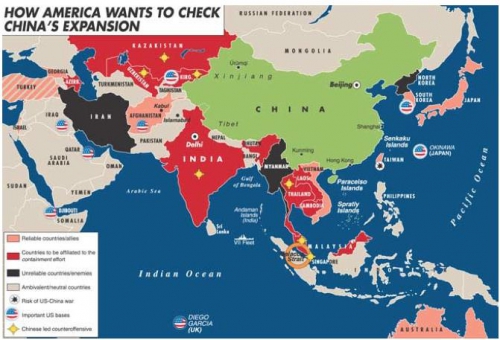
Is China The World’s New Industrial Super-Power? Obama’s “Pivot to Asia” and the Military Encirclement of China
Obama’ recent visit to India netted a trove of economic, military, and nuclear power agreements with India. The visit – and the agreements - underscored the attempt by the U.S. state to utilize its ‘pivot to Asia’ to create military and economic alliances with other Asian nations in order to encircle and isolate China.
The military wing of the ‘Asian Pivot’ is called ‘Air-Sea Battle Plan’. It involves progressively moving up to 60% of U.S. military forces into the Asian area, alongside the placement of new and advanced military equipment and new military bases and alliances with countries like the Philippines, South Korea, and Japan.
The economic wing of the pivot is the Trans-Pacific Partnership (TPP). It’s a proposed regional regulatory and investment treaty which would exclude and which currently involves negotiations between Australia, Brunei, Canada, Chile, Japan, Malaysia, Mexico, New Zealand, Peru, Singapore, the United States, and Vietnam.
This military and economic encirclement strategy confronts, however, a very large obstacle. The U.S. state may for now remain the worlds sole military super-power, based on its enormous expenditures for military, security, and online monitoring of the worlds’ people. But China has emerged in the past seven years as the worlds’ leading industrial super-power. In a shift – unprecedented historically for its speed – China has ,moved at warp speed in the past seven years to replace the U.S. as the world’s largest industrial producer. As recently as 2007, China produced a mere 62% of U.S. industrial output. But by 2011, China’s output was 120% of U.S. output, and the gap continues to grow. This displacement of the U.S. by China is the fastest shift in the balance of world industrial output in recorded economic history.
In the same period in which Chinas’ industrial production essentially doubled, US industrial output shrank by one percent,, EU industrial output declined by nine percent and Japans output shriveled by seventeen percent..
This historic shift of industrial power to China has immense consequences. To begin with, we need to recognize that real wealth is not money, stocks, bonds, or the manipulation of exotic financial instruments such as derivatives as found on Wall Street. Real wealth is the result of ability to produce goods and services which have value for human beings.
In China the hundreds of thousands of industrial workers churning out products in just one province – Guangdong – outnumber the entire industrial workforce of the U.S. An ever-increasing proportion of the worlds manufactured goods are produced: each year in China: hundreds of millions of socks to cover the worlds feet; the majority of clothing worn in the U.S. while most-often bearing U.S. brands, is China-made; computers and mobile phones such as the Apple products are primarily produced in China, as are the notebook computers sold worldwide by Chinese computer company Lenovo. The largest annual production of Chinese state-owned, joint state-private, and solely private companies. And the largest annual production of cars in any country in the world now also takes place in China. And there are the high speed Chinese-made magnetic trains which increasingly crisis-cross the country, and which are being sold and erected in varoius other countries.
The notion that China’s rise can be ‘contained’ or encircled is dubious not only because of China’s industrial prowess, but also because of the international trade it engenders.
As the Economist magazine observed: “China’s international trade in goods did indeed lead the world in 2013. Its combined imports and exports amounted to almost $4.2 trillion, exceeding America’s for the first time.” In fairness, it should be added that when international trade in services is added to trade in manufactured goods, the U.S. was still ahead. U.S. industry also retains the lead in hi-tech production methods, though that lead is being narrowed.
China’s trade relationships with other Asian nations – nations the U.S. stare is attempting to woo – constitutes a particular barrier to isolating China. The China–ASEAN Free Trade Area is a free trade area among the ten member states of the Association of Southeast Asian Nations (ASEAN) and the People’s Republic of China. Implemented in 2010, the China-Asian free trade zone reduced tarrifs or import duties on 90% of goods to zero.
Prospective participants in the U.S.-sponsored TPP are still engaged in complex negotiations. Even if successful TPP will be primarily a regulatory framework and not an actual free trade zone. By contrast, China-Asian is already the largest free trade area in terms of population, and third largest in nominal GDP, in the world. Besides China, it includes Vietnam, Thailand,, Laos, Cambodia Myanmar, Philippines, Brunei, Indonesia.and Singapore.
Chinese trade with the other member nations is growing at a healthy 10% per year; and currently stands at about 500 billion (U.S.) per year. China is furthering economic integration with its neighbors by providing financial and technical support for construction of railways linking Chinese cities with key points in neighboring countries like Vietnam and Thailand.
As the worlds’ new industrial super-power, trying to encircle or catch China is at best an arduous task. “The train.” one might say, “has already left the station.”
00:05 Publié dans Actualité, Eurasisme, Géopolitique | Lien permanent | Commentaires (0) | Tags : eurasie, asie, affaires asiatiques, états-unis, chine, encerclement de la chine, politique internationale, géopolitique, géostratégie, stratégie |  |
|  del.icio.us |
del.icio.us |  |
|  Digg |
Digg | ![]() Facebook
Facebook
The BRICS Plus Germany
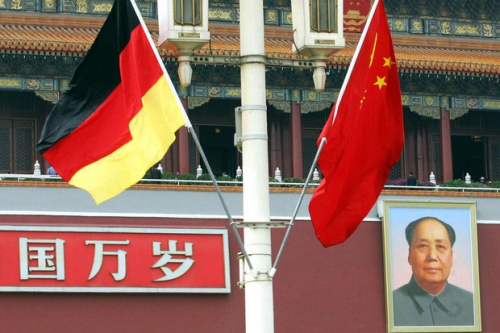
The BRICS Plus Germany
Winston Churchill once said, “I feel lonely without a war.” He also badly missed the loss of empire. Churchill’s successor – the ‘Empire of Chaos’ – now faces the same quandary. Some wars – as in Ukraine, by proxy – are not going so well.
And the loss of empire increasingly manifests itself in myriad moves by selected players aiming towards a multipolar world.
So no wonder US ‘Think Tankland’ is going bonkers, releasing wacky CIA-tinted “forecasts” where Russia is bound to disintegrate, and China is turning into a communist dictatorship. So much (imperial) wishful thinking, so little time to prolong hegemony.
The acronym that all these “forecasts” dare not reveal is BRICS (Brazil, Russia, India, China, and South Africa). BRICS is worse than the plague as far as the ‘Masters of the Universe’ that really control the current – rigged – world system are concerned. True, the BRICS are facing multiple problems. Brazil at the moment is totally paralyzed; a long, complex, self-defeating process, now coupled with intimations of regime change by local ‘Empire of Chaos’ minions. It will take time, but Brazil will rebound.
That leaves the “RIC” – Russia, India and China – in BRICS as the key drivers of change. For all their interlocking discrepancies, they all agree they don’t need to challenge the hegemon directly while aiming for a new multipolar order.
The BRICS New Development Bank (NDB) – a key alternative to the IMF enabling developing nations to get rid of the US dollar as a reserve currency – will be operative by the end of this year. The NDB will finance infrastructure and sustainable development projects not only in the BRICS nations but other developing nations. Forget about the Western-controlled World Bank, whose capital and lending capacity are never increased by the so-called Western “powers.” The NDB will be an open institution. BRICS nations will keep 55 percent of the voting power, and outside their domain no country will be allowed more than 7 percent of votes. But crucially, developing nations may also become partners and receive loans.
Damn those communists
A tripartite entente cordiale is also in the making. Indian Prime Minister Narendra Modi will be in China next May – and ‘Chindia’ will certainly engage in a breakthrough concerning their bitter territorial disputes. As much as Delhi has a lot to benefit from China’s massive capital investment and exports, Beijing wants to profit from India’s vast market and technology savvy. In parallel, Beijing has already volunteered economic help to Russia – if Moscow asks for it – on top of their evolving strategic partnership.
The US “pivoting to Asia” – launched at the Pentagon – is all dressed up with no place to go. Bullying Southeast Asia, South Asia and, for that matter, East Asia as a whole into becoming mere ‘Empire of Chaos’ vassals – and on top of it confronting China – was always a non-starter. Not to mention believing in the fairy tale of a remilitarized Japan able to “contain” China.
Isolating the “communist dictatorship” won’t fly. Just watch, for instance, the imminent high-speed rail link between Kunming, in Yunnan province, and Singapore, traversing a key chunk of a Southeast Asia which for Washington would never qualify to be more than a bunch of client states. The emerging 21st century Asia is all about interconnection; and the inexorable sun in this galaxy is China.
As China has embarked in an extremely complex tweaking of its economic development model, as I outlined here, China’s monopoly of low-end manufacturing – its previous industrial base – is migrating across the developing world, especially around the Indian Ocean basin. Good news for the Global South – and that includes everyone from African nations such as Kenya and Tanzania to parts of Southeast Asia and Latin America.
Of course the ‘Empire of Chaos’, business-wise, won’t be thrown out of Asia. But its days as an Asian hegemon, or a geopolitical Mob offering “protection”, are over.
The Chinese remix of Go West, Young Man – in fact go everywhere – started as early as 1999. Of the top 10 biggest container ports in the world, no less than 7 are in China (the others are Singapore, Rotterdam, and Pusan in South Korea). As far as the 12th Chinese 5-year plan – whose last year is 2015 – is concerned, most of the goals of the seven technology areas China wanted to be in the leading positions have been achieved, and in some cases even superseded.
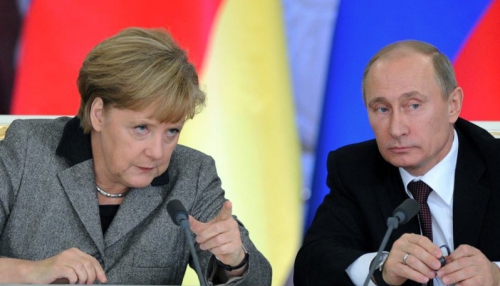
The Bank of China will increasingly let the yuan move more freely against the US dollar. It will be dumping a lot of US dollars every once in a while. The 20-year old US dollar peg will gradually fade. The biggest trading nation on the planet, and the second largest economy simply cannot be anchored to a single currency. And Beijing knows very well how a dollar peg magnifies any external shocks to the Chinese economy.
Sykes-Picot is us
A parallel process in Southwest Asia will also be developing; the dismantling of the nation-state in the Middle East – as in remixing the Sykes-Picot agreement of a hundred years ago. What a stark contrast to the return of the nation-state in Europe.
There have been rumblings that the remixed Sykes is Obama and the remixed Picot is Putin. Not really. It’s the ‘Empire of Chaos’ that is actually acting as the new Sykes-Picot, directly and indirectly reconfiguring the “Greater Middle East.” Former NATO capo Gen. Wesley Clark has recently “revealed” what everyone already knew; the ISIS/ISIL/Daesh fake Caliphate is financed by “close allies of the United States,” as in Saudi Arabia, Qatar, Turkey and Israel. Compare that with Israeli Defense Minister Moshe Yaalon admitting that ISIS “does not represent a threat to Israeli interests.” Daesh does the unraveling of Sykes-Picot for the US.
The ‘Empire of Chaos’ actively sought the disintegration of Iraq, Syria and especially Libya. And now, leading the House of Saud, “our” bastard in charge King Salman is none other than the former, choice jihad recruiter for Abdul Rasul Sayyaf, the Afghan Salafist who was the brains behind both Osama bin Laden and alleged 9/11 mastermind Khalid Sheikh Mohammad.
This is classic ‘Empire of Chaos’ in motion (exceptionalists don’t do nation building, just nation splintering). And there will be plenty of nasty, nation-shattering sequels, from the Central Asian stans to Xinjiang in China, not to mention festering, Ukraine, a.k.a Nulandistan.
Parts of Af-Pak could well turn into a branch of ISIS/ISIL/Daesh right on the borders of Russia, India, China, and Iran. From an ‘Empire of Chaos’ perspective, this potential bloodbath in the “Eurasian Balkans” – to quote eminent Russophobe Dr. Zbig “Grand Chessboard” Brzezinski – is the famous “offer you can’t refuse.”
Russia and China, meanwhile, will keep betting on Eurasian integration; strengthening the Shanghai Cooperation Organization (SCO) and their own internal coordination inside the BRICS; and using plenty of intel resources to go after The Caliph’s goons.
And as much as the Obama administration may be desperate for a final nuclear deal with Iran, Russia and China got to Tehran first. China’s Foreign Minister Wang Yi was in Tehran two weeks ago; stressing Iran is one of China’s “foreign policy priorities” and of great “strategic importance.” Sooner rather than later Iran will be a member of the SCO. China already does plenty of roaring trade with Iran, and so does Russia, selling weapons and building nuclear plants.
Berlin-Moscow-Beijing?
And then there’s the German question.
Germany now exports 50 percent of its GDP. It used to be only 24 percent in 1990. For the past 10 years, half of German growth depended on exports. Translation: this is a giant economy that badly needs global markets to keep expanding. An ailing EU, by definition, does not fit the bill.
German exports are changing their recipient address. Only 40 percent – and going down – now goes to the EU; the real growth is in Asia. So Germany, in practice, is moving away from the eurozone. That does not entail Germany breaking up the euro; that would be interpreted as a nasty betrayal of the much-lauded “European project.”
What the trade picture unveils is the reason for Germany’s hardball with Greece: either you surrender, completely, or you leave the euro. What Germany wants is to keep a partnership with France and dominate Eastern Europe as an economic satellite, relying on Poland. So expect Greece, Spain, Portugal and Italy to face a German wall of intransigence. So much for European “integration,” it works as long as Germany dictates all the rules.
The spanner in the works is that the double fiasco Greece + Ukraine has been exposing. Berlin as an extremely flawed European hegemon – and that’s quite an understatement. Berlin suddenly woke up to the real, nightmarish possibility of a full blown, American-instigated war in Europe’s eastern borderlands against Russia. No wonder Angela Merkel had to fly to Moscow in a hurry.
Moscow – diplomatically – was the winner. And Russia won again when Turkey – fed up with trying to join the EU and being constantly blocked by, who else, Germany and France – decided to pivot to Eurasia for good, ignoring NATO and amplifying relations with both Russia and China.
That happened in the framework of a major ‘Pipelineistan’ game-changer. After Moscow cleverly negotiated the realignment of South Stream towards Turk Stream, right up to the Greek border, Putin and Greek Prime Minister Tsipras also agreed to a pipeline extension from the Turkish border across Greece to southern Europe. So Gazprom will be firmly implanted not only in Turkey but also Greece, which in itself will become mightily strategic in European ‘Pipelineistan’.
So Germany, sooner or later, must answer a categorical imperative – how to keep running massive trade surpluses while dumping their euro trade partners. The only possible answer is more trade with Russia, China and East Asia. It will take quite a while, and there will be many bumps on the road, but a Berlin-Moscow-Beijing trade/commercial axis – or the “RC” in BRICS meet Germany – is all but inevitable.
And no, you won’t read that in any wacky US ‘Think Tankland’ “forecast.”
Pepe Escobar is the author of Globalistan: How the Globalized World is Dissolving into Liquid War (Nimble Books, 2007), Red Zone Blues: a snapshot of Baghdad during the surge and Obama does Globalistan (Nimble Books, 2009). His latest book is Empire of Chaos. He may be reached at pepeasia@yahoo.com. This piece first appeared in RT.
00:05 Publié dans Actualité, Affaires européennes, Géopolitique | Lien permanent | Commentaires (0) | Tags : allemagne, brics, politique internationale, géopolitique, chine, russie, inde, europe, affaires européennes |  |
|  del.icio.us |
del.icio.us |  |
|  Digg |
Digg | ![]() Facebook
Facebook
Presseschau - März 2015 - INNENPOLITISCHES

00:05 Publié dans Actualité, Affaires européennes | Lien permanent | Commentaires (0) | Tags : medias, presse, journaux, politique internationale, allemagne, europe, affaires européennes |  |
|  del.icio.us |
del.icio.us |  |
|  Digg |
Digg | ![]() Facebook
Facebook
Yukio Mishima: the Body as Spirit

The Body As Spirit: Yukio Mishima, Author, Intellectual, And Warrior
“It is… possible for people to use the body as a metaphor for ideas,” Japanese author Yukio Mishima says in Sun and Steel.
Mishima had been a weak and sickly child, doted on by his over-protective grandmother. He wasn’t allowed to play with other boys, and grew up alienated from male culture (as well as from his mother, who was not allowed to look after him unsupervised). For him, Mishima says, “words came first of all; then… came the flesh. It was… already wasted by words.”
For the author the answer to this waste — which he must have seen also in the Japan of post-World War II, defeated by the American atomic bomb — was to take up Kendo (traditional Japanese sword fighting) and bodybuilding, and to transform his thin frame into a powerful vehicle that could compete with his intellect.
The competition was partly one for attention, and partly one for a Way of being. Like aesthetes in the West, flamboyance and sincerity were not alien to each other, but one and the same. Controversially, Mishima formed his own private army, of about 100 members: the Tatenokai or “Shield Society.” He wanted, he said, to create a society for students who couldn’t, because of ideological reasons, join the Marxists on campus — Marxism was all the rage at the time.
One of the issues that divided the author and the Marxists (whom Mishima respected) was devotion to the emperor. Mishima never said it, but another — and perhaps an even more important area — was the body. The Tatenokai, and Mishima’s own “Way” of being was increasingly to the physical. In a flash of insight, Mishima
understood all kinds of things hitherto unclear to me. The exercise of the muscles elucidated the mysteries that words had made. It was similar to the process of acquiring erotic knowledge. Little by little I began to understand the feeling behind existence and action.
Marxism was intellectual. Mishima was increasingly concerned with the physical, precisely as an expression of ideas rooted in a kind of primordial drama. The flash of insight had come as the author considered the nature of tragedy.
Tragedy, says Mishima, “is born when the perfectly average sensibility momentarily takes unto itself a privileged nobility…”
It follows that he who dabbles in words cannot participate in it. It is necessary, moreover, that the “privileged nobility” find its basis strictly in a kind of physical courage… Tragedy calls for an anti-tragic vitality and ignorance, and above all a certain ‘inappropriateness.’
By “ignorance,” of course, Mishima does not mean stupidity, vulgarity, or uncouthness (Mishima was very much concerned with elegance, though not as we might understand it today), but, rather, a move away from the intellect toward instinct.
Inoffensive in the West, “inappropriateness” was perhaps a more shocking idea in Japan of Mishima’s era (and even today), where rules of social etiquette are strict and complex, and understanding ones place in the order of society comes as second nature. But, the tragic hero must, of course, go against the convention of his own time. He is the one that steps forward, taking on the challenge to save society from some existential threat, while everyone else goes about their more mundane business.
It is odd, then, that Mishima suggests that the physical body “is foreign to the spirit,” being closer to ideas. Nevertheless, in criticizing those who allow their bodies to become ugly, he suggests that the body can be a vehicle for the spirit. A bulging belly is a “sign of spiritual sloth”, for example. This and other unattractive traits, says Mishima, is “as though the owner were exposing his spiritual pudenda on the outside of his body.”
The author equates such physical ugliness with “individuality.” “If,” says Mishima cryptically, “the body could achieve perfect, non-individual harmony, then it would be possible to shut individuality up for ever in close confinement.” But the idea of “perfect, non-individual harmony” seems to be key to Mishima’s growing interest in the physical. He could escape from the world of the internally and externally ugly through perfecting the body and making that his guiding spirit.
Angel Millar is an author, blogger, and the editor of People of Shambhala.
00:05 Publié dans Littérature | Lien permanent | Commentaires (0) | Tags : yukio mishima, mishima, japon, lettres, lettres japonaises, littérature, littérature japonaise |  |
|  del.icio.us |
del.icio.us |  |
|  Digg |
Digg | ![]() Facebook
Facebook
Ernst Jünger, il soldato che discuteva di mitragliatrici con Heidegger
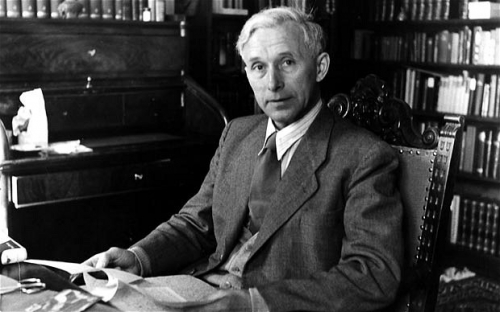
Ernst Jünger, il soldato che discuteva di mitragliatrici con Heidegger
Dalla sua avventurosa vita – quasi come ricordi del ragazzino di famiglia scappato di casa per arruolarsi nella Legione Straniera – da lì, sono riemerse le tracce di ferite. Nelle screpolature della sua pelle di vecchissimo, come tracciati di radici profonde, per la marchiatura del tempo, sono sbucati dal buio dei ricordi i segni cavallereschi, le tacche sulla carne. Nessuno per esempio aveva notato sull’avambraccio un segno secco. Forse occultato dalla rigenerazione della vita quotidiana, ieri, la morte glielo ha ripescato: disteso lungo il suo percorso raggrinzito di corpo morto. Dei suoi capelli bagnati nell’acqua gelida del fiume, bianchissimi fili, la rigidità cadaverica ha catturato l’impercettibile alito, un elmo che è quasi un’aureola. Una foto in bianco e nero restituisce il taglio all’altezza delle orecchie, a nuca nuda, in parallelo con gli alettoni aerodinamici del cappottone d’ordinanza. Le linee telefoniche raccontano già della “mobilitazione totale“ del governo, dei potentissimi professori, degli “amici francesi“, che sul grande morto – innamorato come tutti i morti del ricordo di tutto ciò che è vita – stanno “approntando il memoriale“. Tedesco e “parigino“ a un tempo, della sua avventurosa vita, per tutti i centodue anni portati in faccia al mondo per lui sempre più estraneo, Ernst Jünger porterà sulla bara il fasto di un’esistenza eccezionale, dentro la bara invece, trascinerà “l’addio al mondo“. Era anche un dandy: “La volontà regna sul mondo diventato materiale dell’oggettivazione incondizionata”. È stato “sublime” (glielo diceva un altro dandy). Disse, un giorno, a fondamento del suo destino: “Meglio un delinquente che un borghese”. Sublime bacchettatore di Hitler, che pure era stato suo sodale segreto nella “società di Thule”, schizzinoso rispetto alla pietas del demos, al fondatore del Terzo Reich, rinfacciava sempre l’eccessivo democraticismo, l’insopportabile volgarità plebea delle “camicie brune”. Qualcuno commissionò l’eliminazione di Jünger, Hitler che candidamente lo riconosceva “come un superiore in gradi”, un “vero capo”, lo salvò dai sicari.
Nella sua essenza di testimone, nel suo essere stato passeggero dei battelli a vapore e del Concorde, nel suo essere stato tutto quel che Ernst Jünger è stato, hippy e notabile prussiano, entomologo e romanziere, arrivando adesso all’Oriente Eterno, chiuderà la sua estrema scommessa. Al cospetto dell’Onnipotente, certamente, da algido chirurgo del Nulla qual è, l’orologiaio del Nichilismo sta portando sulle sue spalle di grande morto, l’immagine a lui più profondamente vera, la sua forma, e dunque la divisa. Dell’habitus militare, Jünger ha offerto l’esempio assoluto. Scrittore, infaticabile diarista, interlocutore e protagonista in quell’officina di vampe che fu la Rivoluzione Conservatrice, Jünger non chiude solo un capitolo nella storia della letteratura, ma brucia con la sua morte l’ultimo modo possibile di essere “uomo d’arme”. Arrivando davanti a Dio, infatti, davanti al Dio lungamente cercato nelle sua passeggiate quotidiane nel piccolo cimitero del suo villaggio, la sua anima si specchia levigata nella ruvida stoffa grigioverde del soldato. È morto il soldato dunque, l’ultimo vero soldato planetario, erede di Ludovico Ariosto e di Ercole Saviniano Cirano de Bergerac. Innamorato del sogno cavalleresco, ad Alberto Moravia, in un’intervista-dialogo confidò: “Nella guerra nucleare i due giocatori faranno saltare in aria la scacchiera”, e non si capì bene se il cruccio nucleare fosse, per il vecchio Jünger, più un fastidioso ostacolo per la guerra o per la pace. Ritenuto a torto purificato nel dopoguerra, ma forse fortunatamente non troppo purificato, nelle lunghe passeggiate con Martin Heidegger e Carl Schmitt, dopo i primi quindici minuti di conversazione metafisica, arrivati a un altopiano, si lasciavano prendere la mano da altre curiosità, tipo: “Secondo voi, una mitragliatrice collocata qui, quale inclinazione di tiro potrebbe avere?”. Combattente volontario delle due guerre mondiali, di due sconfitte, della prima ne ricordava “di Londra, Parigi e Mosca, lo straordinario entusiasmo della gioventù, l’ebbrezza”, della seconda intuì da subito l’ambiguità: “O ci sarà una rivoluzione, o sarà una lunghissima guerra di trincea, come nel 1914-1918”. Nato a Heidelberg nel 1895, Ernst Jünger è stato decorato due volte con la Croce di Ferro, la più alta onorificenza a cui ogni galantuomo belligerante avrebbe potuto aspirare. La prima l’ebbe dalle mani dell’Imperatore, la seconda, invece, l’ha ricevuta dal suo maldestro allievo, per aver salvato dei dissennati che si erano spinti troppo avanti nella trincea nemica per scattare delle fotografie. Disse: “Fui comunque divertito dall’idea di ricevere la Croce di Ferro per la seconda volta”. Era anche un dandy.
Pietrangelo Buttafuoco
Il 17 febbraio di 17 anni fa moriva Ernst Jünger.
00:05 Publié dans Littérature, Philosophie, Révolution conservatrice | Lien permanent | Commentaires (0) | Tags : ernst jünger, martin heidegger, révolution conservatrice, allemagne, philosophie, littérature, littérature allemande, lettres, lettres allemandes |  |
|  del.icio.us |
del.icio.us |  |
|  Digg |
Digg | ![]() Facebook
Facebook
Gibt es einen Linksextremismus der Mitte?
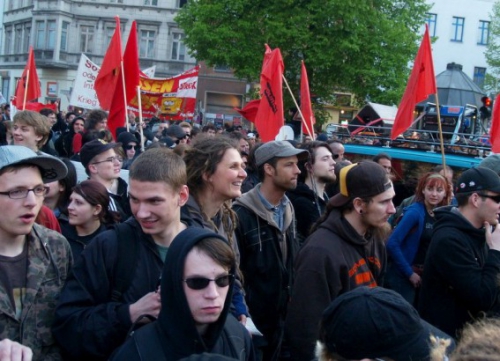
Gibt es einen Linksextremismus der Mitte?
Martin Lichtmesz
Ex: http://www.sezession.de
 Die Publikation der Studie [2] des an der FU Berlin tätigen Politikwissenschaftlers Klaus Schroeder (Photo) über die „demokratiegefährdenden Potenziale des Linksextremismus“ hat mich ebenso positiv überrascht wie ihre bereitwillige Rezeption in den Medien.
Die Publikation der Studie [2] des an der FU Berlin tätigen Politikwissenschaftlers Klaus Schroeder (Photo) über die „demokratiegefährdenden Potenziale des Linksextremismus“ hat mich ebenso positiv überrascht wie ihre bereitwillige Rezeption in den Medien.
Schroeder stellt darin das in den letzten Jahren insbesondere von der Friedrich-Ebert-Stiftung verbreitete Bild [3]vom angeblich rechtsdrehenden „Extremismus der Mitte“ mehr oder weniger auf den Kopf – und damit die Wirklichkeit auf die Füße.
Die Junge Freiheit [4] berichtete:
Die deutsche Gesellschaft hat sich nach Ansicht des Politikwissenschaftlers Klaus Schroeder nach links verschoben. „Generell ist die Gesellschaft nach links gerückt und die Parteien auch“, sagte Schroeder im Interview mit Zeit Online. Allerdings nicht so weit, daß man von „linksradikal oder linksextrem“ sprechen könne.
Es gebe einen gewissen Zeitgeist, der mit Willy Brandt schon einmal nach links gerückt sei und mit Helmut Kohl dann eher nach rechts. „Und jetzt mit Merkel eben deutlich nach links. Die Leute denken dann zwar links, wählen aber trotzdem Merkel“, erläuterte der Politikwissenschaftler.
Zu dem Ergebnis kommt Schroeder aufgrund der Ergebnisse seiner jüngsten Untersuchung „Gegen Staat und Kapital – für die Revolution“. Demnach sind linksextreme Ansichten in der Gesellschaft weiter verbreitet, als bislang angenommen. So teile etwa jeder sechste Deutsche linksradikale oder linksextreme Positionen, jeder fünfte plädiere sogar für eine Revolution.
Das „linksextremistische Personenpotential“ in der Bevölkerung liegt laut der Studie bei 17 Prozent und ist in Mittedeutschland mit 28 Prozent wesentlich stärker verbreitet als im Westen (14 Prozent). Ein geschlossenes linksextremes Welt- und Gesellschaftsbild wiesen deutschlandweit etwa vier Prozent der für die Untersuchung Befragten auf.
Die Ergebnisse der Studie selbst sind für kritische Beobachter der buntesdeutschen Republik freilich alles andere als überraschend. Frank Böckelmann [5] brachte die Lage in seinem Buch „Jargon der Weltoffenheit“ [6] mit aphoristischer Verknappung auf den Punkt:
Wer sich als „links“ tauft, kündigt an, noch hartnäckiger fordern zu wollen, was alle anderen ebenfalls fordern.
Rufen wir uns den Hintergrund des Schlagwortes vom „Extremismus der Mitte“ noch einmal ins Gedächtnis. Manfred Kleine-Hartlage definiert ihn in seinem grandiosen neuen Buch „Die Sprache der BRD“ [7] folgendermaßen:
Die Phrase vom »Extremismus der Mitte« bzw. vom Rechtsextremismus, der »in der Mitte der Gesellschaft« angekommen sei, spiegelt, wenn auch in demagogischer Verzerrung, den objektiven Sachverhalt wieder, daß die gesellschaftlichen Machteliten und die ihnen zuarbeitenden linken Ideologen die Mehrheit des Volkes gegen sich haben. Dies nicht etwa deshalb, weil dieses Volk nach rechts gewandert wäre (wie sie glauben machen möchten), sondern weil sie selbst immer weiter nach links gerückt sind, Ideologien vertreten, die noch vor dreißig Jahren als linksradikale Spinnerei galten, jede Bindung ans Volk verloren haben und immer offener eine von utopistischen Wahnideen befeuerte Destruktionspolitik betreiben, die darauf abzielt, nicht weniger den Nationalstaat, die Völker, die Familie und die Religion aus der Welt zu schaffen, und da eine solche Politik mit verfassungskonformen Mitteln nicht durchsetzbar und mit einer demokratischen Verfassung nicht vereinbar ist, müssen am Ende auch die Meinungsfreiheit, die Rechtsstaatlichkeit und die Demokratie dran glauben.
Wir haben es mit der Herrschaft von Menschen zu tun, die das Ziel der vollständigen Umwertung aller Werte und der Umwälzung der Grundlagen von Staat und Gesellschaft verfolgen. Da viele dieser Leute für sich in Anspruch nehmen, die politische Mitte zu verkörpern, gewinnt das Schlagwort vom »Extremismus der Mitte« einen von seinen Erfindern durchaus nicht intendierten ironischen Doppelsinn.
Perspektivisch gesehen sind die diametralen Bewertungen der „Mitte“ durch die Friedrich-Ebert-Stiftung und Klaus Schroeders also durchaus kongruent. Weitgehend handelt es sich hier um Definitionsfragen. Daß die Linke in hohem Maße die „kulturelle Hegemonie“ innehat, zeigt sich schon allein daran, daß der Begriff „links“ für die Mehrheit der Gesellschaft per se positiv, der Begriff „rechts“ per se negativ besetzt ist.
Diese Vorstellung hat sich inzwischen subkutan derart flächendeckend durchgesetzt, daß sie kaum mehr als ein Konstrukt mit bestimmten Prämissen wahrgenommen wird. Ein Beispiel wäre etwa die Titelseite des aktuellen Profils [8](9/2015), auf der zu lesen ist:
Tsipras, Iglesias, Faymann: Ehrlich links oder verlogen populistisch?
Dies impliziert wie selbstverständlich einen Gegensatz zwischen „ehrlich links“ einerseits und „verlogen“, „populistisch“ oder „verlogen populistisch“ andererseits. Umgekehrt würde keine Zeitung schreiben: „Farage, Gauland, Le Pen, Strache: Ehrlich rechts oder verlogen populistisch?“, weil ja „rechts“ zumeist ohnehin mit „verlogen“, „populistisch“ und Schlimmerem gleichgesetzt wird.
Begriffe, die auf der Linken gemünzt und geprägt worden sind, bestimmen heute die politischen Diskurse, derart, daß selbst Widerspruch gegen linke Politik kaum außerhalb des gesetzten Begriffrahmens formuliert werden kann. Also gibt es auch hier einen klaren Feldvorteil der Linken.

Vermutlich wäre es ein leichtes, bei vielen Befragten, deren Antworten andernorts als Beispiele für eine Rechtsverschiebung der Mitte gewertet werden, ebensoviele, wenn nicht mehr, linke Vorstellungen und Überzeugungen vorzufinden. Ich würde sogar soweit gehen zu sagen, daß alle Welt heute mehr oder weniger zu einem gewissen Grade „links“ ist, sogar diejenigen, die sich für „rechts“ oder „konservativ“ halten.
Die Effektivität der einschlägigen Schlagworte, selbst der dümmsten und hohlsten, verblüfft mich immer wieder. Sie funktionieren inzwischen wie Knöpfe auf einem Automaten, ohne Verzögerung, Reflektion, unter Ausschluß jeglicher Rationalität. Wann auch immer jemand, sei es auch nur andeutungsweise oder moderat-relativierend, sei es polemisch oder argumentativ gut begründet, es wagt, seine Stimme gegen den einschläfernden Sound des gängigen Jargons zu erheben, kann er mit mathematischer Zuverlässigkeit mit Horden von Widerspruchsrobotern rechnen, die sich ihm mit dem Slogan „XY ist bunt! Wir leben Vielfalt!“ entgegenstellen (ein aktuelles Beispiel siehe hier). [9]
Auch an dieser Stelle kann ich es mir nicht verbeißen, Kleine-Hartlage ausgiebig zu zitieren:
Kaum jemand hätte sich wohl vor zwanzig Jahren vorstellen können, welche Karriere einmal das Wort »bunt« machen würde: Wer in der meistbenutzte Suchmaschine nach »bunt« sucht, stößt nicht etwa auf die Beschreibung von Kindergeburtstagsfeiern, sondern überwiegend auf Webseiten, die einen politischen Anspruch erheben, dabei aber reichlich stereotyp (in jedem Fall aber alles andere als bunt) daherkommen: unter anderem »München ist bunt«, »Weiden ist bunt«, »Bad Nenndorf ist bunt«, »Gräfenberg ist bunt«, »Vorpommern ist bunt« – und damit sich auch ja niemand falsche Vorstellungen macht, was unter der erwünschten »Buntheit« zu verstehen ist, folgen Vokabeln, von denen viele in diesem Wörterbuch [7] vertreten sind: »Weltoffen, demokratisch, bunt«, »Gesicht zeigen«, »Bündnis gegen Rechtsextremismus«, »Gräfenberger Menschenrechts- und Demokratieerklärung« (ein bißchen Größenwahn darf auch dabei sein). Den Initiatoren scheint nicht aufzufallen oder es scheint sie nicht zu interessieren, daß ein Land, in dem der Wille zur »Buntheit« den zum Überleben verdrängt,
nicht überleben wird… (…)
Das Schlagwort ist wohl auch deshalb so wirkmächtig, weil es auf rationaler Ebene kaum satisfaktionsfähig ist. Mit Gehirnen, die von infantilen Affekten betäubt sind, läßt sich nicht ernsthaft debattieren. Daher ist Kleine-Hartlages Schlußfolgerung hart, aber ohne Zweifel zutreffend:
Ein Staat, in dem bis hin zum Bundespräsidenten alle vermeintlich seriösen Meinungsmultiplikatoren in stereotyper Weise eine solch kindische Kitschsprache sprechen, ist zum Tode verurteilt. [11]
Es gibt eine Vielzahl von Begriffen linker Provenienz, natürlich auch anspruchsvollere, die ähnlich wirken, und die ebensowenig hinterfragt werden. Böckelmann [6] nennt unter anderem: „Weltoffenheit“, „Emanzipation“, „Selbstbestimmung“, „Gleichstellung“, „Toleranz“ und „Vielfalt“.
Andere Schlagworte werden mit bestimmten Deutungen oder Wertungen belegt, die keineswegs selbstverständlich sind. „Iuvenal“, einer der Stammautoren von pi-news, versuchte unlängst, Begriffe wie“Sozialstaat“, „Europäische Einheit“ oder „Flüchtlinge“ kritisch abzuklopfen (siehe hier [12] und hier [13]).
Auch die deutsche Ausgabe der Huffington Post – ein inzwischen internationalisiertes Flaggschiff der US-amerikanischen Linksliberalen – hat Schroeders Studie emphatisch aufgegriffen [14] und nennt „fünf Gründe“, warum „die Gefahr von links genauso groß ist wie die von rechts“ und man daher über die extreme Linke nicht schweigen dürfe:
1. Die Zahl linksmotivierter Straf- und Gewalttaten steigt
Die Zahl linksextremistischer Straftaten ist laut der FU-Studie allein zwischen 2012 und 2013 um 2500 auf insgesamt 8.637 [15] gestiegen. Damit nahm auch die Zahl der linksextremistisch motivierten Gewalttaten zu – und zwar um 26,7 Prozent.
In der öffentlichen Wahrnehmung würden diese Gewalttaten quantitativ unterschätzt, da der Verfassungsschutz zwischen links und linksextrem motivierten Straf- und Gewalttaten unterscheide und links-motivierte Taten in der Statistik außen vor ließe, heißt es in der Berliner Studie.
2. Es gibt mehr linksextreme als rechtsextremistische Anhänger
Der Verfassungsschutz stuft der Studie zufolge 27.700 Menschen in Deutschland als potentiell linksextrem ein. Diese Zahl liegt weit über der Zahl der offiziell ermittelten Anhänger rechtsextremistischer Gruppierungen [16] – denen stehen 21.700 nahe. Bei einem Drittel der als linksextrem eingestuften Personen sehen die Verfassungsschützer Gewaltbereitschaft.
3. Linksextremisten stehen unter dem Schutz des gesamten linken Milieus
Die mediale Aufmerksamkeit richtet sich eher auf den rechten und islamistischen Extremismus. Linksextreme Aktivitäten rücken eher in den Hintergrund. Darüber hinaus verschwimmen die Grenzen „zwischen extremen, aber demokratischen Linken, so dass alle Linksextremisten unter dem Schutz des gesamten linken Milieus stehen“, schreiben die FU-Forscher.
4. Viele Inhalte linksextremen Denkens sind in der Mehrheitsbevölkerung angekommen
Linksextreme Einstellungen beschränken sich nicht auf die linke Szene, sondern haben zum Teil längst Eingang in die „Mehrheitsgesellschaft“ gefunden, warnen die Forscher weiter. Viele Versatzstücke linksextremen Denkens finden sich im politischen Mainstream [17], ohne dass diese gleich als linksextrem assoziiert werden, erklärt der Mitautor der Studie, Klaus Schröder, in einem Interview mit der „Zeit“.
(…)
5. Linksextremismus birgt demokratiegefährdendes PotenzialLinksextreme Gruppen und Personen propagieren offen ihr Ziel, die bürgerliche Gesellschaft und den bürgerlichen Staat zu zerschlagen und an seine Stelle eine „neue, anarchistische oder kommunistische Gesellschaftsordnung“ errichten zu wollen. Sie sind also nicht nur „antikapitalistisch, sondern auch demokratiefeindlich eingestellt“, heißt es in der FU-Studie.
Das bestätigt und wiederholt eine Kritik, die von konservativer Seite, etwa in der Jungen Freiheit, seit Jahren geäußert wird. Die Schlußfolgerung der Autorin verwischt die Spuren allerdings wieder ein wenig:
In keinem Fall ist der Rechtsextremismus zu verharmlosen, aber ebenso wenig darf hier mit zweierlei Maß gemessen werden. Linksextremismus ist genauso gefährlich wie Rechtsextremismus. Es bringt nichts, wenn man sich auf dem linken Auge blind stellt, Gewalt ist Gewalt.
Die aufgelisteten „fünf Punkte“ zeigen doch eher, daß von einer „genauso großen“ Gefahr keine Rede sein kann. Linksextreme Gruppen sind den rechtsextremen Pendants nicht nur zahlenmäßig weit überlegen – die letzteren genießen keinerlei Unterstützung durch den politisch-medialen Mainstream, der sie vielmehr als das „absolut Andere“, „Böse“ und zu Bekämpfende behandelt, während die Linksextremen allenfalls als schlimme Kinder der eigentlich „guten Sache“ gelten. „Links“ und „rechts“ werden mit krass divergierenden Maßstäben gemessen.
Wie gesagt, bin ich überrascht, derlei in der Zeit und der Huffington Post zu lesen – derart, daß ich mich unablässig frage, wo nun der Haken an der Sache ist. Bislang konnte ich ihn nicht finden.
Article printed from Sezession im Netz: http://www.sezession.de
URL to article: http://www.sezession.de/48659/gibt-es-einen-linksextremismus-der-mitte.html
URLs in this post:
[1] Image: http://www.sezession.de/48659/gibt-es-einen-linksextremismus-der-mitte.html/dein-kampf
[2] Studie: http://www.fu-berlin.de/presse/informationen/fup/2015/fup_15_044-studie-linksextremismus/index.html
[3] Friedrich-Ebert-Stiftung verbreitete Bild : http://www.fes-gegen-rechtsextremismus.de/pdf_12/mitte-im-umbruch_www.pdf
[4] Junge Freiheit: http://jungefreiheit.de/politik/deutschland/2015/politologe-deutschland-ist-nach-links-gerueckt/
[5] Frank Böckelmann: http://www.sezession.de/45316/der-jargon-der-demokratie-ein-gespraech-mit-frank-boeckelmann.html
[6] „Jargon der Weltoffenheit“: http://antaios.de/buecher-anderer-verlage/aus-dem-aktuellen-prospekt/1468/jargon-der-weltoffenheit
[7] „Die Sprache der BRD“: http://antaios.de/gesamtverzeichnis-antaios/einzeltitel/3854/die-sprache-der-brd.-131-unwoerter-und-ihre-politische-bedeutung
[8] Profils : http://www.profil.at/home/inhalt-profil
[9] l siehe hier).: http://jungefreiheit.de/debatte/streiflicht/2015/zeit-fuer-eine-reformation/
[10] Image: http://www.sezession.de/48659/gibt-es-einen-linksextremismus-der-mitte.html/roboter
[11] zum Tode verurteilt.: https://www.youtube.com/watch?v=mT-uiqM6Vqo
[12] hier: http://www.pi-news.net/2015/02/gegen-den-strich-denken/
[13] hier: http://www.pi-news.net/2015/02/gegen-den-strich-denken-teil-2/
[14] emphatisch aufgegriffen: http://www.huffingtonpost.de/2015/02/26/linksextremismus-linke-gefahr_n_6752454.html?ncid=fcbklnkdehpmg00000002
[15] ist laut der FU-Studie allein zwischen 2012 und 2013 um 2500 auf insgesamt 8.637: http://www.verfassungsschutz.de/de/arbeitsfelder/af-linksextremismus/zahlen-und-fakten-linksextremismus/zuf-li-2013-straftaten.html
[16] rechtsextremistischer Gruppierungen: http://www.verfassungsschutz.de/de/arbeitsfelder/af-rechtsextremismus/zahlen-und-fakten-rechtsextremismus/zuf-re-2013-gewalt-gesamt.html
[17] Versatzstücke linksextremen Denkens finden sich im politischen Mainstream: http://www.zeit.de/gesellschaft/zeitgeschehen/2015-02/demokratie-linksextremismus-studie-klaus-schroeder-fu-berlin-interview
00:04 Publié dans Actualité, Affaires européennes | Lien permanent | Commentaires (0) | Tags : allemagne, extrémisme, extrémisme de gauche, gauches, gauches allemandes, europe, affaires européennes, politique internationale |  |
|  del.icio.us |
del.icio.us |  |
|  Digg |
Digg | ![]() Facebook
Facebook
jeudi, 05 mars 2015
Varese e la mistica della rivoluzione

19:16 Publié dans Evénement | Lien permanent | Commentaires (0) | Tags : événement, varese, lombardie |  |
|  del.icio.us |
del.icio.us |  |
|  Digg |
Digg | ![]() Facebook
Facebook




